




















The British Parking Awards celebrate innovation and recognise achievement






















The British Parking Awards celebrate innovation and recognise achievement

The British Parking Awards 2024 are the best day in parking
The winners of the 2024 competition were revealed at the Royal Lancaster London on 13 September. Yes, it was a Friday the 13th, but the British Parking Awards 2024 proved to be lucky for some as they walked on stage to collect the coveted glass trophies! Over 650 people from across the parking sector attended the lunch to hear the winners revealed by the comedian and broadcaster Paul Sinha, ably assisted by acclaimed voiceover artist Roger Tilling.
The British Parking Awards were founded by Parking Review magazine in 2002 to honour excellence in the design, operation and management of parking. Over the past 22 years, the awards ceremony has become firmly established as the highlight of the sector’s social calendar.
You can read about all the winning entries and highlights from the ceremony in a special 40-page section in the centre of this super-size edition.
Mark Moran Editor



Some of Europe’s most progressive cities are already embracing technology to optimise their enforcement operations. By deploying ANPR scan cars to spot contraventions and equipping CEOs with Egis’ innovative Dispatch app, authorities are increasing parking compliance by rapidly and accurately deploying CEOs to contraventions the very moment they are located.
From Paris to Amsterdam , Rennes to Milton Keynes, embracing innovation has led to higher PCN issuance , more people paying for parking, higher turnover of spaces, less congestion, and smarter, more sustainable cities. 21 cities across Europe
53% increase in PCNs issued* 13.3% compliant revenue increase*

www.egis-group.com


BUDGET 2024: Chancellor Rachel Reeves sets out plans to invest in greener energy and transport infrastructure
Blue Badges, pavement parking and appeals against penalty charges were discussed at the annual Alpha Parking seminar
Causeway Technologies buys TRO and mapping specialist Buchanan Computing and Intelli-Park buys Bank Park
Over 8 million PCNs have been issued for breaches of parking, bus lane and moving traffic regulations in London
The need to provide secure parking and decent rest areas for HGV drivers was put into focus during National Lorry Week
A multi-storey car park in Newcastle under Lyme could be converted into housing under bold plans from Capital&Centric
Sprinklers could have limited impact of the London Luton Airport car park blaze, says Bedfordshire Fire & Rescue Service
The latest developments in zero-emission transport







Invest, invest, invest’ was the mission that chancellor Rachel Reeves mapped out when setting out the first Budget by a Labour government since 2014. The chancellor justified the controversial rise in National Insurance Contributions (NICs) from employers as way of raising a multi-billion pound sum per year to be invested in public infrastructure. Likewise, Reeves’ intention to change fiscal rules will allow for borrowing to support the creation and rebuilding of schools and hospitals, clean energy and the building of a promised 1.5 million houses per year.
In her pursuit of growth, Reeves has promised to create a £70 billion National Wealth Fund to invest in the industries of the future such as gigafactories and green hydrogen, transform the planning system, work with ‘Metro Mayors’ on regional growth plans and creating a new industrial strategy.
Reeves commended her Budget to Parliament saying: “The choices that I have made today are the right choices for our country. To restore stability to our public finances. To protect working people. To fix our NHS. And to rebuild Britain. That doesn’t mean these choices are easy. But they are responsible.
“This is a moment of fundamental choice for Britain. I have made my choices. The responsible choices. To restore stability to our country. To protect working people. More teachers in our schools. More appointments in our NHS. More homes being built. Fixing the foundations of our economy. Investing in our future. Delivering change. Rebuilding Britain.”
EVs are crucial to decarbonising transport and will support growth and productivity across the UK. The Budget document states the transition to electric vehicles (EVs) is crucial to decarbonising transport and will support growth and productivity across the UK. There are now more than 1 million electric cars on our roads.
The chancellor reaffirmed the government's commitment to restore the 2030 phase-out of new cars and vans relying solely on an internal combustion engine and that from 2035 all new cars and vans sold in the UK will be zero emission. The government is building on this by funding commitments of more than £200m in 2025-26 to accelerate the EV chargepoint roll-out, including funding to support local authorities to install on-street chargepoints across England. The Budget document states this will build on the UK’s existing charging network, which now stands at over 70,000 public chargepoints.
There will be £2 billion to support the automotive sector in increasing production of zero-emission vehicles alongside the continuation of tax incentives to support their introduction. To help drive the transition to electric vehicles, the government is strengthening incentives to purchase EVs by widening the differentials in Vehicle Excise Duty First Year Rates between EVs and hybrids or internal combustion engine cars. The government is also maintaining EV incentives in the Company Car Tax regime and extending 100% First Year Allowances for zero-emission cars and EV chargepoints for a further year.
The government will continue to fund low company car tax rates beyond 2028 to encourage fleet take-up and EV salary sacrifice schemes. However, rates for hybrid vehicles will rise to focus support on electric vehicles. It will also provide £120m in 2025-26 to support the purchase of new electric vans via the plugin vehicle grant and to support the manufacture of wheelchair accessible EVs. However, despite calls from across the automotive sector, the Budget did not include measures to specifically tackle private buyer demand for EVs, either new or used, or to equalise VAT on public and home charging.
There will be continued support for gigafactories and automobile manufacturing in the West Midlands and North East. Gigafactories feature in the ‘Modern Industrial Strategy’, offered for consultation earlier this month and due to come into effect next spring. And £2bn has been offered to the automotive sector to build on research and development.
There was some respite for drivers of petrol and diesel vehicles as Reeves also announced a continued freeze in Fuel Duty (for the fifteenth year in succession).
Establishing Great British Energy (GBE) is a cornerstone of the Labour government’s clean energy policy. Reeves said GBE will receive £100m capital funding for clean energy project development and £25m to establish GBE itself, headquartered in Aberdeen.
There will be £1 billion of funding for local energy schemes to help decarbonise the public estate through the Public Sector Decarbonisation Scheme, and there is £3.4 billion allocated towards the Warm Home Plan for heat decarbonisation and household energy efficiency over the next three years.
Reeves announced there would be 11 new green hydrogen projects across England, Scotland and Wales. Ahead of the Budget, the government announced £22 billion funding for carbon capture and storage (CCS) projects.
The transport secretary plans for reform and the transition to Great British Railways will be supported, as will changes to fares, services and workforce practices. There was £650m for local transport funding to improve connections across the country and £1.3bn for city transport funding, including the West Yorkshire mass transit scheme. An extra £200m will be given to Metro Mayors for local transport in 2025/26, bringing City Region Sustainable Transport Settlements to over £1.3 billion.
It was also confirmed that the HS2 rail line will come, as originally planned, into London Euston rather than terminating at Old Oak Common.
The £2 cap on bus fares is to rise to £3 as part of an over £1bn package to support bus services across the country.
Tackling potholes also made a traditional appearance in the Budget, with Reeves announcing £500m in the roads maintenance budget for next year. Reeves said this an almost 50% increase on the commitment made by the previous government for the current financial year, and brings the total amount dedicated to fixing the roads in England over the next year to nearly £1.6 billion.
To encourage active travel, £100m has been set aside for cycling and walking infrastructure.
Local government will be provided with £1.3bn grant funding for services. The era of devolution sees first integrated funding settlements for Greater Manchester and the West Midlands as well as city and growth deals for parts of Northern Ireland and Scotland.
The City Region Sustainable Transport Settlements (CRSTS) are supported with a £200m increase that brings local transport spending for Metro Mayors to £1.3 billion for projects such as West Yorkshire mass transit system and Sheffield Supertram.
Beyond the city regions £650m will go to transport connections to improve towns, villages and rural areas.
In a bid to speed up the planning process, Reeves announced that there would be funding for hundreds of new planning officers across the country.
The government has pledged to build 1.5 million homes a year. Reeves promised £5 billion for housing overall with an additional £3.1 billion for the Affordable Homes Programme, £3 billion of support in guarantees to boost the supply of homes and support smaller housebuilders, and invest ment to renovate sites across the country including in Liverpool and Cambridge.
To boost digital infrastructure in under-served areas across the UK and support growth in the digital and technology sectors, the gov ernment will invest over £500m in Project Gigabit and the Shared Rural Network next year.

Max Sugarman, chief executive, Intelligent Transport Systems UK (ITS UK): “The chancellor confirmed an extension to the freeze on fuel duty for another year, but ignored the bigger issue of how the government will offset the revenue loss from falling Fuel Duty as the UK vehicle fleet transitions to electric. As ITS UK set out in its Budget submission, the UK needs to take a long term approach, and government needs to outline plans for distance-based road pricing that incentivises the fairer and sustainable use of the transport network. ITS UK members have the expertise, skills and know how to deliver a national scheme effectively, but require the political vision and will to create a more equitable and future-ready system.
“It is positive to see increased funding for City Region Sustainable Transport Settlements, for EV charging infrastructure, rail projects and road maintenance across the UK. Transport technology has a key role to play in all these areas and in supporting a greener, more efficient and seamless transport network.”
Steve Gooding, director, RAC Foundation: “The unanswered question is what happens to motoring tax in the future. Long term, the take up of electric vehicles will erode Treasury income from fuel duty. What anyone in the market for a new car, especially one powered by batteries, wants to know is what the cost of running it will be in the years ahead.
“The chancellor also announced an additional £500m to fix potholes next year. Any money allocated to improve the shocking state of many of our local roads is welcome, but for all the talk of hundreds of millions of pounds, the country’s tens of millions of drivers will only be happy when they see an improvement on the highways they use everyday, those outside their houses. The longterm solution is a long-term funding settlement for councils so they can finally get on top of what has been a perennial problem.”
Mike Hawes, chief executive, SMMT: “The automotive industry is a growth-driving sector, fundamental to the delivery of the country’s net zero ambitions. We welcome today’s commitment of £2 billion of automotive transformation funding as part of the government’s Modern Industrial Strategy.”
Ian Johnston, CEO, Osprey Charging Network: “It’s fantastic news that the government is maintaining tax benefits for working people who lease or buy electric cars, as these are vital to incentivising more consumers to drive electric and to continue the growth of ‘private driver’ EV sales. We look forward to seeing the government maintain a strong ZEV Mandate this autumn to allow the UK to truly realise the multi-billion pound opportunity the e-mobility sector can bring to the UK.”


Simon Williams, head of policy, RAC: “It’s good to see the government firmly recognising the importance of the car to millions of households up and down the country. Eight-in-10 drivers tell us they are dependent on their vehicles for the journeys they need to make, while 70% of commuters who live in rural areas have no other feasible alternatives to get to work beyond taking the car. It’s also worth remembering that even as of today 56% of the total price of a litre of petrol is already tax in the form of Fuel Duty, and the VAT that is charged on top.”
James Court, chief executive of EVA England: “It is great to see the chancellor backing electric vehicles in her Budget, with both an extension to the company car tax and changes to VED, as well as backing British industry with £2bn for manufacturing EVs. Additional funding for chargepoint infrastructure is also good news for current and future EV drivers as the UK continues to push forward the transition to a cleaner transport system.”
Mike Pierce, executive director of systems change, Climate Group: “The chancellor’s decision to continue the Fuel Duty freeze while not reducing the VAT on EVs is a major missed opportunity to push forward the UK’s transition into a zero-emission transport future and clean air for all.

Ethos Consultants is working with local authorities across the UK on the development of transport, parking and active travel strategies, say Adam Bunce and Graeme Brown
Ethos is a new name for an established centre of expertise. In 2012 Adam Bunce had a vision to create a company providing traffic engineering, road safety, and parking services, and so he went on to launch 2020 Consultancy. Twelve years later, that business is working on a varied portfolio of projects that span multiple transport sectors, working UK-wide and with clients overseas, delivering the highest level of service and winning industry awards. It is an enviable track record and one which has led to 80% of its clients returning with further projects. The evolution of the company has seen it renamed as Ethos Consultants.
Working almost exclusively in the public sector, Ethos is helping its clients transform communities and provide a more sustainable future for villages, towns and cities. Many of its local authority clients have had to consider making fundamental changes to the way they operate their road safety, engineering and parking policies, and also consider introducing active travel policies for the good of their communities. Successfully integrating sustainability into those new policies has become a central part of what Ethos does.
Adam Bunce, Managing Director of Ethos Consultancy, takes overall responsibility for client liaison, project and programme management and operation in the UK, whilst also providing support to Graeme Brown, Ethos’s Regional Director for Scotland. Graeme is based in Aberdeen and joined the Ethos team in May 2023, coming directly from Aberdeen City Council, and with experience of other roles in local authority teams in Scotland.
Graeme says his role at Ethos is a cross between a regional director and a technical lead around parking and sustainability.
Headquartered in Portsmouth but with team members working in offices and remotely across the UK, Ethos has
grown a reputation for its high level of expertise, dedication and commitment, often meaning it goes above and beyond what is required from its client briefs.
Adam says: “We are a market leader, but as a smaller operator in the sector, Ethos can sometimes be underestimated. We face, and often win, in competitive tenders against the much larger, global multi-billion-pound companies who aren’t always able to offer the hands-on, senior team involvement that we can.
“Being smaller gives us an edge in terms of flexibility, and our willingness to invest more time in community engagement leads to more robust research outcomes for our clients. We glean greater insight which is essential ahead of undertaking any project. We take pride in our ability to be more thorough and therefore offer added value.”
In Scotland, the company’s ‘actively engaged’ approach has led to Ethos being involved in several infrastructure projects.
Graeme says: “The larger infrastructure opportunities that have been out to tender over the past couple of decades in Scotland are not currently as active as there is generally less money available for local authorities to spend. I am, however, optimistic about the progress Ethos has made and can continue to make in the coming year, and growing our Scottish portfolio is part of our plan for 2025.”
One Scottish client is Dumfries and Galloway Council, which commissioned Ethos to deliver the Annandale feasibility study and concept design to link Annan, Eastriggs, Gretna and Powfoot through connecting existing walking and cycle paths – a project that was to be funded through Sustrans’ Places for Everyone Programme.
The completed feasibility study, full business case, and concept designs were submitted to Sustrans, who approved the documentation, enabling Ethos to provide support to the council and put together a funding application to progress the project. Following a review the project has been awarded the required funding to enable progression to stages 3 and 4 of the Places for Everyone programme.
Graeme continues: “We’ve recently done a lot more with community groups in Scotland, trying to identify connections between communities, trip generators, increased safe routes to school, trips to work and integration of public transport.”

Ethos has seen the growing need for local authorities to be given guidance in order to approach their parking strategies in a new way. In the past five years many alternative uses for the kerbside have emerged and parking strategies now need to include ways to integrate active or sustainable travel within car parks. Sustainability is increasingly at the core of what Ethos does in terms of consultancy for parking.
Ethos understands that if councils are to be persuaded to give up car parks in central locations, and possibly repurpose them for development opportunities, then they will need to deliver car parks on the outskirts of towns which are effectively mini ‘park and ride’ facilities or mobility hubs.
Graeme explains: “We will tell clients not to worry about how close we are to trip generators – let’s worry instead about how close we are to the wider strategic road network, what improvements can we make to public transport or to active travel, and integrate their strategy that way. Some projects are more sustainability-oriented than others, but we try and take that approach into everything we do – it’s something that we’re all interested in and is part of our core values.”
Councils recognise this need for more sustainable solutions and appreciate how Ethos works to identify what might work best for their own communities, the parking provisions that they need and how to get them on board with the proposals.
Parking strategy has become a bigger part of what Ethos offers its local authority clients with a recent example being work commissioned by Basildon Council.
The importance of relationships
Personalising projects and building relationships are critical to the success Ethos has had to date. They take pride in delivering high service levels and maintaining a good relationship with their clients, and with those communities and stakeholders who are directly impacted by any project they are working on.
Graeme Brown said: “We get to know those communities and they get to know us which builds trust. We then try to maintain our client relationships beyond the close of a project and offer advice or act as a sounding board, always going above and beyond wherever possible.”
Ethos collaborates with other consultants and with technology providers in the parking sector should a project require them to.
Adam Bunce adds: “Our approach is to wholeheartedly buy into what’s trying to be achieved, think about how we can bring a community together, be strong on social value, for example going into schools and working with kids, or working out other ways we can reach demographics – our larger competitors don’t tend to put the same amount of time into this side of things as us.
“A focus purely on growing profit may be more of a motivation in years to come but building relationships with our clients is currently our driving force.”
With a client roster that includes NHS Western Isles, New Forest District Council, the Department of Health and other areas of central government, many boroughs and town councils, city councils, and recently adding the Isle Of Anglesey County Council in North Wales to its list, Ethos has an impressive story to tell and ambitious plans for future growth.
Basildon Council recently commissioned Ethos to produce its first parking strategy which was a borough-wide 20-year plan, covering both off-street car parks and on-street parking provision. A robust analysis of the current situation in the five town centres across the Essex borough was a vital supporting study.
A two-stage consultation process was undertaken with Stage 1 designed to capture feedback on the existing parking service, and Stage 2, carried out upon completion of the draft parking strategy, designed to capture levels of support for each of the 35 policies developed in line with eight objectives and one overarching strategy vision.
Stakeholder engagement:
• Approximately 5,000 completed surveys were conducted
• Consultation roadshow held at 10 different locations across towns and villages across the borough over a two-week period
• Five ‘hard to reach’ group events held to include elderly and disability forums – approximately 200 attendees across five events
• Three business engagement events attended by approximately 100 business representatives
• School and college visits to provide education of transport services including road safety, parking and active travel, engaging with approximately 300 pupils aged 7-18 years old
• Social media campaign produced approximately 500 interactions across Facebook, Instagram, LinkedIn and YouTube
• A consultation hub to allow stakeholder to provide feedback and comments on maps led to approximately 500 comments.
This comprehensive approach secured Ethos recognition as a finalist in this year’s British Parking Awards, and high praise from their client.
Basildon Council’s Head of Environment James Hendry said: “The thorough approach to engaging with the community was exemplary. The final report was detailed, well-structured, and provided clear recommendations that will greatly inform our strategy planning. The professionalism, responsiveness and dedication demonstrated throughout the project exceeded our expectations.”
Ethos also does a lot of work within schools on road safety education and active travel projects, as well as work around school streets and improving safety outside schools. When working on a school streets project Ethos takes it a step further so that it’s not just about feeling safe near the school, it’s about the entire journey from home to school.
They will go into schools and hold workshops, encouraging the pupils to design their own roads, giving interactive presentations, hosting quizzes, or using Minecraft or Lego to create streetscapes.
Adam Bunce says: “Even children that are relatively young, 6-8 year olds, understand the importance of feeling safe walking to school, making sure there are speed limits and controlled crossings. Getting that behaviour change as young as possible is going to contribute to future generations feeling it is a normal part of life.”
Bristol is seeking to introduce a workplace parking levy (WPL). Bristol City Council is to explore the case for imposing a surcharge on local business parking, looking at the potential benefits such as a drop in car use, a move towards sustainable modes such as walking, cycling and public transport and improved air quality.
The council’s transport and connectivity policy committee has approved the Stage One Development and Outline Business Case (OBC) at a cost of up to £1m. This will be funded by Bristol’s Clean Air Zone scheme, which would get the money back once the levy generates income. The levy would charge businesses in the city centre £20 per week per parking space, which the committee report estimates could generate £8m to £10m a year.
The levy would be lower than the cost of using a multi-storey car parks owned by Bristol City Council, with tariffs ranging from £54 to £72 per week for an annual season ticket, the committee said.
Stage Two in the process would involve public consultation, development of final business case, and formal approval. Stage Three would involve the implementation and operation of the scheme.
Any income raised by the workplace parking levy would be ringfenced for Local Transport Plan policies and objectives, including bus service improvements. The committee heard that a proposed levy would cut the amount of carbon dioxide due to the reduction in the number of cars/trips into the city centre, which would also improve air quality due to a lowering of emissions and particulates as well as a reduction in traffic noise. It would also reduce congestion and the other associated negative impacts, which damage the economy, states the report.
More sustainable transport options would become available due to the extra funds from the introduction of the levy, it adds. “This would benefit younger people who have more limited car access and lower car use but make better use of buses, trains and bicycles.
Under the WPL scheme, workplaces with parking places would face an annual charge per parking place and the employer would decide whether to pass the charge onto the employee or not.
If Bristol does go ahead with the scheme, it would become only the second UK city after Nottingham to introduce a workplace parking levy. Since it implemented a WPL in 2012, Nottingham has raised more than £100m to fund transport projects, including the tram system, renovating Nottingham Station and supporting the Linkbus network.
Bristol City Council has commissioned Nottingham to carry out a feasibility study

to advise how a scheme could be delivered and over what time frame.
Unlike Nottingham, which has an annual levy charge of £550 per workplace parking place, the committee is proposing a different approach due to Bristol’s different layout and business. “Rather than a lower city-wide charge, a higher, smaller central core area scheme is an option for Bristol,” it said.
Jason Gooding, Nottingham City Council’s head of parking services, said the WPL scheme has been an “outstanding transport policy success”, raising around £108m in new local revenue “that, in turn, has levered in £1.2bn in direct and indirect inward investment”.
This has all been spent on improving Nottingham’s transport infrastructure and other key identified transport projects, which “has helped cement Nottingham’s reputation as having one of the best transport systems outside London”, Gooding told Parking Review.
“Nottingham City Council has a well-
developed package of support measures available which is delivered by officers highly experienced in the development and successful delivery of its own WPL scheme which will assist other authorities to develop and deliver their own WPL schemes at the lowest possible costs, optimum timescales and at minimal risk to help replicate Nottingham’s success.”
Mark Frost, director of Fern Consulting, welcomed Bristol’s decision. The transport policy expert said: “There’s a long way to go still, but this is undeniably exciting stuff coming out of Bristol – could Nottingham finally get a playmate?”
Bristol’s plans, Frost suggested, are within the “wider context of using the council’s control of parking and the kerbside as a strategic transport planning tool for tackling a wide range of pressing challenges from congestion to decarbonisation”. He added: “It’s refreshing to see parking policy being recognised and used as a city-wide travel behaviour change tool.”
Drivers who own larger, heavier, and more polluting cars could end up paying more for parking in Bristol.
Although the plans are in the ‘very early stages’, there are also discussions to introduce a potential ban on pavement parking. This is something that has been introduced in parts of Scotland.
Regarding the parking fees, a Bristol City Council committee report stated: “The project will include outlining our strategy for managing on-street, off-street and resident parking scheme parking, including pricing strategy, demand management and variations on pricing categories, e.g. weight, emissions and size-based pricing.”
Following on from this, the committee decided to investigate whether it is feasible to introduce “a gradual reallocation of kerbside space to sustainable modes of transport and alternative uses, e.g. tree planting, SUDs (sustainable drainage systems), cycle hangars and seating”.
On 24 October 2024, councillors on the transport policy committee will vote on forming a task force in order to investigate potential options. This group will hold a series of meetings, with the project anticipated to take a up to a year to complete.
The public will be consulted on any suggested changes to parking regulations.

The parking industry in the UK is undergoing a revolution, and WPS is at the forefront. Say goodbye to the frustration of multiple parking app sign-ups – the National Parking Platform (NPP) streamlines payments for a seamless experience.
Are you ready to embrace the future? WPS is your trusted partner for a smooth transition. Our future-proof hardware is fully NPP compatible, ensuring a hassle-free upgrade whenever you’re ready.
Upgrade your parking experience today. Contact WPS to discuss your NPP integration.



Be.EV partners with Formula Space and Derbyshire Police
The electric vehicle charging sector is facing a crime wave, with thefts of chargepoint cables said to be on the rise. Charging theft is an issue disrupting chargepoint operators across the UK. Theft and vandalism costs the industry upwards of £500,000 based on the cost of replacement, repair and lost income.
Chargepoint network operator Be.EV has now partnered with EV charging space specialist Formula Space and Derbyshire Police to develop ways of deterring charging cable vandalism.
In response to the recent spate of electric vehicle charging cable thefts, Be.EV has launched the Charging Hub Intelligent Protection initiative, or CHIP, to deter charger vandalism.
The chargepoint operator has showcased its suite of security updates to drivers at the launch of the initiative at the 85
ONS shows nearly 130,000 cars stolen annually
The number of vehicles stolen in the UK remains at a record high level, according to new data from the Office for National Statistics (ONS). Year-on-year crime statistics show that there were 129,159 vehicles stolen between April 2023 and March 2024.
This is slightly lower when compared to the 130,119 vehicle thefts for same period in 2022-23, . Incidents of items being stolen from vehicles fell by 12% year-onyear, says the ONS.
In total, there were 193,023 crimes reported to police that involved items being taken from vehicles after they had been broken into. For the same period the year before, 218,431 people reported that something had been taken from their vehicle.
The ONS data showed that there was also a 2% rise in vehicle interference or tampering with a motor vehicle. This is where parts from the vehicle are stolen, such as catalytic converters, number plates, and vehicle badges. In 2022-23, there were 52,268 reported incidents, which increased to 53,369 this year.


Be.EV has installed a mobile CCTV system which is monitored around the clock, and a tannoy system to warn any gangs of criminals that they’re being recorded, scaring them off before they decide to destroy someone else’s property.
The system will automatically alert local police should any criminal activity occur, and the
site’s new SelectaDNA protected cables give each of them a DNA coating, meaning the police can trace their origin, associate them with a criminal and hold vandals to account. These new security features will now be a staple at future Be.EV locations.
PCSO Emma Shimwell at Derbyshire Police said: “It’s essential for all of us – chargepoint operators and law enforcement alike – to collaborate effec-
tively and implement robust security measures, just like at Be.EV’s new site protection initiative here at this Chesterfield hub. By installing systems like CCTV, cable DNA tracking, and 24/7 security monitoring, we can deter opportunistic thieves who would think twice before attempting theft or vandalism, knowing it would likely lead to criminal prosecution.”
Be.EV is calling on the industry at large to make sure that charging hubs nationwide are equipped with similar security features, to make sure criminals stop trying to destroy the UK’s network.
Adrian Fielden-Gray, chief operating officer of Be.EV, said: “Cable theft is an absolute nightmare for everyone – especially drivers. It’s completely unacceptable to find a charging cable cut when you’re looking to top up – and for what reason? There’s hardly any money to be gained from doing this it’s completely pointless and makes the experience worse for everyone.”
issues warning about fake parking fine texts
The Driver and Vehicle Standards Agency (DVSA) is warning that scammers are sending text messages about fake parking penalties.
The badly spelled texts warn people that they have a ‘parking penalty charge’, saying if they do not pay on time they might be banned from driving, have to pay more; or be taken to court.
Some texts direct drivers to a fake .GOV.UK parking fine payment page.
In reality, DVSA does not issue or deal with parking fines.
One text message reads: “Dvsa notice for you: You have a parking penalty charge due on 2024/9/30. If you do not pay your fine on time, Your car may be banned from driving, you might haeve to pay more, or you could be taken to court. Please enter your license plate in the link after reading the information, Check and pay parcking penatly charge. Thank you again for your copperation. Dvsa”
The initial text message has been followed up with scam reminders:


“DVSA Fixed Penalty Office: Today is the last day to pay your ticket due to your long term delinquency, if you do not pay your ticket on time you may be required to pay more in the future and we reserve the right to prosecute you. Please be patient and open the link below to process your ticket.
Thank you again for your cooperation.”
Another scam reminder says: “DVSA Fixed Penalty Office last notification: You have not paid your ticket within the stipulated time.
“Today is the last time to notify you to pay. We will ban your car from driving on the


road starting tomorrow and transfer your parking ticket to the court. Please wait until you receive the information. Process your ticket as soon as possible in the link.”
A further scam message says:
“EWHC notice for you you:
“We are preparing to prosecute you for the materials handed over by DVSA. Because you have not pay your parking penalty charge for a long time. Today is the last day for payment.
“If you do not pay within today, we will prosecute you. Please read the information and enter your license plate to check your parking ticket.”

Taxi users with long-term mobility difficulties or severe visual impairments will now get an automatic exemption through six bus gates in Hackney’s low traffic neighbourhoods.
The scheme is being trialled in partnership between Hackney Council, London Councils, the Taxicard scheme operator ComCab and enforcement camera operator Yunex Traffic.
If the pilot is a success there is potential for a wider roll-out to the rest of London.
The exemption will apply to Taxicard users, a scheme that provides subsidised Black Taxi and private hire trips to those who might find it difficult or impossible to access other modes of transport.
When users are on a Taxicard trip in Hackney, their driver will be able to pass through low traffic neighbourhood bus gates where an exemption for HAC01 permit is displayed on signs.
There are bus gates in the east London borough at Stoke Newington Church Street, Shepherdess Walk, Downs Road, Lansdowne Drive and two locations on Richmond Road.

The exemption will be applied automatically. Drivers who operate Taxicard services are being informed about the change to the way low traffic neighbourhoods operate in Hackney.
Cllr Sarah Young, cabinet member for climate, environment and transport, said: “Three years ago we introduced an exemption for Blue Badge and companion badge holders,
allowing them to nominate a vehicle that could travel through bus gates in Hackney’s low traffic neighbourhoods.
“I’m really pleased to pilot this new scheme in Hackney, which will expand access to people on a Taxicard journey and increase accessibility for those with long term mobility difficulties or visual impairments.”
Andy Rollock, head of mobil-
Some 70% of Londoners want more low traffic neighbourhoods (LTNs) and 60% agreed that all roads across the city should have a 20mph speed limit, a survey suggests. Most residents (76%) also believe that e-bikes should be treated the same as mopeds (taxed, insured and have a number plate) and 88% felt that cycle lanes should be compulsory when one is available.
Now in its third year, the Cyclomedia Urban Road Safety Index examined transport trends and road safety opinions in 32 European cities, including London, where 1,035 people were questioned. Perceptions of safety, active travel, plus laws and rules regarding road safety were all examined.
While the survey showed that Londoners are keen for more traffic calming and safety measures such as LTNs and 20mph limits, it also revealed that the rise of cleaner forms of transport are a cause for concern.
Half of respondents (51%) felt that road safety is getting worse because London is not equipped for new forms of urban transportation (e-bikes, e-scooters, cargo bikes).
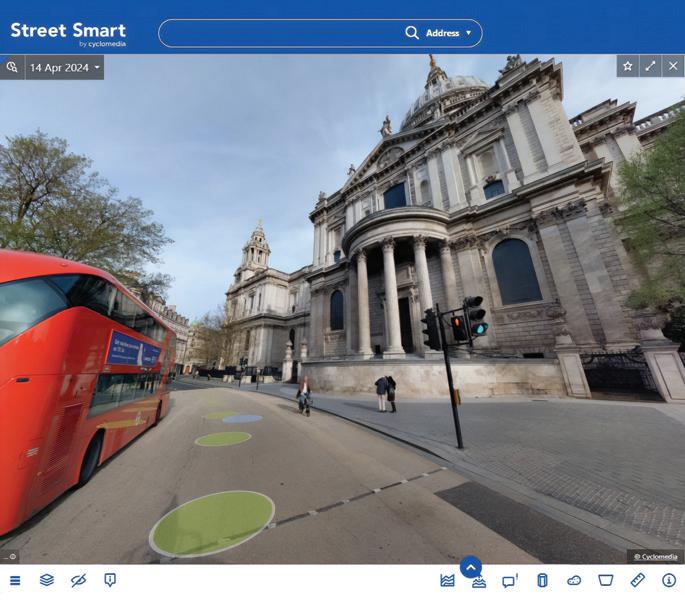

When asked what London authorities could do to improve road safety, the top answer for respondents was ‘better separation between road, cycle and bus lanes’, with 54%. Furthermore, 53% of Londoners agreed that councils prefer improving the infrastructure of motorists over the safety of other road users.
European comparisons
Overall, road safety perceptions are very positive in the capital. London came top out of all 32 cities when residents were
ity services at London Councils, said: “This pilot will allow vulnerable and those with severe disabilities an improved experience when using the scheme and will greatly improve the door-to-door offering of the scheme. This will allow drivers to enter these LTN zones to collect our customers without fear of potentially receiving a penalty notice charge.
“It is hoped the positive outcome of this pilot in Hackney will allow other boroughs to implement the technology and allow the wider Taxicard users and drivers across London to benefit when undertaking Taxicard journeys.”
Alan McDonald, Taxicard account manager for ComCab London, said: “We are delighted to partner with Hackney for this trial to provide our long valued Taxicard customers with improved access to the Taxicard service by exempting vehicles that are fulfilling a Taxicard journey from being penalised when travelling through agreed low traffic neighbourhoods.
“We hope that the trial is successful, and in the future this exemption can be offered on Taxicard journeys in all boroughs so that all service users can benefit from the accessibility improvements it delivers.”
asked if authorities do enough to improve road safety in their city, with 72% agreeing that they do. In contrast, at the other end of the scale is Rome, with only 28% in agreement. 75% of London respondents would also recommend moving to the capital, in terms of road safety.
The capital’s cycle lanes fared very well, with 72% feeling that its cycle paths are safe, ranking London in second place across Europe after Helsinki with 79%. Copenhagen came in third place with 71%.
In terms of safety overall, London compared favourably with 80% of respondents feeling safe in traffic, ranking it in tenth place, while Tallinn topped the list with 88%.
Cyclomedia specialises in creating 3D visualisations of outdoor spaces. The company develops advanced mobile mapping systems, capturing over 850,000 km of roads every year. Urban planners use Cyclomedia to examine and assess risk conditions, prioritise roadway maintenance and manage assets including traffic signs, lighting and other public infrastructure.
UK customers include the London Borough of Harrow, which uses Cyclomedia services to advance its digital twin agenda.
Living Streets delivers message to new transport secretary
The government has been urged to introduce a nationwide ban on pavement parking. Living Streets, the UK charity for everyday walking has written to new transport secretary Louise Haigh MP calling for action.
Living Streets and a range of other organisations want to see an end to pavement parking, which causes particular danger for blind and disabled people.
The charity delivered a ‘greeting card’ to 10 Downing Street. Over 5,000 people and organisations signed the card asking for the results from the government’s consultation into pavement parking in England to be published.
The consultation closed in November 2020 and no response or action plan has followed. In the meantime, Scotland has become the first UK nation to roll out a ban.
Catherine Woodhead, chief

executive of Living Streets handed the greeting card to Louise Haigh’s minister for local transport Simon Lightwood MP on 10 September.
“The new transport secretary has said she wants to move fast and fix things; putting an end to pavement parking is a great place to start,” said Woodhead.
“Blocked pavements leave older people feeling trapped in
their own homes and forces wheelchair users into the road. We know that it puts people off walking more of their everyday journeys and costs councils millions to repair cracked and damaged pavements.
“In a couple of months, it will be four years since the consultation into pavement parking closed. In that time, none of these problems have gone away
Nearly a third of people on a low income or not in employment in the UK do not have a convenient and secure space to park their cycle at home, says a study by Sustrans .
The study also reveals that 39% of disabled people did not have convenient and secure space to park their cycle at home, as well as 34% of women and 36% of people from an ethnic minority background.
Almost half of people on a low income or not in employment (47%) said they would start cycling or cycle more if they had a place to park their cycle at home which was convenient, secure, safe, and accessible, reports the walking, wheeling and cycling charity.
Residential cycle parking: Improving cycle parking for people on a low income or not in employment estimates that 1.5 million people on a low income or not in employment have been put off buying a cycle due to accommodation restrictions, for example not having a secure, convenient place to park a cycle.
Bike parking is a particularly important issue for people living in flats, the study found, adding that people who live in a flat are far less

on their own.”
Cars blocking pavements are also a problem for families with young children and stops them enjoying the benefits of walking to school. The National Travel Survey 2023 data released on 28 August shows that just 49% of 5-10-year-olds currently walk to school, lower than the government’s target of 55% by 2025.
The data also revealed that over a fifth (22%) of parents of children who do not currently walk to school said that safer roads, for example with slower speeds, less traffic, more considerate driving, would encourage them to walk to school more often.
Living Streets’ research found that 87% of parents had been forced to step into the road because of a vehicle blocking the pavement.
A pavement parking ban came into force in Scotland in December 2023. In Edinburgh, residents are seeing improvements in their streets with complaints about pavement parking down almost halved.


accessible (23%) place to store a cycle than people who live in a detached house (60% and 58% respectively). Only 40% of lowincome households have access to a cycle in comparison to 59% of households in professional occupations, says Sustrans’ report.
Relatively small and simple changes, for example giving people somewhere secure to keep their cycles, could be transformational for people’s lives, and our transport system, Sustrans believes.
“Improving cycle parking for people is straightforward to implement and would have significant benefits for health, wellbeing and access to education and employment. Local authorities should increase residential cycle parking provision, prioritising flats and areas of deprivation.”
Xavier Brice, Sustrans’ chief executive, said: “Cycling is a low-cost form of transport that opens up employment and education opportunities, as well as boosting health and wellbeing. Yet, millions of people who would benefit most from cycling face a major barrier in having nowhere safe, secure and accessible to store a cycle.
“This doesn’t have to be the case. Relatively small and simple changes, such as providing somewhere secure to keep their cycles, could be transformational for people’s lives and our transport system.
“The new UK government has pledged to overhaul transport and tackle inequality. Active travel is at the heart of this – and ensuring no one is left behind is vital. This is a key opportunity to break down barriers to cycling and make sure the benefits are available for everyone.”
The Driver and Vehicle Licensing Agency needs to harness digital and data as it evolves to meet future challenges, an independent review of the government agency has concluded.
The DVLA holds more than 50 million driver records and more than 40 million vehicle records, while collecting over £7 billion a year in Vehicle Excise Duty (VED).
The review is part of the Cabinet Office Public Body Review Programme and assessed DVLA against the four pillars of efficiency, efficacy, accountability and governance.
The review was led by an independent lead reviewer, Janette Beinart, who is a non-executive director at National Highways.
Key recommendations include the DVLA:
• setting a bold and ambitious strategy for service delivery
• accelerating its transformation to an even more dynamic, digital, and data-driven organisation
• strengthening the customer experience, particularly for vulnerable and smaller stakeholder groups.
Over 96% of vehicles driving in London’s ULEZ are compliant
Transport for London (TfL) is cracking down on drivers who persistently evade penalty charge notices (PCNs) issued for Ultra Low Emission Zone (ULEZ) contraventions. A cohort of people who refuse to pay multiple PCNs means that a significant amount of debt remains outstanding, which could be reinvested into improving the transport network for the benefit of all Londoners.
TfL is tripling the number of people in its investigations team to boost the work with enforcement agents to target those in polluting vehicles that refuse to pay the daily charges.
Boosting its intelligence-led approach will be used in tandem with other enforcement action including the ability of bailiffs to visit an evader’s address, clamp a vehicle, remove a vehicle and sell it at auction. This is in addition to the further fees that evaders accrue when they do not to pay the fine within the statutory time limit.
On 29 August 2023, the ULEZ expanded London-wide to help tackle the triple challenges of air pollution, the climate emergency and traffic congestion.
For petrol cars to meet ULEZ standards – based on emissions of nitrogen oxides (NOx) and particulate matter – they must generally have been first registered after 2005. Most diesel cars registered after September 2015 are also exempt.


TfL encourages drivers of noncompliant vehicles to sign up to its Auto Pay system, which enables customers to be billed automatically when their vehicle enters the ULEZ and therefore avoids a fine. Customers registered with Auto Pay are debited on a monthly basis for daily charges and receive a monthly statement of the charges. Those registered with Auto Pay have 90 days to dispute any charges debited.
Income generated from the ULEZ scheme is being reinvested into public transport. The scheme is not designed to generate revenue, as TfL wants all cars to be compliant.
The latest data shows that over 96% of vehicles seen driving in the zone comply with the emissions standards, meaning the vast majority of drivers do not need to pay the daily charge. TfL’s cameras check the number plates of vehicles driving in the zone, and if no charge is paid for a non-compliant vehicle within three days of the journey
taking place, and no Auto Pay arrangement is in place, a penalty charge notice (PCN) is sent to the registered keeper.
If a vehicle’s registered keeper does not pay the penalty, it is registered as an unpaid debt and an order made for its recovery. If still not paid this leads to a Court-issued warrant, and enforcement action to recover the outstanding debt.
If a registered keeper ignores a warrant, civil enforcement agents (bailiffs) visit their address to recover money owed. In July, a driver with 45 warrants against them was traced by TfL agents to a new address. They claimed that they no longer owned the vehicle, but TfL’s investigations team established that the PCNs were received before the vehicle was sold. The driver settled their balance of almost £16,000. Another repeat offender with 21 warrants against their vehicle was visited multiple times by TfL enforcement agents and made a series of payments to settle their outstanding debt of
over £7,800. Enforcement agents also have the power to seize particular belongings of the debtor, and use the proceeds to satisfy any outstanding debt. In August, a car was located, seized and removed after ignoring ten warrants. The driver in question had been issued with a total of 43 letters and been visited by bailiffs five times previously. Between August 2023 and July 2024, 1,429 cars were seized and removed by bailiffs. Between August 2023 and July 2024, 761 seized cars were auctioned, recovering £710,147 of debts accrued by the minority who refuse to pay the ULEZ charge.
TfL encourages anyone who has received a ULEZ penalty charge to engage with the notice. It says its staff work proactively with the registered keeper to reach a solution, including setting up payment plans where appropriate, to make fines owed more manageable, and signposting to charities and resources so that they can directly seek any assistance they need.
Alex Williams, TfL’s chief customer and strategy officer, said: “The most recent data shows that on average, over 96% of vehicles seen driving in the ULEZ are compliant. We want to send a clear message to vehicle owners that if you receive a penalty charge for driving in the zone, you should not ignore it. Your penalty will progress to enforcement agents to recover the fines that you owe, and there is a risk that your vehicle and other items of property will be removed.”
There has been a sharp rise in fines issued for non-payment of ULEZ charges since the zone was extended, says PA.
Fines totalling £322m have been issued for non-payment of London’s Ultra Low Emission Zone (ULEZ) since it was extended, new analysis suggests.
Nearly 1.8 million penalty charge notices (PCNs) were issued between 29 August 2023 – when ULEZ was extended from the North and South Circular roads to cover all London boroughs – and the end of June 2024, according to PA news agency analysis of Transport for London (TfL) statistics.
PA’s calculations are based on the total cost of each fine being £180, reduced to £90 if paid within 14 days. Failure to pay a PCN or make a representation within 28
days leads to the sum increasing to £270, after which TfL said it can use debt recovery firms.
TfL’s figures show it also received about £176m from drivers who paid ULEZ fees over the same period. The charge for entering in the zone in a non-compliant vehicle is £12.50 a day, although there are exemptions for taxis or transport for disabled people.
Steve Gooding, director of the RAC Foundation, said: “These eye-watering numbers beg the question whether the rules and consequences of the Ultra Low Emission Zone are clear enough, particularly to those not routinely driving into London.
“If the objective is compliance to deliver cleaner air then TfL needs both to focus on
whether its messaging is sufficiently clear, and whether the 14 million payments it received for non-compliant vehicles is saying something inconvenient about the economics and practicality of getting more drivers into more modern, more expensive but cleaner vehicles.”
AA head of roads policy Jack Cousens said the rise in fines issued will “reinforce concerns” that the ULEZ was expanded to generate income for the mayor.
“The ruthlessness of enforcement when a first-time warning letter might achieve the desired effect for most motorists, especially those living outside the zone, remains an issue,” said Cousens. “ULEZ signage has been accused of not giving enough direction to drivers unfamiliar with those roads.”
Rosamund Adoo-Kissi-Debrah, whose daughter Ella had air pollution recognised as a factor in her death, has settled a legal action against the UK government. Ella died following a fatal asthma attack in 2013 and became the first person in the UK to have air pollution recognised as a factor in her death.
The government said it is “truly sorry” for the loss of the nine-year-old and expressed its “deepest condolences” to Ella’s mother, siblings and everyone who knew her. Defra said the government was committed to a review into how air quality information is communicated with members of the public.
Air pollution was recognised by Southwark Coroner’s Court as making a “material contribution” to her death. She lived 25 metres from the South Circular Road in Lewisham and was exposed to excessive air pol-


lution, with levels above recommended guidelines, according to the coroner.
Adoo-Kissi-Debrah is founder of the Ella Roberta Foundation and a WHO BreatheLife Ambassador. Adoo-Kissi-Debrah is urging the government to introduce ‘Ella’s Law’, which includes the “right to breathe clean air as a basic human right”. She acts as administrator for Ella’s estate, which sued the Department for Environment Food & Rural Affairs (Defra), the Department for Transport


and the Department for Health and Social Care for compensation over Ella’s “illness and premature death”.
When the High Court action was first announced in January, under the previous Conservative government, the departments said they would be disputing the claim. Adoo-Kissi-Debrah told BBC London: “It’s a David and Goliath situation. I was never going to win. You can’t win because your child is already dead. But it was about the recognition, the justice, and I wanted
them to do something.”
Adoo-Kissi-Debrah met Emma Hardy, a Defra air quality minister in November. Emma Hardy said: “Air pollution is a public health issue, and I want to pay tribute to Ms Adoo-Kissi-Debrah who continues to campaign tirelessly to shine a much-needed spotlight on this. Quite simply, young children should not have to suffer as Ella did. We are grateful to the family’s work and very much hope to continue to engage with them.”
Following the meeting Defra, the Department for Transport and the Department for Health and Social Care, issued a statement: “Young children like Ella should not have to suffer because of our air. Your words, both in this litigation and in your public campaigning, have made a considerable impact.”
The statement added: “We are committed to delivering a comprehensive and ambitious Clean Air Strategy including a series of interventions to reduce emissions so that everyone’s exposure to air pollution is reduced.”



How data science can support social equity in parking enforcement
Technology and its applications in the parking industry have ramped up in many different areas over recent years, with data becoming an integral part of any enforcement strategy. Trellint, created following Modaxo’s acquisition of Conduent’s kerbside management and public safety businesses earlier this year, is leading the sector in its use of tech-led enforcement and data science, particularly for social equity in parking enforcement.
In the United States Trellint operates at scale supporting large cities like Los Angeles, Boston and Chicago, and there are many examples where the application of data science has helped to prevent disproportionate and higher fines for disadvantaged communities and vulnerable debtors. Where outdated enforcement schedules and routing allocations are still in place, data science gives cities a more targeted way of improving existing parking policies and deciding new ones.
The use of data science for parking strategies in the UK is still in its nascent phase but it is growing. Trellint is bringing its experience in the US to its local authority clients in the UK, many of whom understand how data can help drive decisionmaking but often lack the time and expertise to analyse it effectively.
Matt Darst, Trellint’s Director of Professional Services based in the US, said: “When looking at the parking sector in the US and the UK we recognise that there are some differences in approach. CCTV cameras are more widely accepted in the UK than in the US, for example, and GDPR provides a level of data protection in the UK which inevitably makes the public feel more comfortable about that use of camera technology. So, there is a cultural aspect to the approach we take in different geographical locations but the overall approach to customer segmentation and support remains similar at a high level.”
Local authorities having data analysts within their teams in the UK is becoming more common, but data science takes the use of data to the next level. Trellint’s data scientists have advanced degrees in machine learning, electrical engineering, and data science, as well as training in computer vision and AI. Traditional data visualisations, while useful, don’t provide essential information on the complex relationships between data sets, and often don’t identify the hidden trends behind the data or help predict the outcomes of any given scenarios. Visualisations created by data analysis can help tell a story of a community, but the more indepth work of deciphering data might then become the burden of city officials who don’t have the time or expertise to scrutinise it and make recommendations. This is where data science can help.
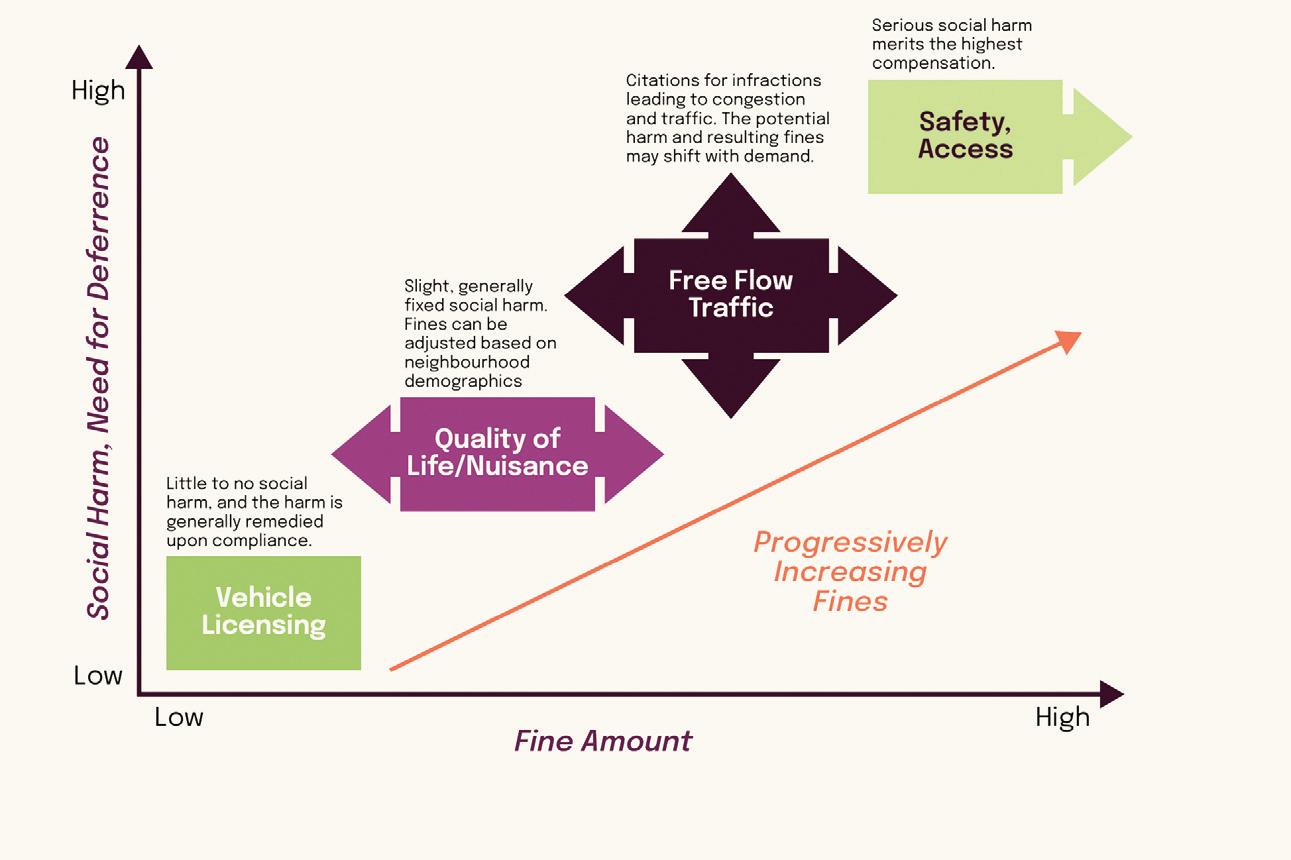
Access to data varies from city or council, and how you solve problems using data varies. If Trellint builds an algorithm for one city, that model cannot simply be copied and used elsewhere as the inputs will be different. Trellint’s data science teams consult with municipal clients to help them improve operations and address the variety of challenges they face, which could include congestion, safety and increasingly equity in parking enforcement.
Matt Darst explains: “Many of the parking policies we see are decades old, and our clients and the whole sector generally, hasn’t really taken advantage of this new approach to using data to relook at policies that have been put in place many years ago, with many cities still using the same enforcement schedules or enforcement routes used decades ago. They neither have the time to dig into the data—as city resources are overburdened as it is—nor the required big data expertise.
“Our data science team is both highly qualified and focused exclusively on kerbside management, allowing us to spend less time on data wrangling and move faster to make recommendations, including kerbside policies that don’t disproportionately affect disadvantaged communities.”
Trellint believes that outdated parking assumptions can lead to entrenched community problems. When creating an enforcement policy, every component of that process is open to reinterpretation and reengineering to improve how fines and kerbside access impacts those communities. Trellint works to identify opportunities for improvement so that there is no disproportionate fining of vulnerable debtors. In the US they have found that fines are often unjustly frequent, and also higher due to the way fines are structured.
The unintended consequences of inadequate planning and relying on historical plans, is that parking enforcement isn’t optimised. Despite the innovation in the industry in recent years, the effective use of the kerb to reduce congestion, improve safety or promote equity still hasn’t been achieved.
Using data science, cities can be mapped to show the likelihood of infractions in certain zones, including the times when they are most likely to occur. This allows the local authority to deploy personnel correctly and ensures that they work more efficiently within new enforcement zones, focusing on the areas with the most serious infractions which in turn improves equity.
Matt Darst expands: “Trellint’s work in Chicago is a great example of data science in practice. We increased the number of enforcement zones from 46 to 192 and prioritised those zones based on the likelihood of dangerous or congestion-related infractions. We then created the schedules for the city. Since we’ve been doing that, we’ve seen a real shift in PCN issuance, from neighbourhoods that are at risk to neighbourhoods where parking concerns are much more serious.
“Where an infraction doesn’t cause a dangerous condition or create serious social harm, e.g., an expired licence plate, the level of fine should be lower to reflect the impact. Further, the impact to vulnerable motorists often compounds. Disadvantaged motorists are often less likely to contest PCNs, and more likely to be found liable. There’s a correlation between literacy rates, incomes and the likelihood of being found liable. Our use of data has led to us making recommendations – like implicit bias training and the use of visual cues, like images and symbols – which make adjudication fairer.”
Clamping vehicles in underserved communities can also have negative consequences as those are the people that tend to need their cars to get to work, school and elsewhere.
Designed to maximise the potential of customer operations through data-driven insights, Trellint’s KERBSight provides customers with comprehensive access to data on the availability and usage of both on-street and off-street parking spaces.
A self-contained camera is used on an electric scooter, with its own power source, so as not to take any battery power from the bike. It is equipped with an in-built management system, featuring ANPR cameras and embedded GPS technology. This bike patrols designated areas, capturing vehicle registration marks (VRMs) and transmitting the data to the KERBSight management suite for analysis.
Through this data, the system provides valuable compliance data, such as the validity of permits, cashless session status, and Pay and Display (P&D) session information. This integrated approach enables kerb management of the kerb and optimised operations.
Additionally, Trellint can also offer detailed insights into various aspects of vehicle data, including make, colour, tax status, MOT status, year of manufacture, engine capacity,
Denying them access to their vehicles can create a cycle of debt.
“Chicago realigned its debt collection policies, focusing less on disadvantaged communities based on data we provided,” says Matt. “This has led to a higher number of clamps being deployed in less disadvantaged communities and increased productivity due to the reallocation of personnel.”
The US is ahead of the UK in terms of using data scientists for bespoke strategies and a review of the UK’s two-tiered enforcement system is due. While the cost of employing fulltime data scientists can be prohibitive for councils, consultancies can provide a proportion of the necessary work but Trellint provides the full data consultation and implementation service, making it unique in the UK market.
Collection of data for kerbside management can now be achieved through mobile registration plate capture technology – KERBSight – which works alongside civil enforcement officers, allowing them to cover a wider area.
Matt concludes: “It’s important to build feedback loops to ensure that recommendations remain fresh and relevant so that they align with reality. Today’s data-driven insights are tomorrow’s assumptions, so you must constantly review data to ensure you’re on a continuous path of improvement.”
Matt Darst is Trellint’s director of professional services based in the US


CO2 emissions, and fuel type, which can support business cases for future projects, such as a new controlled parking zone.
KERBSight is back-office agnostic, meaning you do not need to use Si-Dem, Trellint’s propriety back-office enforcement processing system, to benefit from the technology, Trellint just needs access to parking session and permit data from existing providers to maximise the benefits offered.

New benchmarks are being set in parking management software, helping Parking Operators to constantly push the envelope to streamline and enhance the efficiency of their enforcement operations.
Unity5 are thrilled to announce a major advancement that will set a new benchmark in the industry - with their real-time lookups on the DVLA’s KADOE API Service.
Traditionally, obtaining vehicle keeper information via the DVLA involved a waiting game. Understandably it could take up to 24 hours for a response to files sent, sometimes longer over weekends. This unavoidable delay often extended ticket processing times and increased the risk of missing crucial deadlines under the Protection of Freedoms Act (POFA).
No more waiting days for a response. Whether it’s Monday or a Friday, you’ll get real-time results, dramatically reducing the wait time for vehicle keeper information.






But that’s all in the past. With the new real-time lookup capability on the DVLA’s KADOE API Service, you can expect instantaneous responses, which will enhance and streamline the use of market-leading parking management software such as Zatpark from Unity5.
Zatpark simplifies enforcement processes and eliminates the need for costly software maintenance.
Unity5's advanced use of the DVLA’s KADOE API Service is tailored for Private Parking Operators and Local Authorities that require accurate and timely vehicle keeper information. Unity5’s real-time solution ensures these critical operations are handled swiftly and accurately.
Entire ticketing process can be completed within a single day.
Motorists will receive their notices much closer to the date of the contravention.









T he W inner s






See you next year on 12 September for the…

The British Parking Awards 2024 honoured a sector that keeps our world moving, writes the event’s founder Mark Moran
The winners of the British Parking Awards were revealed at the Royal Lancaster London on 13 September. Yes, it was Friday the 13th, but the British Parking Awards 2024 proved to be lucky for some! The British Parking Awards were founded by Parking Review magazine back in 2002 to honour excellence in the design, operation and management of parking.
This year’s finalists were whittled down from a list of over 140 entries by a jury of 25 independent-minded experts who are truly passionate about parking. A key reason for the awards being so respected, and the trophies so coveted, is that the competition is built on the trust placed by entrants in the decisions of the jury. The entries were divided between teams of jurors, who read and ranked them ahead of a series of meetings both online and in person to establish the short list.
The next stage saw entries re-read and discussed by the wider pool of jury members, with site visits undertaken for the car parks and systems, and apps and websites tested out. Where needed, follow-up questions were posed to entrants and testimonials checked or gathered for individuals in line for categories such as Rising Star, Person of the Year and the Lifetime Achievement Awards. The jury then assembled at the Royal Lancaster London in person for a day of discussion and debate at which the final list of winning entries was agreed.
In parallel, the Landor LINKS team was busy organising the British Parking Awards event, which over the past 22 years has grown in scale and ambition to become firmly established as the highlight of the sector’s social calendar.
The awards’ longtime home is the Royal Lancaster London, which is renowned for the quality of its catering and elegance of its banqueting rooms. The selection of this year’s menu was, as ever, a challenge that the events team and invited guests take
very seriously, and enjoy as they are treated to a range of exquisite creations for each course. The final selection was among the finest menus we have composed, and one of the greenest as both Landor LINKS and the Royal Lancaster are committed to supporting sustainable and low-carbon practices –without sacrificing flavour!
The 650 people who attended the 2024 ceremony were treated to a mesmering film and show designed by Landor LINKS’s event team. The ceremony was kickstarted by Paul Moorby OBE, founder of main sponsor MiPermit, and leading parking professional Anjna Patel OBE. They handed the ceremony over to this year’s hosts, the comedian and broadcaster Paul Sinha, and acclaimed voiceover artist Roger Tilling.
A day of wit and wonder saw a parade of parking professionals invited to take to the stage to collect their trophies, pose for pictures and record video messages that can be found on the official website. And those who wanted to continue celebrating headed to The Swan overlooking Hyde Park.
We next gather again for the best day in parking at the Royal Lancaster London on 12 September 2025.
Mark Moran is editor of Parking Review

Mark Moran

The British Parking Awards were presented by a line-up of talented and insightful hosts
The British Parking Awards began with a welcome by Anjna Patel MBE, a leading figure in the UK local authority sector. “You do a wonderful job in this country,” she said. “You keep the country’s wheels moving. You lead the country in technology. You show the government where they should be going and where the legislation should be. This sector is really, really successful and contributes so much to the economy. One day, government will actually come to realisation that we contribute so much to the economy. But if not, we might have to form our own pollical party!”
Next on stage was Paul Moorby OBE, founder of Chipside, provider of MiPermit parking solutions. He reflected upon the tough times the industry has faced and acknowledged the resilience of those gathered, emphasising the importance of being able to laugh and, sometimes, cry together.
Moorby said: “All around the world, every country is considering what the future looks like. What does society look like? What does industry look like? And in our sector, what does the world of transportation look like with a smaller population? What does mass transport look like? Is it affordable? Can we have people driving their own personal vehicles? Should we prevent that from happening? That is what we’re all working on and you should all be proud that you are designing the future for the next generation.”
As the awards ceremony’s guest host Paul Sinha took to the stage he noted the esteemed people he was following, saying: “What a nice change is have someone on stage who possesses neither an OBE nor an MBE –you’re just slumming it now!”
Sinha kept the audience laughing as he ran through his journey from doctor, to stand-up comedian and professional quizzer, a talent that saw him become ‘The Sinnerman’ on ITV’s The Chase.
Looking back at his headline performance at The Comedy Store, Sinha revealed: “Last summer, I has my a first solo show at the world famous Comedy Store in Piccadilly in central London, bloody three and a half hours drive from Central London in a place called South London. I apologise now, if that three and a half hour drive is the fault of anyone in this room... I’ve not done the research!”
Sinha then conducted the presentation of the trophies, riffing all the way with the ‘Voice of Parking’ Roger Tilling. He closed the event by stating how much he had enjoyed the company and hoped to come back again.



Classic British Parking Awards trophies flanking the Parking Rosettes presented for special categories
Entries to the British Parking Awards are assessed by a jury drawn from across the parking, transport and motoring sectors. There were 140 entries to the 2024 competition, plus a series of nominations for special awards such as those for the Lifetime Achievement and ‘Parking Rosettes’.
The judges
Chair and organiser: Mark Moran, editor, Parking Review
Jason Benjamin, parking manager, Portsmouth City Council
Simon Cheung, director of operations, Chipside
Polly Church, director, Potter Church & Holmes Architects
John Elliott, Local Government Technical Advisers Group (TAG)
Graham Footer, chief executive, Disabled Motoring UK
Mark Frost, director, Fern Consulting
Elisabeth Gilliard, independent management consultant and vice president, Chartered Institute of Logistics & Transport (CILT)
Phil Grant, parking services manager, Harborough District Council
Nick Lester-Davis, director, Nick Lester-Davis Consulting
Gavin Manger, parking professional
John McArdle, independent consultant
Chris Naylor, head of membership and relations, IPC
Paul Necus, independent consultant
Angela O’Shea, independent consultant
Laura Padden, director, PATROL
Anjna Patel MBE, parking professional and chair of the BPA
David Peach, managing director, Workflow Dynamics
Andrew Potter, director, Parking Perspectives
Mark Potter, director, Potter Church & Holmes Architects
David Pye, director, Capital Traffic Management & Parking
Manny Rasores de Toro, principal, MR Parking Consultancy
Mahmood Siddiqi, head of technical development, PTRC
Richard Talbot, director, The Railway Consultancy
Steve Thompson, independent consultant
In addition the British Parking association’s regional managers provided feedback on the Park Mark and Park Access status of facilities competing in the Best Car Park and Car Park Renovation categories.
Landor LINKS would like to thank all the jury for their great work.
Parking Person of the Year
Michael Wiktorko
Rising Star Award
Nisha Damhar
Andrzej Paszek
Parking Team of the Year
ZZPS
Parking Partnerships Award
Marston Holdings, City of Westminster and the Metropolitan Police
The Front Line Award
Ellen Tooley
The Back Office Award
Durham County Council and NSL
Parking in the Community Award
Marston Holdings and Social Bite
Parking Operator of the Year
Q-Park
Communication Award
Major Incident response: APCOA and London Luton Airport
Better Streets Award
Pavement parking controls: City of Edinburgh Council, Project Centre and NSL
Traffic Team Award
Project Centre
Parking Technology Award
Peterborough City Council and Imperial
The Car Parks
Best New Car Park
Blackpool Central Multi-Storey Car Park
Car Parks: Special Projects Award
Fidelity Kingswood Multi-Storey Car Park
Car Park Renovation Award
The Plaza Multi-Storey Car Park
EVolution Award
EV Charging Award
Cambridge City Council, Connected Kerb and Stripe Consulting
Parking Rosettes
Accessible Parking Award
London Borough of Haringey
Connected Vehicles Award
Parkopedia
Special Awards
MiPermit Inspiration Award
Vaso Vaina
Lifetime Achievement Award
Amanda Jones
Maureen Williams
Special Jury Award
The Single Code of Practice: The British Parking Association and the International Parking Community

Practice makes perfect… behind the at the British Parking Awards 2024

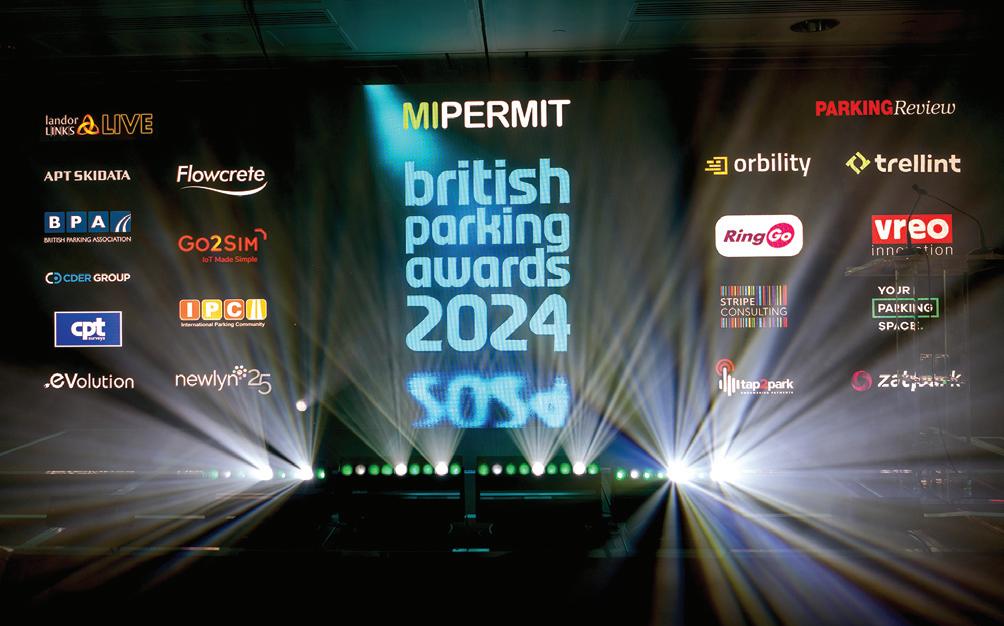

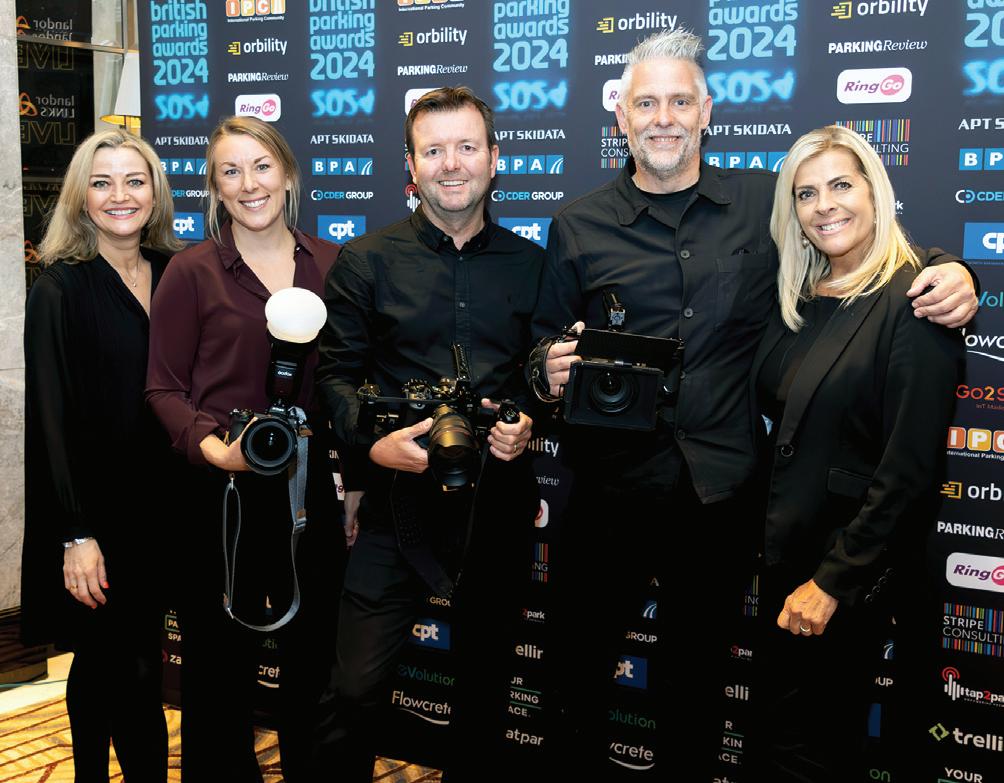



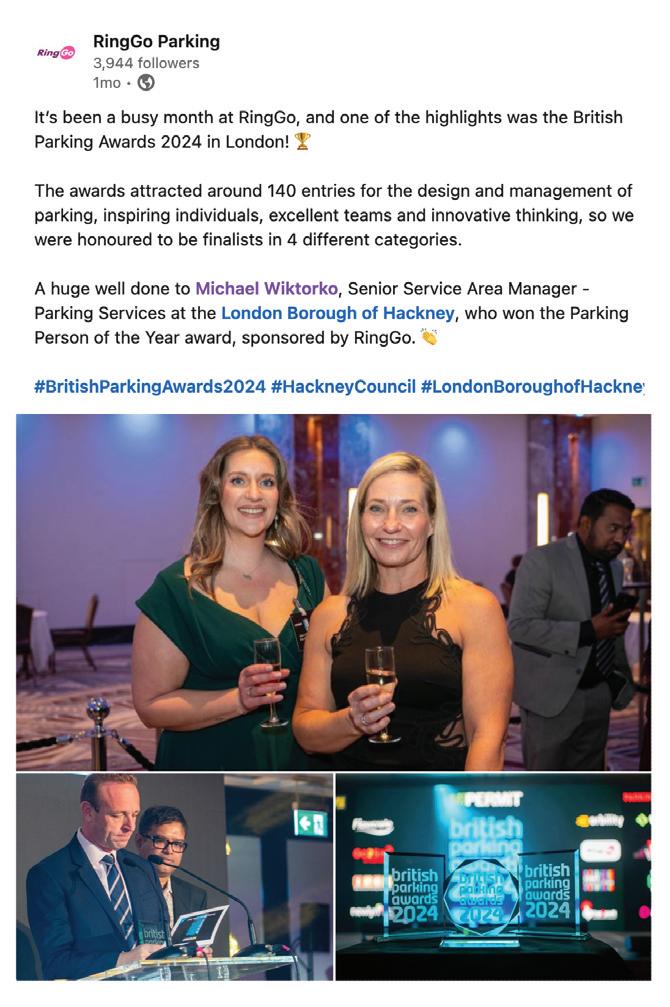



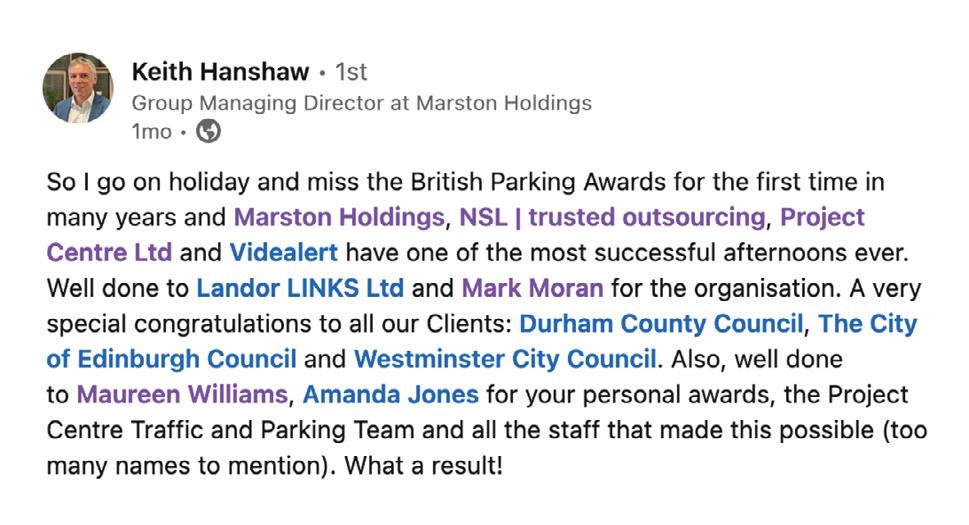





Designing car parks is often seen as a mundane task between architectural groups and is regularly frowned upon. It is sadly true that other architects already involved in the sector, from other practices, refer to car parks as “boring” or not interesting structures. But not for Vaso Vaina, managing director of Stripe Consulting. She is an architect who treats these structures with the respect they deserve, applying to each design the latest in architecture, fire safety and engineering.
Vaso Vaina joined Stripe Consulting as a design manager in 2018, coming from a similar position in a major UK housebuilding company, Churchill Retirement Living. She then progressed to become head of architecture
In August 2021, the company’s owner sold the majority of the company shares to Ballast Nedam UK. This created an opening for a managing director in Stripe. In recognition of her hard work and dedication to the company’s future, she was selected for the director role and since then she has been overseeing the company’s multi-disciplinary team operations.
Vaina has been practicing since 2004 as a fully qualified architect and has been involved in the design of award winning developments. Vaina is a RIBA chartered architect, chair of the RIBA Surrey branch, and a fellow of the Chartered Managers Institute. She also mentors students at Brighton and Portsmouth architectural schools, as part of the RIBA Future Architects scheme, and gives her own time to participate at mock interview events.
Vaso drafted Stripe’s first ever company mission and vision statements, embedding sustainable design principles. It reads:
“Our vision is to be the number one consultancy choice for all clients with car park related projects. Lead and contribute developments in the car parking sector. Design efficiently, specify sustainably, with repurposing and recycling at the core of every decision.”
Vaina actively encourages engineers and architects to consider embodied carbon from early design and specification stages. She allocates time to staff to get familiar with the latest developments in the sector. These include seminars on carbon and Biodiversity Net Gain (BNG) calculations. She is raising awareness about BNG that will affect all car park applications moving forward, as this became law in April 2024.
Stripe moved to a brand new office in February 2024 and as a business it has made significant progress in going paperless and implementing a new sustainability policy. It is now sharing waste and mileage data with the wider group and contributes to quarterly reviews and annual data collection.
Vaina also encourages clients to engage with building contractors with strong social value records:
• creating jobs and long-term employment
• ethical and low-carbon supply chain sourcing
• engaging charities, community organisations and non-profit organisations (NPOs)
• promoting a sense of identity and cohesion within communities.
For example, she led the multi-disciplinary team that delivered a £25m multi-storey car park in a deprived neighbourhood in Blackpool, working with subcontractors employing ex-detainees.
Championing inclusivity, diversity and wellbeing
Transitioning the company from a single company owner to being part of a bigger group, Vaina saw an opportunity to reshape the team. In all recruitment processes she looks out for the most qualified candidate to take the role, regardless of gender, age, nationality or faith and beliefs. She never asks questions during an interview that would reveal personal information about a candidate. She organises meetings with recruiters, making clear the company’s inclusive policy and actively encouraging them to look within all professional and social groups.
The COVID lockdown years had a significant affect in the way Stripe works. Whilst it appeared unthinkable to operate a multidisciplinary design team remotely at first, during the pandemic this became the norm. Under Vaina’s leadership the company continued with remote working for a full two years after the restrictions were lifted. Whilst working from home benefitted some, others were left feeling isolated and it impacted their mental health. Managers including herself blended family and professional boundaries and reached a point of burnout.
Vaina recognised that not one rule fits all and she made adjustments to suit individual circumstances. While keeping an eye on productivity and individual performance, she allowed flexibility for employees who decided to move away from the office during COVID. She allows flexibility also for new mums and dads with school age children.
She encourages conversations about mental health within the business and she reached out to external providers for mentoring tips for managers. Vaina introduced physical and mental health questionnaires. She had looked to nominate a mental health ambassador, but feedback from staff suggested that they would open up more easily to someone external to the business. She then trusted this role to a new HR advisor role, created in the UK by the group of companies.
Vaso also regularly organises H&S training modules involving her whole team.
Parking sector ambassador
Through her involvement with RIBA, Vaina champions the values of good design in the car parking sector. She is a great car parking ambassador. When she attended a Members Forum event at the RIBA headquarters at Portland Place in London, Vaina was the only architect with car parking design experience among the participants and didn’t shy away from advocating the sector.
She is also mentoring new talent into the sector and safeguarding its bright future in terms of necessary skills, by bringing new architectural talent to the sector.
Vaina also made time to help develop the programme at Landor LINKS’s Car Parks conference, held in March 2024. She worked in close cooperation with programmer Mark Moran, editor of Parking Review, on shaping an agenda that encapsulated the full design life of a car park. From inception and initial design stages, to lifecare plans and maintaining them in the years to come. The conference covered subjects like the change in 2023 to the car park designs standards and raised awareness on ever-changing standards regarding fire safety and introduction of new uses. The conference gathered significant interest from car parking sector peers associated with the built environment and a sequel is planned for 2025.
Vaina also regularly uses social media platforms like LinkedIn to promote fire safety, structural safety and compliance issues associated with car parking projects.
By initiating her registration in the RIBA Principle Designers database, Vaina will be the first car park specialist architect to serve these type of structures, following the introduction of the Building Safety Act in October 2023. And by initiating her regis-
Award sponsored by

tration in the RIBA Client Advisor register, she will also be the first person qualified and with extensive industry experience to provide client advice, in both the private and public sectors.
Accreditations like these, bearing the logo of an architectural institute like RIBA, help to give to the design of car parks the importance and attention it deserves.
Vaina is an active member of the British Parking Association (BPA) Suicide Prevention working group, leading to the publication of the Suicide Prevention in Car Parks factsheet and guide. She regularly presents at national exhibition and conference events on parking, and also participates in the BPA’s Structures and Women in Parking Groups.
Vaina assisted Sara Fisher when the BPA was creating a presentation to launch their Park Access accreditation. She drew from the extensive library of projects she designed and completed, showcasing the successful implementation of accessible bay design and provided most of the visuals that Fisher used in her slides. This presentation was shared in all working groups within the BPA, Parkex and the Car Parks conference.
Vaina regularly presents at the BPA main event Parkex, covering the very sensitive subject of suicide prevention. Last year she presented some practical examples of what can be done to eliminate or reduce the risk in existing and new structures. This year at Parkex in Birmingham she participated in an interactive session, encouraging all participants to discuss suicide prevention.
Vaina attended the UKREiiF in Leeds this year, as part of the Women in Architecture delegation, raising the profile of women in construction. She met with several teams raising the profile of car park specialist designers in this huge event.
She maintains high standards in all project she delivers with her team. Her team successfully renews their ISO and Safe Contractor accreditations. The fact that she gains repeat business from clients and numerous positive feedback statements illustrates the level of excellence she achieves in her work in the car parking sector.
Vaso Vaina: “I really hope that I have received this award for the work that I have put behind suicide prevention in car parks, for mentoring young architects to try to enter the sector, and for educating the industry on latest changes of design standards.”

Michael Wiktorko started his journey in the parking sector in 2009 as an apprentice – the top third choice in his application for a council apprenticeship programme that has significantly changed his life. Little did he know then that he would still be in the parking industry 15 years later!
During his career so far Wiktorko has worked with several local authorities as well as a stint in the private sector, but has spent the majority of his career in Hackney Council’s parking services. At the east London borough he has progressed from an apprentice through a wide range of roles in the sector such as parking correspondence officer, permits officer, debt recovery officer, and debt recovery and finance team leader.
In 2018, he became the service area manager for Hackney’s parking enforcement service area where he has achieved great success, made an outstanding contribution to the industry and represents a ‘model of excellence’. More recently he has been promoted to senior service area manager for parking customer services to take his role to the next level and to continue improving the image of parking to the general public.
Changing public perceptions
Parking is often perceived as a service that is designed for revenue generation. Wiktorko has been working extremely hard to tackle this unhelpful stereotype and delivered a number of innovative approaches that helped to change this.
For example, when Hackney Council started the roll-out of new low traffic neighbourhood (LTN) and School Streets schemes, one of the first challenges he faced was pushback from drivers not being aware of the new schemes, constant complaints and reputation-damaging news articles stating that councils were just doing this to bring in cash.
Wiktorko responded by implementing a new process where warning notices are issued instead of penalty charge notices (PCNs) for the initial first phase of new schemes. These warning notices do not carry a financial penalty. There have been tens of thousands of warning notices issued that helped to raise awareness and improve driver compliance with such schemes.
Parking is often seen to deal with permits, car parks and bus lanes – often the most difficult cases are managed following complaints or elected members’ enquiries. Wiktorko has taken proactive steps to implement a new abandoned vehicle policy that enabled the council to take stronger action against vehicles that cause the most nuisance to local communities, often they are used by criminals and attract anti-social behaviour.
Wiktorko has led his team through a major transformational change – bringing parking enforcement back in-house.
The opportunity came when the outsourced parking enforcement service, which had been provided by an external contractor since 1999, came up for review. The council was facing additional financial pressure to deliver savings and a long-standing dispute between unions and the external contractor. Furthermore, the service suffered very low morale in the workforce along with a high staff turnover rate.
Wiktorko reviewed the contract and the statutory service provision. He managed to find win-win solutions that delivered over £500,000 savings per annum, resolved all outstanding issues with the unions and delivered more effective and higher-performing service for residents by insourcing the service.
His work led to the creation of a new in-sourced parking enforcement team, which was named Team of the Year at the British Parking Awards in 2023.
One key aspect of the transformation of parking in Hackney saw Wiktorko design and implement a rebranding of civil enforcement officers as ‘road and traffic enforcement officers’ (RTEO). This
change expanded the officers’ role with the aim of combatting long-standing negative stereotypes associated with parking enforcement. In conjunction with the rebranding, a new uniform was designed to give the officers enhanced comfort, improved durability, and adaptability to various weather conditions.
The goal of the rebrand was to present a more approachable and helpful face to the community. For example, the officers are now the “eyes and ears” of the council, ensuring that problems such as vandalism, fly-tipping, graffiti, uncollected waste and anti-social behaviour are reported promptly and no longer rely on residents and businesses to report such issues.
This change has improved the overall image of the enforcement officers which resulted in a reduction of physical and verbal attacks on our staff from 172 attacks in 2020 to 13 in 2023 (representing a 92% reduction).
Another bold move in the transformation was the implementation of a four-day working week for RTEOs. This initiative is aimed at improving work-life balance and to provide officers with five consecutive days off every three weeks to rest and take a break from their demanding roles.
The transition has improved the deployment of parking enforcement across the borough as this could now be achieved with a single shift, as opposed to the previous requirement of two shifts to cover the majority of parking restrictions.
The four-day working week is based on nine working hours per day as opposed to seven hours per day which reduced the overall time lost to travel between streets each day (improving time spent on duty and enforcing by 12%).
Previously, staff were required to work on Sunday which has led to problems in recruitment and retention. This was replaced by overtime work that is allocated fairly and in a transparent manner to top performers (based on quality not quantity of enforcement activities). This removed the pressure on the staff who did not want to work on Sunday and created an opportunity to recognise and reward hard-working enforcement colleagues.
The new rota provides for a “team day” every Wednesday, which provides an opportunity for training and individual checkins to take place without affecting service delivery.
knowledge and community support
Parking services has expanded the use of controlled parking zones (CPZ) over the past decade, moving from 64% coverage in 2011/12 to 100% in 2022/23. The borough has been split into three districts with regards to parking enforcement.
Officers are deployed in their districts all the time and are not rotated between different locations on a random or rotational basis. This ensures they build local knowledge, provide community support and act as the face of the council by providing further information and advice about parking restrictions, permits, processes and consultations. This allows the managers to train officers with information specific to their district, as opposed to training on all issues, enabling officers to become familiar with locations that are normally compliant, and locations where there is a higher chance of drivers being aggressive, along with fully understanding and being sensitive to local community needs.
Engagement and satisfaction
Wiktorko puts his team at the forefront of service delivery –something that he learned very early in his career. He promised himself that if he ever became a manager he would focus on staff wellbeing first. He learned and adopted the theory that people don’t work for organisations – people work for people. The transformation work that Wiktorko led has also had a significant
Award sponsored by

impact on staff engagement and satisfaction. Staff surveys conducted every six months have shown an increase in engagement rates (improving from 53% in 2022 to 84% in 2023), indicating improved morale and motivation among enforcement colleagues.
The creation of apprenticeship positions further supports the development of new talent within the parking industry and is expected to address future recruitment challenges. A recent council-wide staff survey has further shown how Wiktorko has led the team and it forms part of his testimonial.
Wiktorko designed a new structure that created an environment for team leaders and managers to spend time with officers directly in coaching, supporting, training and motivating staff. This has had a real positive impact on the staff. During 2023/24 his team has seen only one member of staff leaving for better opportunities externally – a few years earlier at least 30% of staff would leave to work elsewhere.
School Streets enforcement programme
Wiktorko has led the implementation of enforcement in School Streets that set a new standard for the UK. This work was further recognised in 2023 with an award at the British Parking Awards for School Streets. His innovative approaches to managing vehicle access around schools during peak times, enhancing safety and reducing traffic-related pollution has resulted in creating safer and more sustainable environments for school children.
Wiktorko has worked on redefining the debt recovery processes and contracts for outstanding debt in relation to parking penalty charge notices (PCNs). With the new Taking Control of Goods Act coming into force, he had the foresight to understand that the future of the debt recovery work would focus on the support to vulnerable debtors and offering payment arrangements.
A very similar process was later implemented in the form of “breathing space”. The initial scepticism about accepting partpayments and instalments resulted in over 30% increase in the income recovered and now represents standard practice on Hackney Council debt recovery contracts.
Kevin Keady, assistant director at Hackney Council, says: “Michael has always known that parking is just a tool to deliver greater change in the local communities and make the lives of residents safer, healthier and better. Michael is a strong advocate for the parking sector and wants to share his ideas on how to deliver the best performance in the sector with all stakeholders, both public and private.”
Michael Wiktorko: “Wow! I never expected it! This award means a lot. I was quite unprepared, so I don’t really know what to say, but it means a lot. I hope I can continue to develop parking and make the difference for better communities and the country.”

Maureen Williams is the enforcement manager at London Borough of Camden. Her long and varied journey in parking started at the ground level in November 1991, patrolling the streets of Camden as a parking control officer. Over the following decades she has developed, and transformed into one of the most experienced and capable enforcement managers in London.
Williams has been a key contributor to the evolution and effective delivery of the parking service in Camden. She has developed a strong and highly capable team, and is held in high regard by both her colleagues at NSL and the client team at Camden Council. Williams has led her team through changes such as transitions from being an in-house to an outsourced service, changes to working environment, in procedures and through the uncertainty and anxiety of the COVID-19 pandemic. She currently manages NSL’s Regis Road base, which is the largest in Camden with over 70 colleagues under her wing.
As an NSL base manager she has undertaken development courses offered by Marston Holdings, including Managing People Positively and Leading Teams, which has helped Williams to enhance and hone her skills, whilst enhancing her knowledge of the technical and process-related elements of her role, such as performance and absence management, along with IT and Health and Safety elements that were essential to her remit.
Over time Williams has adapted her leadership style to a more strategic approach, encompassing not only her own team but also with developing her relationship with the client. Having previously worked as a member of the Camden Council parking
team, she was able to proactively harness her knowledge and understanding of the client’s operation, using this to identify opportunities to further her own development and that of her team, focussing this for the benefit of both her employer and her clients.
In addition to developing her own skillset, Williams has taken a keen interest in developing her own team, taking time to identify talent, and proactively providing opportunities for her subordinates to broaden their experience and capability. She prides herself in offering additional or extended duties to enthusiastic colleagues, providing them with a platform to not only learn new skills, but to highlight their capabilities, which might not otherwise be demonstrated.
Andrea Jones, strategic operations director, Marston Holdings: “I first started working with Maureen in 2011 when I became the parking operations manager for the London Borough of Camden. There are a lot of adjectives to describe her; however her knowledge of the borough and dedication to both her client and her team stand her out from the crowd. When I think of Maureen I always see her smiling no matter what the situation, a characteristic we all strive towards but rarely achieve.”
Sileshi Woyessa, asset officer at Camden Council: “Maureen is one of the greatest assets in the UK parking sector. She is a seasoned professional who has lived through and adapted herself to the ever-changing technological and legislative landscapes of the parking industry, embracing, managing, implementing, and radiating change throughout her long career. Maureen’s long service, unwavering dedication and distinguished leadership in parking enforcement makes her a true inspiration for young professionals, principally for young women of all backgrounds, who would shape the future of our industry.”
Maureen Williams: “I’ve been in parking for 33 years and it gives me pleasure to be recognised at this level. It recognises my competence and that I manage a good team of people. A big thank you to everyone who recognised my contribution to parking by nominating me.”

audiences. Jones also delivered the first Traffic Orders for motorcycle charging in the London Borough of Westminster, a politically sensitive and high-profile scheme, showcasing her ability to manage complex and impactful projects.
Amanda Jones has over 35 years of experience in drafting and processing Traffic Orders, which she gained while working in local government (Greater London Council, City of Westminster Council) before starting work with Project Centre in 2021.
Jones is expert in drafting high-quality and technically robust Traffic Orders of all types and is wholly familiar with the relevant legislation relating to them.
Jones has demonstrated exceptional expertise within Project Centre, particularly in drafting and processing a comprehensive range of Traffic Orders and notices. Her proficiency encompasses controlled parking zones, waiting and loading restrictions, bus lanes, cycle lanes, banned turns, one-way streets, road closures, pedestrian-only zones, speed limits, and variations in parking charges. Additionally, her skills extend to Town and Country Planning stopping up orders, footpath orders, and notices for pedestrian crossings, road humps, and cycle tracks.
Jones has consistently provided expert advice to various local authorities, establishing herself as the go-to person for inquiries on the latest developments in traffic orders. Her commitment to simplifying and modernising the traffic order process, in collaboration with local authorities and the Department for Transport (DfT), has resulted in a more efficient and cost-effective service for clients.
Noteworthy achievements include being among the first to produce a combined waiting, loading, and parking place mapbased Traffic Order, significantly enhancing the transparency and accessibility of the traffic order process for non-technical
Nikki Musson, senior parking consultant, Project Centre: “Mandy has a wealth of knowledge and experience, particularly where traffic orders and traffic/parking management are concerned, gained from working both in the public and private sectors over the years. Her friendly, professional approach makes her an invaluable team member who we can all learn from and discuss solutions to the trickiest of parking problems. Put simply, there’s rarely a situation she hasn’t met before or can’t apply her extensive knowledge to, which is why we call her The Oracle!”
Steven Halsey, principal parking consultant, Project Centre: “Mandy has been a font of knowledge for all things traffic order related and has helped me to accurately plot legal milestones for implementing experimental and permanent TROs into project timelines for client moving traffic schemes. Without her help and guidance, I would not have been as confident providing accurate timelines or been so comfortable answering questions about the process when it comes to orders and their legal requirements.”
Andrew Griffith, Traffic Order specialist, Waltham Forest: “In 2006 I was seeking a change in career and applied for a role in Westminster where Amanda worked as a senior order maker for West-One (WSP). I applied as an apprentice. I was inexperienced but she saw potential in me. She put in a good word and the result is that – with her help, guidance and expertise – I have looked after the day-to-day Traffic Order process for a local authority for the last 11 years. She was, and still is a great mentor, very calm with attention to detail.”
Amanda Jones: “I’ve been in the industry a long time. I’m considered an expert in my field. I’ve mentored a lot of people over the years at a lot of different organisations. I’m a bit taken aback, but I’m really thrilled that I’ve been recognised for my many years of service in this industry.”

Andrzej Paszek joined Agena Group in 2021 as a mobile parking operative to help finance his studies.
But it quickly became apparent that the company had gained a young talent with big ambition and the skills to go far. Within months he began moving up the organisation taking on managerial responsibility and proving himself to be an exceptional line manager, and is now a junior IT project manager
Alex Cooke, Agena’s chief operating officer, says: “When Andrzej expressed his ambition to apply his Business Degree and retrain to become a project manager, we knew it was our duty to help him achieve his goals and he was welcomed onto our Ascend Apprenticeship scheme. Having completed his apprenticeship in record time – 12 months rather than the allotted 21 months – Andrzej is now a qualified junior IT project manager and has contributed to some of the most pivotal projects in Agena Group’s growth and diversification strategy.”
Paszek commenced his degree at Middlesex University and around the same time joined Agena Group in 2021 as a mobile patrol operative, which fitted around his studies as it gave him the flexibility he needed. However, Agena Group recognised that it had gained a young talent with big ambition and the skills to go far. Within seven months Andrzej was promoted to warden team leader, transforming an underperforming team of 30 wardens into one of the highest performing teams.
When Paszek expressed his ambition to apply his International Business degree and retrain to become a project manager, Agena saw an opportunity to nurture his talent whilst fulfilling an essential need within the business. At the time Agena Group was preparing to launch a growth and diversification strategy, which was underpinned by the development of digital-first products and industry-leading data insights solutions. This was to be led by its tech innovation business, Atria. In preparation it advertised a role for apprentice project management officer and invited Paszek to apply.
Agena Group’s Ascend Apprenticeship programme is an essential tool for retaining and attracting talent into the business. Core to the programme is the opportunity for current employees to retrain or develop in their chosen career path whilst earning a market rate salary.
Pazek’s dedication to his apprenticeship and hard work saw him complete the course in a record 12 months – half the time expected. Fleur Grewcock, educator at Heart of England Training, says: “The APM apprenticeship is usually completed over the space of 21 months. Nine months dedicated to the PMQ and then the following year to the gathering of evidence for the standard. Andrzej completed this all in one year which I have never known before. This was due to his determination and dedication.”
Since joining Agena Group, Paszek has proven to be an asset to the business in every position he has held. He has contributed to some of the biggest digital transformation programmes seen at Agena, managing complex programme plans and coordinating between core teams and stakeholders across the group. He has become a conduit between the IT development teams and the end user and has worked hard to improve its internal processes.
Award sponsored by
For example, as project management officer he supported the ‘Fleet’ initiative to address complex processes for recouping parking charge notices (PCNs) attached to rented vehicles. Savings this year include:
• percentage cost savings: approx. 72.93%
• number of letters saved: approx. 28,985.14
• CO2 emissions saved: approx. 0.122016 tones (roughly equivalent to 81% of the emissions from one short-haul flight).
He also managed programme plans for the launch of a suite of new digital products core to Agena’s diversification drive including its first ever consumer-products. Technology-enabled solutions now account for 53% of total revenue.
Meanwhile, Paszek oversaw the delivery of ‘Timesheets’, an internal app that monitors financial and time-spend on projects to enhance forecasting, forward planning and budgeting.
Paszek reimagined the IT change management process for internal and customer change requests, including managing full IT road map and developing a system of transparency and collaboration between IT teams and stakeholders. He also contributed to Agena’s certification as ‘Carbon Neutral’ six years ahead of schedule as part of the company’s environmental committee. This year Paszek implemented Agena’s ‘Think Before You Print’ campaign designed to reduce printing and paper-waste and to move the organisation to digital-first approach.
Always looking for opportunities for growth, Paszek successfully applied to the company’s Bright Stars mentoring scheme, a 12month programme of training, development and mentoring with a senior leader which he completed simultaneously to his apprenticeship programme.
COO Alex Cooke, who is Bright Star mentor, says: “Andrzej has an incredibly bright future ahead of him and he has started to take on some bigger and more demanding projects in reflection of this. We hope that he continues his journey with Agena for as long as possible and the challenge for us it to make sure we can keep up with him along the way!”

Andrzej Pazek: “This award means really a lot. I mean, I never won anything in my life, so it’s really great to be recognised. Even being nominated was such a huge honour. So, actually getting to win the award… I can’t really describe it.”

Nisha Damhar has risen to the status of associate director in WSP Liveable Places after just under six years in the parking industry. Her parking journey started in 2018 with back office roles at both Hampshire County and Bournemouth Christchurch and Poole Councils, both of whom she has retained positive working relationships with since joining WSP. Damhar joined WSP in 2021 as an associate consultant with responsibility for leading the Liveable Places Traffic Order workstream and delivery of the Westminster traffic order services contract.
It is a high-profile role and Damhar took it on at a critical time. She made an immediate positive impact on team performance, morale and overall contract delivery for Westminster, a key account for the company. She also line manages six staff and oversees the wider traffic order workstream which includes staff in three offices in the UK.
In her three years at WSP Liveable Places, Damhar has helped resecure the Westminster City Council Traffic Order contract which she manages and led the Liveable Places Traffic Order workstream, receiving the Parking Team of the Year trophy at the British Parking Awards in 2022.
Her hard work and achievements to date saw her promoted to associate director at the end of 2023. WSL technical director Ollie Miller says: “Despite being relatively new to her parking career, Nisha is a well-established and highly respected member of the wider Liveable Places and Mobility services. She has demonstrated a commitment to good practice and outstanding performance on numerous occasions. Her ability to break down complex issues and describe them in non-technical terms that a wide audience can understand has been invaluable in bringing her team and colleagues with her with the service improvements she has introduced in her time at WSP.
“An example of her consistent application of good practice is her delivery of the Westminster Traffic Order contract. Using Nisha’s newly devised reporting queries in the project management database and various tracking spreadsheets, reports and minutes, we can now efficiently extract data on key performance information. Where previously this was a manual and time-consuming process, thanks to Nisha it is faster and allows her to spend more time using that information to improve the service further.”
Damhar introduced an innovation spreadsheet where team members can contribute ideas and suggestions for innovative improvements which may streamline the service and/or cut costs for Westminster whilst maintaining service standards. In order to ensure there is tangible benefit in implementing any of the suggested innovation improvements Nisha introduced a ranking system which considers a range of criteria, including cost and complexity, risk and dependency to identify those concepts that are deliverable.
Damhar has also been proactive in liaising across WSP colleagues nationwide to resolve resourcing pressures that occasionally arise in Traffic Orders, which is a very niche specialism. It is that kind of attitude, acting without ego but with a total commitment to delivering for her clients that has allowed Damhar
Award sponsored by
and the team to improve the delivery of the Westminster Traffic Order contract and has allowed her to emerge as a talent and future leader of WSP and rising star of the parking industry.
Miller said: “Despite her limited number of years, Nisha Damhar has proved herself fantastically capable at managing people, leading teams, and nurturing and developing those staff she is responsible for. Within the WSP Liveable Places team, graduates and apprentices will work on traffic order projects that Nisha leads on, and she is always generous with her time in helping develop their understanding and competence in the field. In a busy and fast paced role, it is not always easy, but Damhar finds the time and prioritises developing those around her, which is brilliant.
“We have successful and long-established programmes within WSP for mentoring, leadership academies, pathways to chartership and talent nurturing which results in very good rates of staff retention. These valued programmes are utilised in nurturing rising stars such as Nisha to achieve their potential. In addition to our standard training and development matrices covering general management, systems, project management and financial management we tailor additional training to the discrete needs of working in parking.”
In addition to her own training, Damhar has offered internal training sessions to spread knowledge and understanding of parking, traffic enforcement and Traffic Orders. This has proven to be successful, has broadened her WSP colleagues’ skill sets and opened further opportunities for individuals to develop within the business.
“Nisha takes a mature and proactive approach to her own career development and training needs and will be looking to build on her contract management skills over the coming year with some additional training to complement her current ‘on the job’ learning. Nisha is innovative, hard working and very talented. In only five years in the parking industry, to have achieved what she has achieved is incredible. She is definitely a rising star and I look forward to seeing how far she chooses to go in her parking career,” concluded Miller.
Damhar plays a wider role in that she leads on social value delivery for the wider engineering service delivery for the Westminster City Council contract. For example, she proactively sought out a local Westminster-based charity for which WSP could fundraise and organised a team bake sale event in WSP’s Chancery Lane office. That single event raised over £550 for the Cardinal Hume Centre, a fantastic local charity helping vulnerable children and families in the City. Miller says: “Nisha used the event as an opportunity to chat informally with our junior and new colleagues, helping them feel welcome and important within WSP, which was really appreciated.”
Craig Sutherland, technical director, WSP, adds: “Nisha is an incredible talent and a great asset to WSP. I have had the pleasure or working with her and have witnessed first-hand her talent, calmness under pressure and innovative approaches to tackling complex challenges she has brought to the organisation.”
Matthew Sharples, operations officer and TMO contract manager, Westminster City Council, says: “I have the highest of respect for Nisha who conducts herself with the upmost professionalism. She is extremely knowledgeable of the service and a pleasure to work with. She always goes above and beyond and can be depended upon at all times.”
Nisha Damhar: “I’ve only been in parking for a few years. In that time I’ve gone from a sleepy little seaside town to Hampshire County Council and then to WSP where I now manage that traffic audit team for WSP Liveable Space. I feel really humbled. I feel like I have come so far.”

Building a positive workplace environment that supports team work is at the heart of the way in which ZZPS works. Gary Osner, chief executive of ZZPS, says: “At ZZPS, we pride ourselves on being a dynamic, versatile, and dedicated team that swiftly adapts to the evolving parking industry. Central to our success is a continuous training scheme, regularly updated and delivered to foster professional growth and development. We are committed to delivering the highest standard of customer service to both our clients and customers.”
The company provides a range of back office services to parking operators including notice processing, DVLA enquiries and credit solutions. Over the past year ZZPS has been implementing many of the changes anticipated prior to the release of the new single code of conduct for parking on private land to ensure full compliance. “This proactive approach ensures our team is wellprepared, knowledgeable, and confident, ready to provide motorists with the exceptional service they deserve,” says Osner. “For instance, we have established clearer parameters for motorists to appeal parking charges, resulting in fairer appeals process for all.”
The company places an emphasis on developing the skills and knowledge of its team. “We offer comprehensive foundational training for our team members along with advanced and targeted training to support individual growth,” says Osner.
“Our entire team has successfully completed the British Parking Association’s mandatory training and received specialised training in subjects such as Neuro-Linguistic Programming (NLP) to en-
Award sponsored by
hance both their personal and professional development.”
During 2023, ZZPS implemented a new organisational structure and established a team leadership group to enhance overall performance. Osner explains: “This leadership group adds an extra layer to our training and development efforts, driving our collective goals forward. At ZZPS we believe true leadership shines through actions, and this new tier underscores our commitment to providing additional support across all departments.
“Recognising the fast-paced and ever-changing nature of the parking industry, we emphasise the importance of a resilient and supportive team. We encourage optimism and a positive mental attitude, which helps everyone stay motivated in challenging situations, leading to improved mental health and wellbeing. Inclusivity and acknowledgements are paramount, and we host numerous team-building events throughout the year, such as gokarting and golf evenings.”
To acknowledge the team’s efforts, ZZPS has also implemented a company reward system using Perkbox. This allows the leadership team to reward those who go above and beyond in assisting customers, colleagues, and clients.
“Additionally, we have organised a weekend trip to Barcelona for the entire ZZPS team to celebrate our 10-year trading anniversary, recognising the hard work and dedication of everyone who has contributed to our success,” says Osner.
“Due to all the hard work and efforts from our team at ZZPS, we are extremely proud to be honoured with the recognition of The Sunday Times Best Places to Work 2024. This is a significant achievement, and it’s the second consecutive year we have had this recognition, demonstrating that by working together in a positive and concentrated setting, we consistently achieve our goals. This year we have also earned another Gold Standard from our Investors in People.”
ZZPS’s Gary Osner: “I have an amazing team and without them it means nothing. This trophy is a reward for them. They are the best team to work with. They are an inspiration. And they inspire me every single day.”

Violence against parking staff is, sadly, an all too frequent occurrence. Making front line staff feel safe when they go about their work is a priority for operators such as Marston Holdings. The number of civil enforcement officers attacked both verbally and physically whilst carrying out their duties within the City of Westminster rose exponentially, especially within certain housing estates within the north of the city, from almost zero in 2020 to 15 in 2021. This, in turn, resulted in the teams unwilling to attend these areas without further support.
Paolo Orezzi, Marston service director for the Westminster contract, contacted the various Police Neighbourhood teams responsible for these areas to request joint patrols of these estates.
The objective of the partnership was to ensure that we could continue with our work improving overall parking compliance within the estates whilst reducing the number of attacks on our team. Prior to 2020, enforcement activities were carried out under contract law and therefore there was very little follow up on persistent offenders and evaders.
During 2020 the rules changed and enforcement was undertaken via the TAM (2004), which in turn aimed to improve compliance, however, this was not welcomed by a number of residents and visitors to these estates which in turn increased the levels of violence against officers.
The main task undertaken by the partnership is to enforce
vehicles that are illegally parked with particular attention paid to those obstructing access for the emergency services such as the London Fire Brigade and London Ambulance Service and for the waste teams collecting refuse from the estates.
Orezzi says: “Whilst the police support our officers carrying out patrols, they will carry out knife sweeps within the estates and talk to residents gaining intelligence on any concerns raised
“As the relationship with the police has progressed, we have also entered into data sharing agreements where we can share information amongst both parties on vehicles of interest such as untaxed vehicles and those concerned with anti-social behaviour.”
The partnership also aims to provide a visible reassurance to residents and improve the overall ambience of the estates which have been blighted by crime and anti-social behaviour. “Since the patrols have commenced, no civil enforcement officers have suffered either verbal or physical attacks,” reports Orezzi. “Also, the number of vehicles in contravention has decreased by over 50% and complaints from the emergency services and waste teams regarding access has dropped to zero.”
The partners now plan to increase the frequency of patrols across these estates each month and continue to increase the amount of data shared.
• Paolo Orezzi, Marston service director, Westminster
• Folorunso Adeyemi, Marston on-street supervisor, Westminster
• PC Ellis Joseph, Metropolitan Police
• PC Dylan Richards, Metropolitan Police
• Sgt Sam Wilkinson, Metropolitan Police
• PC Ellie Bowman, Metropolitan Police
• PC James Pullen, Metropolitan Police
Paulo Orezzi: “The Parking Partnerships Award is a great credit to our client, City of Westminster, and the Met Police Service, and the great work of the NSL teams who go out every day ensuring that the streets are safe for our residents.”



















Ellen Tooley works for APCOA in Bishops Stortford as part of the parking services team with East Herts Council. Tooley began her career with APCOA as a civil enforcement officer (CEO) in November 2010. Her key responsibilities are to ensure the smooth flow of traffic on-street, to issue parking tickets for contraventions, and to assist customers with parkingrelated enquiries. Additionally, she works off-street to ensure that motorists comply with the rules and regulations of the car parks themselves, improving their fair and equitable use. She also takes it upon herself to add considerable value to her CEO duties by assisting members of the public and always being a notably personable, measured and approachable individual.
Tooley continuously demonstrates a strong work ethic and excellent communication skills. As an experienced CEO, she leads by example and provides constant support and guidance to all team members. She actively pursues professional development as a civil enforcement officer, completing varied training programmes to enhance her skills. She has successfully completed training in: Conflict Management Refresher; Environmental Awareness Action, Counter Terrorism and Awareness
Tooley’s dedication has resulted in several notable achievements throughout her career. These include:
• Excellence in enforcement: She consistently upholds the highest standards of enforcement, ensuring compliance with parking regulations while treating motorists with fairness and re-
spect. She displays an exceptional ability to apply regulations appropriately and fairly, striking the delicate balance between enforcement and understanding.
• Exceptional professionalism: She is an exemplary professional, always presenting herself in a courteous and respectful manner. Her interactions with the public are marked by empathy, understanding, and effective communication. She goes above and beyond to assist motorists in understanding parking regulations, offering guidance and support whenever necessary.
• Strong community engagement: She actively engages with the local community to foster positive relationships and address any concerns related to parking enforcement as well as a vast amount of local knowledge. She is well known and loved throughout Bishop’s Stortford. Her achievements are witnessed on day-today basis during her patrols, and seen through testimonials received through members of the public and clients.
In June 2023, she had a stroke and was in hospital for approximately three months for treatment and recovery from almost complete paralysis. Throughout her hospital stay, she maintained a phenomenally strong sense of commitment and motivation and was eager to return to work. During visits from APCOA colleagues, she was very upbeat about her progress in terms of recovery and expressed her desire to return to work as soon as possible. She has worked tirelessly through her recovery from a starting point of barely being able to move her fingers and toes, to returning to normal life and her duties as a civil enforcement officer.
The most impressive part of Tooley is that she ‘doesn’t like to stay idle’ and wants to work despite going through what must have been very difficult times. She carries a stick to support herself whilst out on patrol and despite all the difficulties she has faced, she still continues to carry out her duties with the same exemplary level of professional care, attention and positivity.
The role of a civil enforcement officer can sometimes be tough, and verbal and even physical abuse from members of the public is not uncommon even though CEOs are all just doing a job and enforcing the regulations put in place by others.
Ellen Tooley had one particularly difficult encounter with a member of public whilst carrying out her duties, one which resulted in her being physically assaulted. This was reported to the police and the perpetrator was charged. She fought and persevered through the criminal proceedings which lasted more than a year and required her to attend the hearing and face the assailant multiple times in court. At the trial, the assailant was found guilty on charges of common assault and use of threatening, abusive, insulting words and behaviour to cause harassment, alarm and distress and was sentenced as follows:
• compensation: £600
• disqualified from driving for three months
• costs to the Crown Prosecution Service: £200.
The court case outcome was released by APCOA to the local press to make it clear that these offences are unacceptable and will not go unpunished.
Ellen Tooley: “I’ve always focussed on customer service for 15 years. I love dealing with the public. I’ve had a stroke. I’ve come back to work. I’m a fighter and I’ll keep working. People abuse me, and they still say you shouldn’t be back to work. I love my job. It’s amazing. To me what winning is… it’s everything. The whole world. I’ve never thought I’d get this far. It’s been the icing on the cake. To win this award. It’s just the icing on the cake. I feel like a winner of the whole world.”

Durham County Council and its parking services contractor NSL have worked together for over 24 years – the Marston Holdings company has successfully retained its contract multiple times. The longevity of the relationship has seen the council and NSL build up a partnership approach to providing parking services. Durham is primarily responsible for the management of: civil parking enforcement; bus lane enforcement; moving traffic enforcement; controlled parking zones and controlled parking areas; the Durham City Road User Charge; park & ride; and Blue Badge enforcement
NSL is responsible for: employment and deployment of civil enforcement officers (CEOs); dealing with back office first line challenges and issuing permits to residents. It also operates Durham’s park & ride site, has a contract to supply nighttime security, and the cleaning of the Sands multi-storey car park.
The council’s lead officer works closely with NSL’s client account manager and enforcement manager to ensure the operation achieves set targets. Peter Broxton, Durham’s parking and transport infrastructure team leader, says: “We hold regular formal monthly meetings as well as day-to-day catch ups and problem solving. Durham holds internal regular one-to-ones and team meetings to review development opportunities, positive change, areas of concern and mentoring, performance development reviews, highlighting areas of training and support required.”
Scott Wallace, NSL client account manager, says: “The parking supervisor runs workshops for new starters and refresher training, including Traffic Regulation Orders, road markings, TSRGD and
Award sponsored by

Traffic Penalty Tribunal. The workshops look at previous case studies and have team discussions over the evidence and information required, and whether we think the appeal was allowed or dismissed.”
All new administration officers and representations officers receive on-site training from the supervisor within the city centre to give a visual overview of the parking service. This includes a walk around of car parks, CPZs, congestion charge zone, bus station, and the park & ride service. They also job shadow CEOs and visit the Parking Shop to gain a full understanding of how the council and NSL all fit together as one team.
“One of our objectives is to improve road safety and the local environment by educating drivers about the implications of their actions,” says Broxton. “The purpose of a penalty charge is to dissuade motorists from contravening restrictions, not to raise revenue. In some circumstances, we choose to cancel PCNs upon receipt of a challenge, despite a contravention occurring. For example, when we receive a challenge from a Blue Badge holder who has made a genuine error when using the badge we cancel the notice on the first occasion and explain how the badge should be displayed in future. Equally, if someone had forgotten to display a pay-and-display ticket that they purchased, or incorrectly validated a visitor permit, then we cancel on the first occasion following proof received. In 2023/24 we cancelled 1,794 PCNs for the reasons outlined above.
“We operate in accordance with County Durham Parking Policies, which is available for the public to view on our website. We are consistent with our approach and in accordance with these policies. With regards to TPT appeals, only 5% of appeals to DCC were allowed in 2023/24. This is highlighting that we are making the correct decisions. We share all decisions with NSL so that they are aware of the full PCN process from start to finish.”
Peter Broxton: “Durham won this award because of the work and effort of every single member of my team. That goes for the contract that we have with NSL, all the way down to the individual people who log in and take the calls. We couldn’t have done this without every single member of staff.”
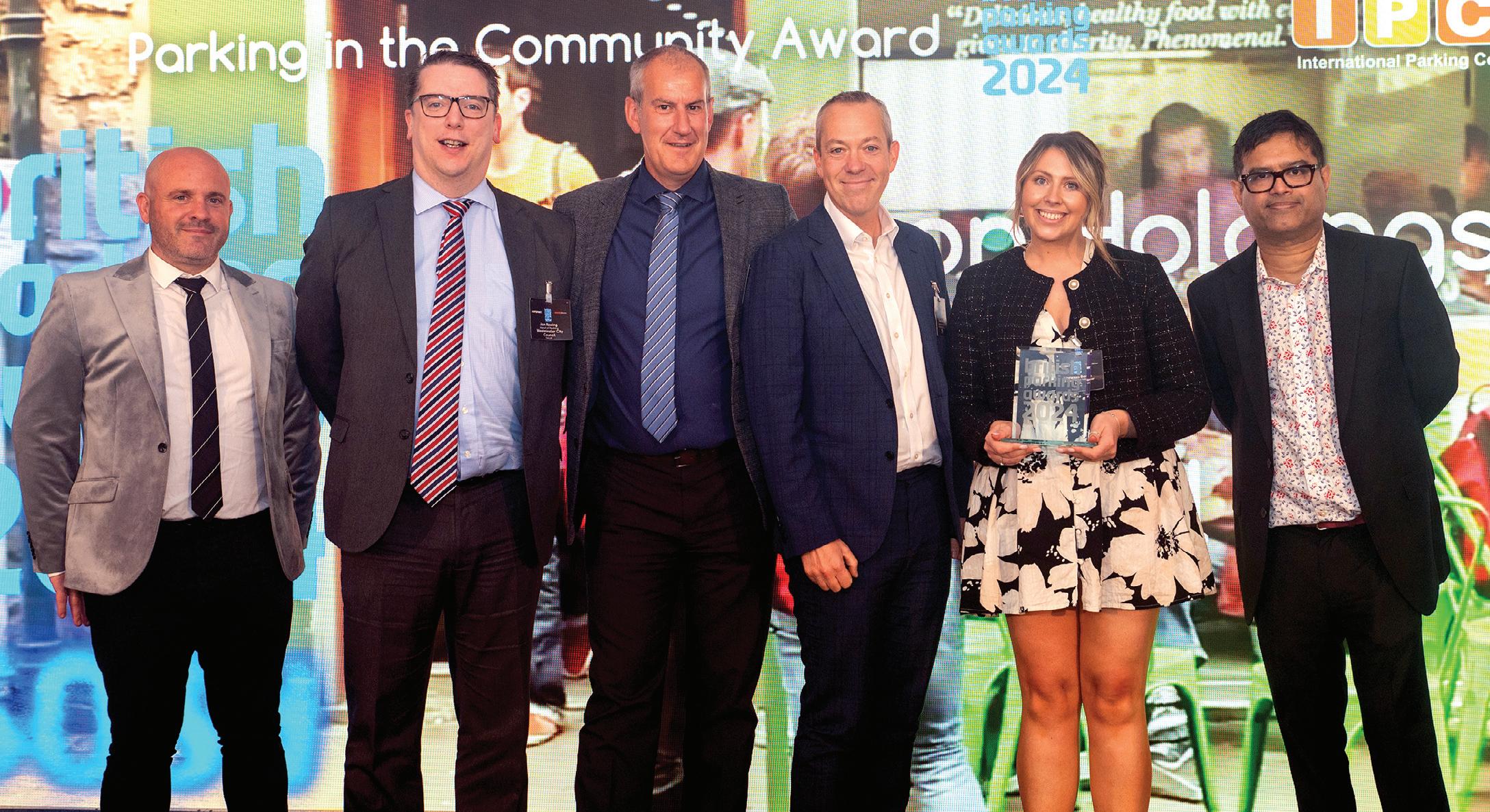
Parking and enforcement services supplier Marston Holdings operates nationwide and is committed to the delivery of social value activities across its business, supporting local communities and national initiatives. The company has, in particular, been concerned about why homelessness continues to grow and can be clearly seen on the streets every day.
Over the past four years Marston has built working relationships with a number of homeless charities and third sector recruiters, helping support those furthest from the job market back into employment. It has worked with organisations including St. Mungo’s, Radical Recruit, Beam and Social Bite.
Social Bite provides the support required from the homeless community to become work ready. It is not simply the case of preparing a candidate for an interview, it is far more than this, a safe and supportive environment in a setting in which everyone can feel socially, emotionally, and physically safe and valued. It creates the framework for personal growth, leading to a more positive mindset. Creating work environments that support our three basic psychological needs for competence, autonomy, and relatedness, benefits both the employer and the employees.
Marston’s work with Social Bite was driven by Vanessa Bartie, HR and payroll manager on the NSL Edinburgh contract and Paolo Orezzi, service director on its Westminster contract.
Bartie says: “A significant catalyst for the Social Bite project was the fact that through our day to day job roles we see the increase in the numbers of individuals sleeping rough on our streets. This is only the tip of the iceberg and there are thousands
Award sponsored by
more individuals with no permanent home either sleeping in hostels, homeless shelters, emergency accommodation or sofa surfing. Without the likes of Social Bite, employers cannot work alone in supporting the homeless community back into work.”
To date, 12 candidates from Social Bite have now joined front line teams at Marston Holdings working on contracts including Edinburgh, Westminster and Kensington & Chelsea.
Marston’s Paolo Orezzi says: “The project shows Marston’s parking teams that the company is doing something practical and proactive to help reduce the high levels of homelessness in our towns and cities. It has also helped to develop the skills of those individuals the company has recruited, none of which had previously worked in parking, but have demonstrated they have the transferable skills we look for such as working in a team, working with customers and working in a sometimes stressful environment. Most importantly, they are streetwise and know what to expect based on their own experiences.”
Further benefits were derived by existing parking teams working on contracts for Edinburgh, Westminster and Kensington & Chelsea. Social Bite played an important role throughout the project by assisting with the recruitment and training of the new employees as well as providing additional ancillary support for those returning back into the workplace. This gave existing staff a personal stake in ensuring the success of this project.
Emma Colgan-Blair, programme co-ordinator at Social Bite, said: “Social Bite and Marston Holdings have been partnering on the Jobs First Programme for two years. Marstons fully embraced the programme there too, engaging their team in training so that line managers can assist employees throughout their journey. We’ve always found Marstons to be non-judgmental, compassionate and committed to helping people succeed.”
Paolo Orezzi: “Every day we see the impact of homelessness across the UK. Our teams are out on-street, and we see homelessness in every town and city. Working with Social Bite, we help to place homeless people, those furthest away from the job market, back into the workplace.”

The International Parking Community and British Parking Association share the honours
The trade associations serving the parking sector have worked together to devise a joint code of practice for operators managing private land. The British Parking Association (BPA) and the International Parking Community (IPC) say the new single code, which supersedes their previously separate codes, will raise standards and deliver greater transparency and consistency for the benefit of motorists.
The BPA and IPC are accredited by the DVLA to run Approved Operator Schemes that enable member companies to obtain vehicle keeper data in order to collect unpaid parking charge notices issued on private land. This procedure was set up when the use of wheel clamping on private land was banned under the Protection of Freedoms Act 2012. Until now the BPA and IPC’s approved operator schemes have had separate codes of conduct.
The new code sees a greater degree of harmonisation in areas such as the sanctions that each association will impose on member operators for breaches of the code, up to the loss of access to DVLA data. The new single code:
• introduces an ‘Appeals Charter’, creating clear parameters for motorists to appeal against a parking charge
• mandates a 10-minute grace period for motorists and provides consistent rules for private parking operators
• requires clear signage to help motorists navigate parking on private land
• maintains a cap on the parking charge at £100 reduced to £60 if paid within 14 days
• ensures the protection of the most vulnerable in society, with
Award presented by
no decrease to the deterrent for abuse of Blue Badge bays or those who choose to park selfishly, putting their own convenience above the needs or rights of others.
Private parking operators need to have implemented the new single code by 1 October 2024, with all existing sites needing to be updated by December 2026.
A Private Members Bill, proposed by Sir Greg Knight MP, that enabled the introduction of a legislation-backed code of conduct gained cross-party support and received Royal Assent in March 2019. The government drew up a code that included halving the cap on tickets for most parking offences to £50 and created a single appeals system. However, this code was withdrawn by in June 2022 following a legal challenge by parking companies.
The revised government code was set to be put out for consultation at the end of May. However, former Conservative prime minister Rishi Sunak’s decision to call a general election means consultation on the new code was postponed.
Will Hurley, IPC chief executive officer says: “The new code will create positive change across the UK, enhancing the protection of the most vulnerable in society, whilst creating consistency and clarity for motorists and continuing to elevate standards across the sector.”
Andrew Pester, BPA chief executive says: “The single sector code for the private parking sector is a key milestone as we work closely with government, consumer bodies and others to deliver fairer and more consistent parking standards for motorists.”
Chris Naylor, IPC’s head of membership and relations: “This award recognises the work that both organisations have done towards bringing the Single Code of Practice effectively to a point where we can release it and launch it and implement it. It’s been something that’s been required for years, hasn’t it?
Sara Roberts, head of the BPA Approved Operator Scheme: “It’s great to see our organisations working together for the better of the motoring community, the public and the industry. We are delivering one of the government’s aims together, which is doing right by the consumer.”

‘Q’
The Parking Operator of the Year award recognises organisations that are creating a positive experience for motorists by providing easy-to-understand, nonconfrontational and person-centric services. Q-Park is one of Europe’s leading operators of parking infrastructure, with more than 706,000 parking spaces in over 3,600 commercial parking facilities across seven Western European countries. In the UK it operates in cities including London, Birmingham, Edinburgh, Leeds and Manchester. The company mainly operates off-street parking spaces it owns, as well as parking spaces run under concessions and long-term leases from public and private landlords.
Q-Park takes the safety and security of customer vehicles seriously, implementing different measures to reduce crime ranging from regular patrols, extensive CCTV coverage, bright LED lighting and customer only entrances. As well as this, the parking bays at its sites are wider than the industry average, alleviating the risks of bumps and scratches.
Customers will sometimes need assistance. At Q-Park sites they can either speak to a parking host on-site who can assist with any queries that they may have. Having a physical presence also helps provide peace of mind to customers about the security of their vehicle. The operatives can assist the customer with most queries or can call the local response number to request that a parking host urgently attends to provide customer support.
Q-Park does not believe that simply having a parking host in the car park office 24/7 provides the best value to both customers and the wider business. Its preference is that the hosts are fully
Award sponsored by
mobile within the facility undertaking cleaning tasks and also removing any person who should not be there.
Should a customer require assistance and are not able to locate a parking host, they can press the assistance button on any barrier, pay machine or help point. This will transfer them through to our 24/7 Customer Service Centre based in Leeds.
Q-Park is currently implementing technological innovations to create a seamless customer journey. A key initiative is PaSS, which is a combination of ANPR technology and PlatePay, a digital payment solution, meaning the use of a debit/credit card while at the parking facility is no longer required. Every customer who books parking receives a customer survey the day after their booking. On the question regarding whether they would pre-book parking again at non-PaSS sites the average score was 7.38 out of 10 whereas for PaSS sites it was 9.62 out of 10.
To cater for the transition to electric vehicles. Q-Park has signed a deal with Blink Charging for the installation of over 600 EV charging points across the country.
Q-Park is also at the forefront of the European parking industry when it comes to the creation of mobility hubs. It aims to develop parking facilities into vital instruments to help support urban accessibility, sustainability and liveability. In addition to car parking, Q-Park is now providing access for shared mobility schemes, electric vehicle charging, last mile delivery and retail space all within their safe and secure parking facilities.
The Park Lane Mobility Hub in Central London is a large car park underneath Hyde Park where commercial tenants include bp, DPD, Enterprise, UFODrive and ByBox.
Q-Park demonstrates that effective regulated and paid parking can make an economic and sustainable contribution to cities and society, and that a positive parking experience impacts how people enjoy their visit, journey, shopping, commute or residence.
Adam Bidder: “We are thrilled to be once again acknowledged as the top parking operator in the UK. We’ve always believed in our excellence in this field, and it’s a tremendous honour to receive this recognition from our industry peers.”

APCOA manages and provides customer services for London Luton Airport (LLA). On 10 October 2023, a vehicle fire in LLA’s multi-storey Terminal Car Park 2 (TCP2) quickly spread, causing extensive damage to the building and affecting more than 14,000 vehicles. There were no injuries but alongside the customers directly affected, the airport was severely disrupted with all approaches closed and operations paused for 18 hours.
With the airport closed, flights diverted, road access routes blocked, thousands of passengers disrupted and dramatic pictures emerging from the scene, media scrutiny was instant and intense. A joint Major Incident (MI) team was immediately convened with senior personnel from APCOA and LLA’s operations, customer services, communications and public affairs, and executive management. This team played a critical role in a fast-moving situation, ensuring accurate information was shared between all departments, and providing a conduit for high-level decision-making.
Communications responsibilities were designated:
• APCOA’s Customer Service Centre (CSC) was the hub for all customer communications on behalf of LLA
• APCOA and LLA operations teams on the ground assisted airport personnel to direct traffic and manage the situation locally, supporting customers as they returned to the airport
• APCOA and LLA public affairs teams co-ordinated all communications activity and also managing interactions with the media
• APCOA’s regional managing director, Kim Challis led liaison with insurance companies.
APCOA’s CSC provides a wide range of services, internally and externally, with a total team of 110 full and part-time employees across two locations, Wigan and Inverness. The CSC’s organisational structure is designed to manage peaks and troughs of customer interactions. One of the biggest communications challenges would be for APCOA’s CSC to manage the exceptional volume of LLA-related customer enquiries (more than 16,500 incoming customer contacts in the first fortnight) without impacting service levels for other clients. The first step was to set up APCOA’s customer management system, TOPdesk and Instant Management to prioritise inbound and outbound contacts.
Phones were already set up in hunt groups, but more agents were moved to the LLA team to handle enquiries, and others transferred to manage the rapidly increasing volume of emails. APCOA also reached out to all CSC colleagues, offering overtime and asking for volunteers to surrender days off to help, which ultimately led to a 24-hour working team handling all inbound contact for 10 days.
Consistent communications were essential to avoid further confusion for customers. In the aftermath of the fire, the Major Incident team held regular calls to clarify the situation on the ground, and to share the CSC’s feedback on incoming contacts and priority questions to be answered. A decision was quickly taken to use the APCOA and LLA websites as the key channel for customer information, supported by social media posts to encourage customers to monitor the websites for updates.
An FAQ document was created as the ‘single point of truth’ across both organisations and this was continuously updated with old versions deleted. Both companies’ websites were updated every time there was a change – in the early stages, this could be many times a day – and the information was also used by the joint public affairs teams to respond to a high volume of ongoing media enquiries.
Michelle Clarke: “The enormous fire at London Luton Airport was a major incident. APCOA worked in conjunction with our partners at London Luton Airport to cover all the communications. We’re really proud because there were lots of other good stories and good competitors up for the award. So we’re really chuffed.”

The London Borough of Haringey is focussed on providing a Blue Badge service that meets the needs of residents with disabilities. Since winning the Parking Technology Award in September 2023 for the work the council has done to tackle Blue Badge fraud, the borough has evolved its accessible parking offer by working collaboratively with residents to shape existing schemes and priorities for the future.
One of the strategic objectives highlighted in the council’s new Parking Strategy is “supporting residents with additional needs” through:
• prioritising parking for those with mobility needs and safeguarding provision and reducing fraud
• focussing on policy and programmes which adequately capture the needs and concerns of residents and other road users with additional parking
• measures required to ensure disabled parking provision is placed in the most appropriate location, of an appropriate standard (numbers and size of bays).
The work the council has done to support disabled and vulnerable residents includes introducing a new resident Care at Home Permit – a free paper permit for residents who receive care in their home. Working with residents across the borough, the council took steps to ease the pressure on individuals who need vital home support and care on a daily basis. Residents also helped to develop the application process that makes it simple for them to apply and removes the need for additional assessments or intrusive questions.
Award sponsored by
The council launched the Care at Home Permit with e-mails to specific residents and organisations as well as press releases, social media and its own newsletter, as well as attending meetings of disability and carers groups.
Cllr Seema Chandwani, Haringey Council’s cabinet member for resident services and tackling inequality said: “Residents often tell me of the stress and cost of making sure their carer has a parking permit so they can park outside their home to deliver vital care needs. We have worked hard with these residents to understand their needs and have developed this new permit to help them whilst also taking anti-fraud measures. Co-producing services and solutions with our residents is a top priority. This development is a perfect example of how working with our residents and partners in the health and care sector can lead to improved and more equitable outcomes.”
Other initiatives designed to support disabled residents include:
• promoting and prioritising dedicated disabled bays and making existing bays longer
• introducing a new Concessionary Travel Helpline
• introducing a new Blue Badge fraud reporting service
• making it easier for residents to park with the council’s virtual Blue Badge permit, further reducing the likelihood of theft.
• working with IT supplier Taranto Systems to develop an online system that makes the Blue Badge application quicker and easier, including real-time status updates and online debit and credit card payments.
• removing the £10 replacement fee for stolen paper Blue Badges
• introducing a fraud line and online form where residents can anonymously report if they have been offered a Blue Badge for sale, or if they know someone who is selling one.
Abdul Sahed: “At Haringey we invested a lot in engaging with our residents to really understand their requirements and needs. We have made lots of adjustments in our policy and our on-street facilities to help them get around the borough and make life accessible.”
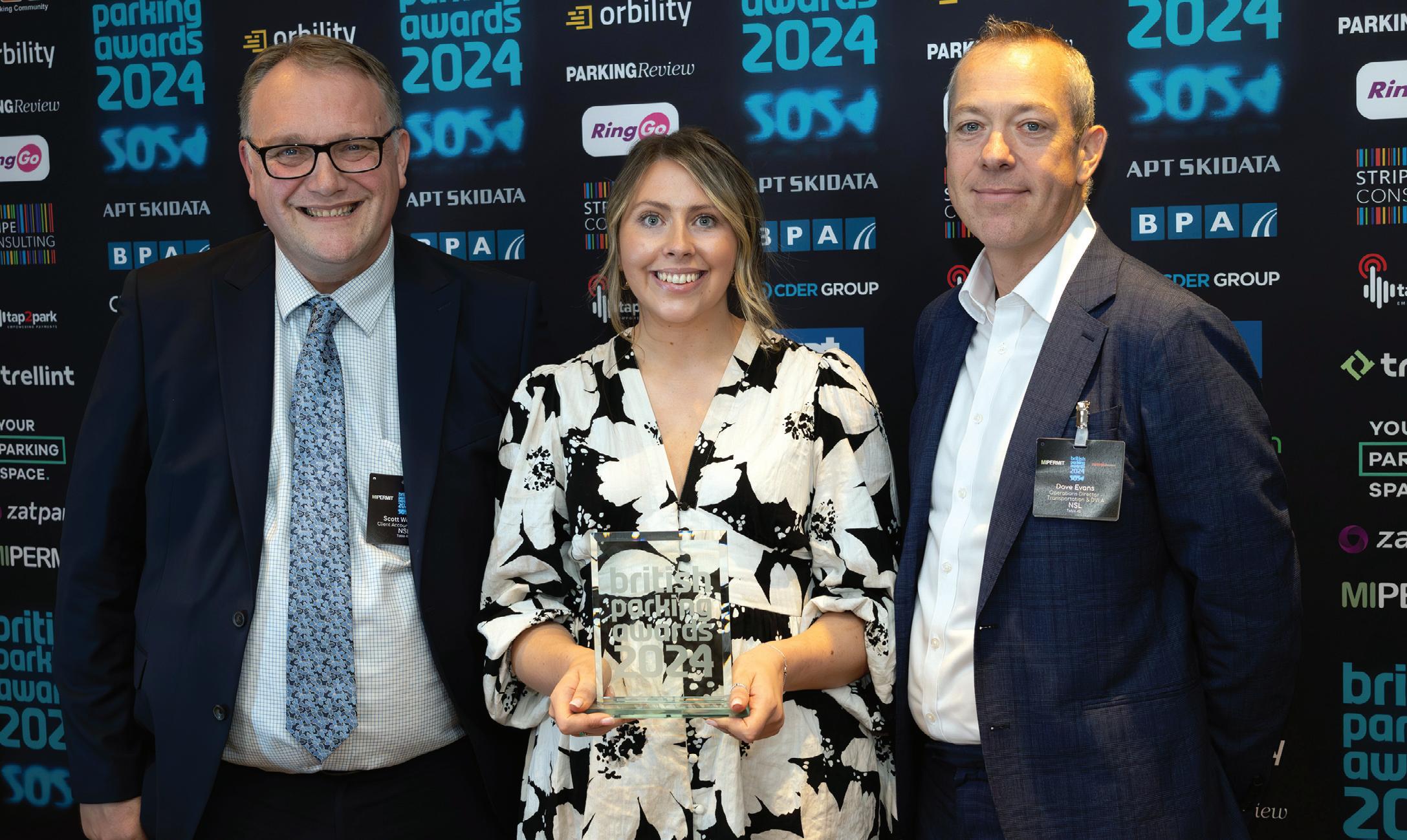
The Transport Scotland Act (2019) introduced a pavement parking ban that aims to enhance the inclusivity and accessibility of streets. To plan for implementing the ban on pavement parking, City of Edinburgh Council approached Project Centre to assist it in developing a pavement parking enforcement methodology.
To enhance the council’s understanding of pavement parking levels across the borough and to inform the following enforcement strategy, Project Centre developed a comprehensive road study, assigning a Red/Amber/Green (RAG) categorisation for each road based on pavement parking levels as described below:
• Red: Significant levels of pavement parking currently taking place and may need consideration of mitigation measures.
• Amber: Moderate levels of pavement parking currently taking place, however pavement parking could be prohibited with minimal impact.
• Green: No pavement parking taking place and pavement parking can be prohibited.
The council and consultant adopted a collaborative approach, which helped develop an innovative methodology. The assessment covered 5,185 roads in the City of Edinburgh Council area. This required multiple teams to complete assessments on time and within budget. The involvement of different staff introduced a risk of inconsistent assessment.
The Project Centre team proactively recognised this issue and worked collaboratively to understand where the inconsistencies could occur and how to solve these.
Ensuring that the RAG methodology was clear, objective
and transferable significantly minimised subjectivity in the pavement parking assessment.
Based on Geographical Information Systems (GIS) and its granular assessment, Project Centre recommended mitigation measures to ensure roads’ accessibility (e.g. introduction of parking bays, footways widening, introduction of road markings and exemptions). Project Centre’s detailed visualisation drawings and reporting helped ensure the clear presentation of the pavement parking levels was communicated relevant stakeholders, funding bodies and the public.
The City of Edinburgh Council became the first Scottish local authority to enforce pavement parking, starting from January 2024. Parking enforcement in Edinburgh is undertaken by NSL, another Marston Holdings company. The council tasked NSL to enforce the pavement parking legislation in problematic areas identified by the assessment.
NSL communication and engagement officers worked with Project Centre and the council to develop informative flyers and public-facing letters, aimed at raising public awareness of pavement parking. The officers used Project Centre’s RAG classification to actively monitor the most affected streets, issuing 2,232 warning flyers and a further 504 targeted flyers in the prolific area.
As Edinburgh was the first local authority to enforce the ban, NSL’s officers completed a dedicated training programme designed and delivered by NSL Edinburgh’s in-house trainer, who also delivered the training to the city council parking team to provide guidance on the new legislation, as well as giving them the expertise to effectively enforce contraventions.
Scott Wallace: “Winning the Better Streets award is recognition of the collaborative approach taken by City of Edinburgh Council, Marston Holdings, Project Centre and NSL and to change people’s thinking about parking on pavements. The great work we’ve done has been a team effort.”

Project Centre is an engineering and transportation consultancy designing places for the people who use them. One of its key services is traffic design and management. The multi-disciplinary team consists of over 46 members of staff, including traffic and parking engineers, consultants, transport planners and Traffic Order specialists.
Scott Lester is technical director for the parking and traffic teams. He is supported by Mike Ager, who leads the traffic team, and Olaseni Koya, who leads the parking and traffic order teams.
The parking consultants and engineers support local authorities in resolving key issues and concerns around road safety, air quality and kerbside demand issues. The majority of the team are either members of, or working towards attaining, memberships of institutions including the Chartered Institute of Highway Technicians (CIHT), the Institute of Civil Engineers (ICE) and the British Parking Association (BPA).
Project Centre’s 25-strong parking and kerbside management team works on controlled parking zones, parking policies and strategies, kerbside management solutions such as disabled bays, parking surveys, moving traffic schemes and school street schemes.
Included among the programmes the team has delivered is the Medway Healthy and Safer Streets, which involved a rolling implementation programme of measures including school streets, moving traffic enforcement support and ‘red route’ implementation across the Kent authority’s area. The first of the schemes have been introduced around the Deptford and Catford areas with
further areas around Evelyn to be implemented later this year.
The Lewisham Sustainable Streets programme has seen the roll-out of active travel measures including controlled parking zones, tree planting, EV and car club solutions to help improve sustainable travel modes across the borough. The first of the schemes have been recently introduced around the Deptford and Catford areas with further areas be implemented.
The 25-strong traffic modelling and active travel team, overseen by Mike Ager, are experts in the design of successful and safe cycle and pedestrian improvement schemes focussed on reducing rat-running and encouraging sustainable travel. They work on drafting and preparing successful funding bids and take projects through from concept to construction. This team has been at the forefront of designing and influencing behaviour change towards active travel for over a decade. They designed active travel routes during the 2012 London Olympics and implemented the Waltham Forest Mini-Holland project, and have worked with Active Travel England on schemes.
Project Centre’s Traffic Order team provides support for various councils across the UK including London boroughs, City of Edinburgh Council and Cardiff Council. The Traffic Order team is led by Amanda Jones, who has over 35 years of experience in the Traffic Order sector and public realm changes.
The Traffic Orders team facilitated Oxford Street public realm changes which aim to improve the public realm and active travel elements in the city. The team also drafted Traffic Orders for the first bookable loading bays in Southwark.
It worked on borough-wide 20mph schemes in Waltham Forest which have introduced this speed limit to improve road safety. It has also worked with Waltham Forest and the Department for Transport to design bespoke electric vehicle bays for residents within the London borough’s controlled parking zones (CPZs).
Olaseni Koya: “Project Centre has delivered some really amazing schemes, from healthy streets and livable neighbourhoods to moving traffic enforcement and school streets. We help deliver some schemes which have changed lives and improve communities. The future is bright.” Award sponsored by


The Peterborough Borough Council and Imperial teams receive the Technology Award from sponsor Tap2Park’s Duane Hodges-Stubbs
Managing vehicular access to sensitive zones such as school streets and pedestrian-only areas presents ongoing challenges in many urban areas. These areas are intended to promote safety, reduce congestion, and enhance the environment for pedestrians and cyclists. However, unauthorised vehicles disrupt these goals and create issues for both residents and businesses.
In Peterborough residents and businesses alike expressed concerns over the impact of unauthorised parking and traffic violations on community safety, air quality and the overall quality of life. Complaints about congestion, obstruction of pedestrian routes, and the inconsistency of enforcement had become frequent. Traditional enforcement methods, relying heavily on manual patrols and spot-checking had proven inadequate and resource intensive. Peterborough Borough Council staff faced challenges in efficiently identifying and penalising vehicles without valid permits or exemptions. Manual management of whitelists and exemption lists were prone to errors, leading to the issuing of unjustified penalty charge notices (PCNs) and unnecessary appeals from frustrated residents and businesses.
These concerns prompted the borough to explore more effective and automated solutions. This led to the council working with Imperial to implement the PermitSmarti solution.
PermitSmarti was designed to address these issues by offering motorists with a streamlined exemption application and management system and automating enforcement by integrating with real-time ANPR cameras. PermitSmarti also integrates seamlessly
Award sponsored by
with Peterborough City Council’s existing Imperial 3sixty notice processing software for the management of penalty charge notices (PCNs).
One of the most difficult and labour-intensive tasks associated with traditional ANPR enforcement is the management of whitelists. Manually managing whitelists is labour intensive due to the constant need for updates, accuracy checks, and coordination among multiple personnel, all of which require considerable time and effort. The process is prone to errors and inefficiencies, making it challenging to maintain a list’s integrity.
The Imperial solution automates this, enabling motorists to apply for and manage their exemptions electronically. When PermitSmarti grants an exemption, this is automatically communicated to the cameras without the need for council intervention. This means that the cameras can identify where a vehicle is not committing a contravention, reducing the workload for council staff by eliminating the need for manual intervention and video reviews. Peterborough has thus been able to enforce its school streets and pedestrianisation zone without having to recruit any additional staff.
In parallel to adopting PermitSmarti, Imperial has supported Peterborough’s enforcement of moving traffic regulations. On 22 July 2023, Peterborough City Council, alongside 39 other authorities across England and Wales, was granted enforcement powers under Part 6 of the Traffic Management Act 2004 by Parliament. Before this date, the police carried out this role alongside its serious competing priorities.
Peterborough has now adopted Imperial’s 3sixty Notice Processing Moving Traffic Enforcement module for the management of MTE penalty charge notices. The council has been enforcing MTE contraventions and managing exemptions using PermitSmarti since February 2024.
Adam Payton: “Peterborough Borough Council has been working with Imperial. We offer a seamless approach to exemptions using its permits products so that our customers can self-serve. This helps us deliver parking and moving traffic enforcement without needing additional resources.”
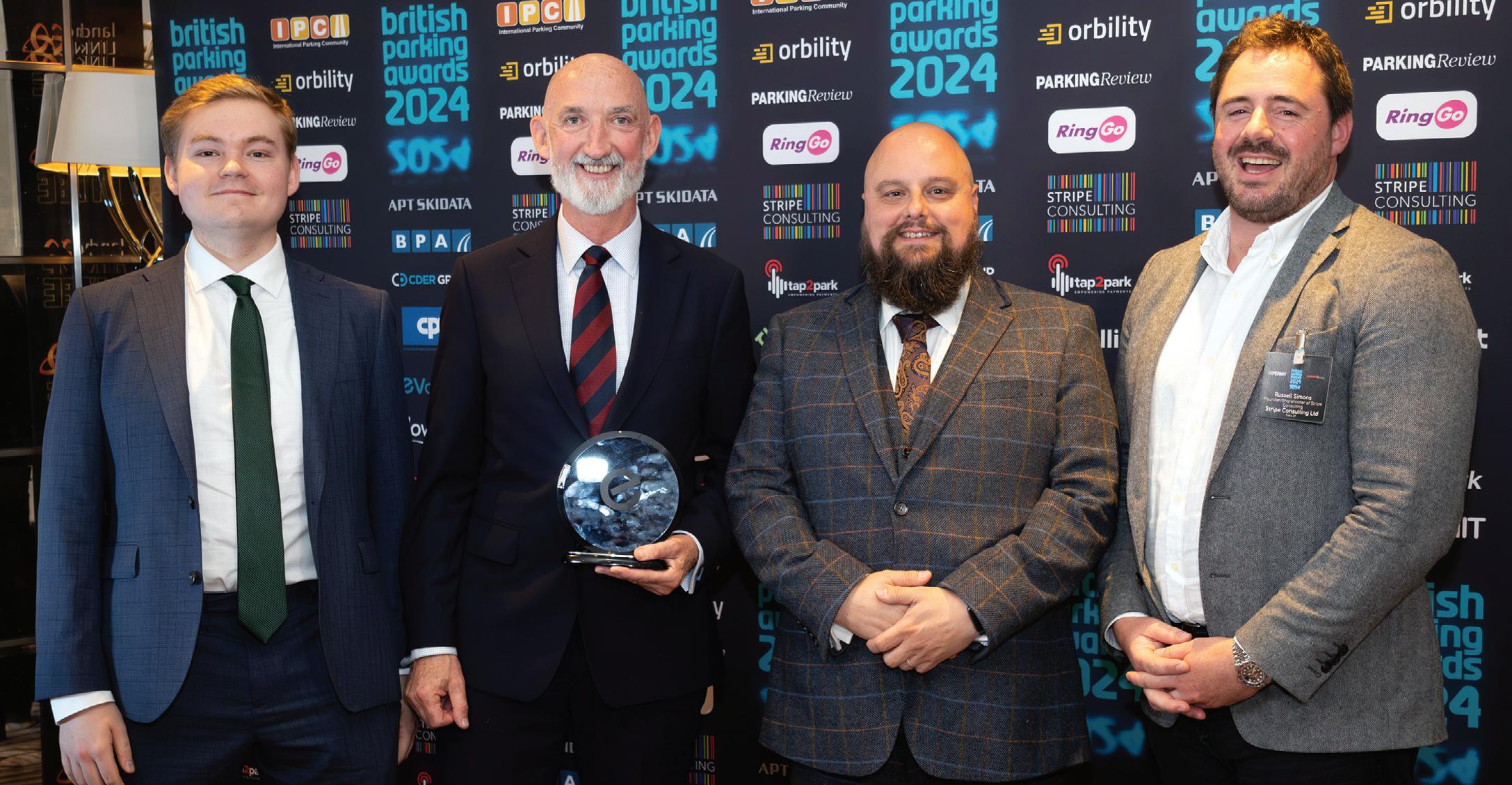
Cambridge City Council has partnered with Connected Kerb, a UK provider of EV charging infrastructure, and parking specialist Stripe Consulting to establish a comprehensive public electric vehicle charging network. The phased deployment plan will see over 600 EV chargers installed throughout Cambridge.
The project aims to increase the adoption of electric vehicles locally and contribute to reducing carbon dioxide emissions. This initiative aligns with the council’s goal to reduce carbon emissions and achieve a net zero Cambridge by 2030. Cambridge, known as ‘Britain’s Cycle City,’ is also advancing its commitment to sustainable transport through the partnership.
The EV driver user group in Cambridge includes residents, business owners, and visitors who own or use electric vehicles. This project also supports the decarbonisation of the council fleet, transitioning approximately 100 light goods vehicles from internal combustion engines (ICE) to electric vehicles (EV).
The 15-year public-private sector collaboration sees Connected Kerb deploying and maintaining a fully serviced EV charging system across the city’s off-street parking facilities. The scheme is fully funded by third parties, utilising a combination of OZEV (Office for Zero Emission Vehicles) and LEVI (Local Electric Vehicle Infrastructure) funding, along with contributions from Connected Kerb. The council thus benefits from a no CAPEX/OPEX (Capital Expenditure/Operating Expenses) model.
Given Cambridge’s significant conservation heritage, the col-
Award sponsored by

laboration has focussed on designing EV charging points that blend with the environment, support future technologies like 5G and air quality sensors, and protect car park assets.
Stripe’s engineers conducted comprehensive reviews to ensure the integration of EV units did not compromise the structural integrity of the car parks. This process involved input from fire consultants, M&E consultants, and coordination with the fire brigade and insurers to ensure safety and asset protection.
Now in its second year, the project has expanded from four to 110 active EV chargers at key sites around the city centre. And the new Park Street car park will feature 225 EV charging bays, both live and passive, to meet future demand.
The delivery programme has initially targeted various central city locations to cater to different user needs with 24-hour access to charging points:
• Queen Anne Terrace (QAT) Car Park: This location serves visitors, staff, event attendees, sports enthusiasts, and business professionals. QAT has also been identified as a centralised EV hub due to its prominent city centre location.
• Grand Arcade Car Park: This car park supports shoppers, leisure visitors, and city centre tourists, facilitating easy access to charging for those visiting central shopping, leisure and historic areas.
• Grafton East and West Car Parks: These car parks are designed for those visiting the Grafton shopping centre, independent retailers, and nearby leisure facilities.
• Park Street Car Park: This location supports the charging needs of those involved in new developments, university activities and retail operations.
The second phase of installation focusses on creating equitable access to EV charging for residents in purely residential areas without driveways.
Sean Cleary: “I think this is a great example of tri-partnership working to ultimately deliver a solution that will benefit local residents at Cambridge City Council – not only residents, but also supporting businesses and events that are undertaken within the city centre.”

Parkopedia’s In-Car Payments service is an innovative solution that provides a neutral in-car platform for transaction providers. This industry-first platform enables drivers to find and pay for on-street and off-street parking, activate and pay for ‘pay-at-thepump’ fuelling, pay for automated road and smart city tolls, and accurately locate, activate, and pay for EV charging.
Since the launch of In-car Payments, Parkopedia has the most in-car payment solutions in production globally, thanks to continued coverage improvements and strategic partnerships with the likes of Mercedes-Benz, Hyundai and Škoda.
In-car payments are transforming the future of transportation, with advanced payment systems simplifying the process of paying for vehicle-centric services from within the car. According to Precedence Research, the global in-vehicle payment services market is projected to reach $19.66 billion by 2032, growing at a CAGR of 16.2% from 2023 to 2032. Parkopedia’s 2023 Global Driver Survey revealed that 64% of motorists worldwide value in-car parking payments, highlighting that there is already strong demand for such services.
Having a seamless in-vehicle solution addresses the inconvenience of needing to rely upon multiple smartphone apps or having to find working payment meters and the associated fragmented and often frustrating user experiences.
Even many new integrated solutions have provided poor UX (user experience) and unnecessary complexity, distracting drivers and delivering subpar experiences. Parkopedia’s In-Car Payments
Award sponsored by
service addresses these issues by adding security and convenience to the driving experience.
This integrated, PCI-compliant platform is currently the only Single Sign-On multi-parking vendor solution in mass production within the automotive industry. It simplifies the aggregation of multiple suppliers and payment providers into one API, offering extensive coverage for OEMs. For drivers, the platform consolidates multiple global merchants into one account, streamlining payments for vehicle-based purchases and delivering a superior level of connected services.
The platform does not compete with transaction providers, but rather provides a neutral integration platform for payment providers to easily offer their services to drivers directly inside their vehicles as a line-fit solution – allowing the driver to pay for parking, fuelling, EV charging and tolls from the comfort of their vehicle, without the need for any additional authentication.
Deep integration also works with vehicle sensors to enable a seamless experience – which is not possible to achieve with disconnected smartphone alternatives. This allows for interaction between vehicle sensors and transactable locations, increasing driver engagement as the vehicle highlights where the driver can digitally pay for parking at specific locations where they can prebook based on ETA or range. Also, once notified of low fuel, or low charge, drivers are presented with live fuel and charging pricing and guided to their preferred stations.
When at the location, the platform activates the pump or charger, initiates transactions and manages payments from the vehicle’s head unit with any loyalty benefits automatically applied and e-receipts generated to enable expense submissions. The platform unlocks new service markets for automakers to create tailored in-car user experiences and enables improved sales performance for service providers.
Lewis Johnson: “I think we’ve won this award because we’ve delivered innovative solutions at scale to millions of drivers around the world that’s made the journeys of parking and fuelling so much easier. We’re making journeys in and out of work, or to places of leisure, a lot easier.“

Blackpool Central is a multi-storey car park built as part of a £300m regeneration project site in the Northern coastal resort. The vision for the former Blackpool Central Station site is for an interconnected collection of all-weather leisure attractions, hotels and public spaces, liberally interspersed with a multitude of places to eat and drink throughout the daytime and evening.
The wider brief was to develop a major leisure destination at the heart of Blackpool that is of national significance and which will provide a compelling new reason to visit the town throughout the year. The development is aiming to be a world class facility designed to minimise the impact of poor weather and offering a new, all year round reason to visit the town.
The development land will be released and supported by the construction of the new Blackpool Central MSCP.
Ballast Nedam Construction was selected to deliver this project alongside the design services of Stripe Consulting. The project brief was to redevelop an existing surface car park located over the original railway lines, sidings and site of Blackpool Central Raiway Station, to provide a 1,300-space multi-storey car park.
Following the main build, Blackpool City Council instructed Stripe Consulting to design, and Ballast Nedam Construction to deliver, client fit out items such as the on-site office spaces and installation of CCTV, variable message signs, and additional
Award sponsored by
security measures.
Stripe and Ballast Nedam Construction worked collaboratively with Blackpool Council to understand its needs and develop a solution for the site to deliver an exceptional facility that transforms the site.
The project had additional complexities due to the site’s previous use as the Blackpool Central Railway Station. The scope of works was wide and varied throughout the build consisting of:
• contaminated ground removal, reclamation and processing
• demolition of below ground railway structures such as old sidings, disused buildings, fuel tanks and buried railway turn tables, through to in depth civil engineering works to retain highway structures and create new highways
• steel and precast concrete erection with the use of specialist cranage equipment.
• mechanical and electrical (M&E) works including base build requirements and also the operating entities fit out requirements which included additional electric vehicle charging units through to parking management systems
• specialised aluminium cladding to all façades and concrete cores.
The construction budget for the car park project was circa £26m with final build costs circa £28m following additional ground works requirements. This was funded by Universities Superannuation Scheme (USS) and developed by Nikal developments. This budget included the professional fees for Ballast Nedam Construction, Stripe and the other design team members from tender stage to completion.
Russell Simmons: “My team and colleagues were able to deliver what is ultimately a fantastic building project for Blackpool City Council that is part of a massive regeneration scheme. It’s been a complete joy to work on as a project for about three or four years.”

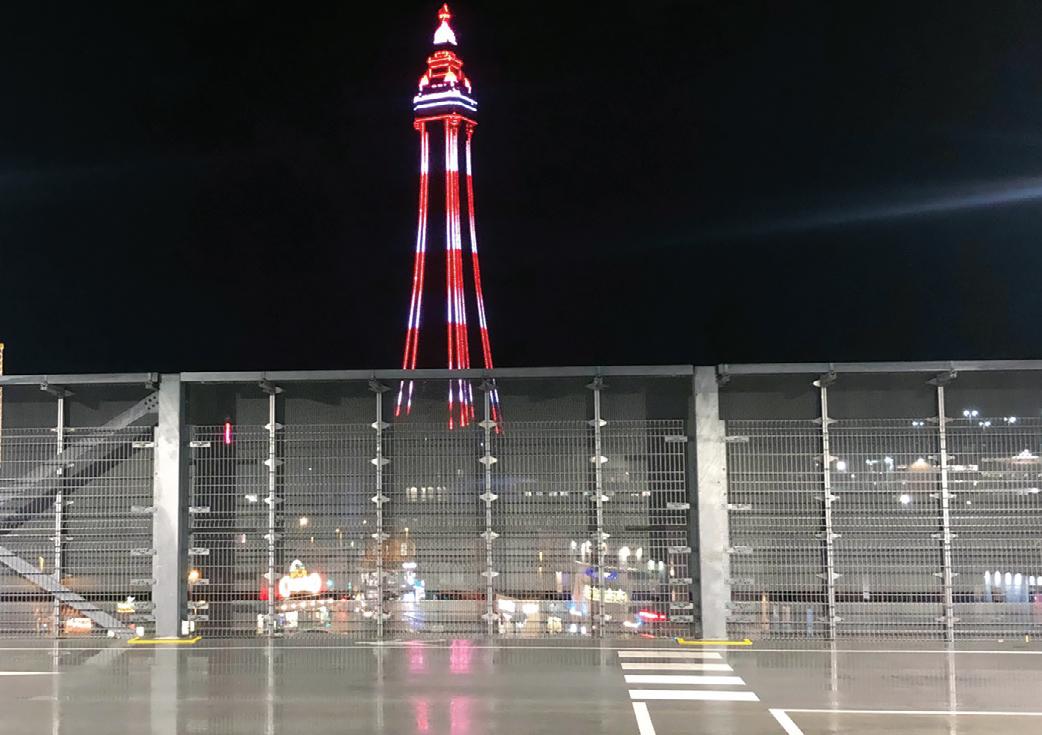


Blackpool has a long and rich history, which provided the team at Stripe Consulting with plenty of architectural influences to draw upon when designing the Central car park. As the multistorey is part of a scheme to regenerate the area, the key was to create a clear modern ‘architecture of place’ that was recognisable as itself in the landscape, while still referring to nearby architecture without becoming a ‘poor imitation’.
The main architectural feature in the local area is the Blackpool Tower, with its clear structural geometric features. This theme has been mapped into an abstract pattern for car park’s cladding, with differing materials and gaps used to reflect the tower’s geometry. Due to the desire to create a secure car park, the cladding design needed to be a ‘full wrap’ option.
The façade’s angular patterns add 3-dimensional relief to the structure, resulting in large elevation areas that offered the opportunity to introduce exterior lighting effects. The lighting scheme will evolve as the masterplan for the car park’s locality takes shape in the years to come.

FIL Investment Management is a leading provider of financial services. The company headquarters are at the Kingswood Fields campus in the Borough of Reigate & Banstead, Surrey. When it came to commissioning additional parking for the campus site, a decision was taken that rather than build a new one multi-storey, an existing structure would be retained, refurbished and expanded.
The three-span, three-storey precast concrete car park was built in 1998. It was decided that a new steel and concrete deck should be built over-spanning the existing concrete structure, together with a new four-storey side extension which required excavating into the existing embankment and providing a contiguous piled retaining wall on two sides. Short bridges would link the new car park to the existing car park.
No future additional loadings were allowed for in the original precast design. meaning that the new deck needed to be supported on columns founded at ground level around the perimeter of the existing structure.
Bourne Parking’s lightweight Montex system was selected for the superstructure. The extension to the Fidelity Kingswood car park has turned out to be one of the most complex projects Bourne Parking has ever undertaken.
Adding to the complexity was the fact that the car park footprint lies within an ancient woodland and required careful management throughout the build sequence in line with the strict planning and environmental constraints.
The modular Montex frame and floor system was adapted to provide a bespoke solution that could fit in and around the existing concrete three-storey car park.
The parking layout and circulation routes follow the existing logic of internal ramps connecting the separate decks as they step down the hillside. The new upper decks and increased capacity required the addition of four new staircases, constructed with lightweight steel frames to minimize the impact on the immediate environment.
As main turnkey contractor for the project, the scope of works Bourne delivered also included heated vehicle ramps, anodised aluminium fins to the elevations, a new electrical substation to power 40 EV chargepoints and the complete strip-out and replacement of the M&E.
The scheme comprises 778 tonnes of structural steelwork and 6,800m2 of Montex floor planks.
The footprint area of the car park before works began was 3,241m2. Upon completion of works, the footprint saw an increase to 4,919m2.
There are 725 standard spaces, which include 39 electric vehicle charging bays. The existing spaces remain at 2.3 wide x 4.8m long, with the new parking deck accommodating for today’s larger vehicles at 2.4m wide x 4.8m long. The car park layout provides a simple, user-friendly circulation route with one-way traffic flow.
The shape, arrangement and colour of the cladding (anodised aluminium fins) uses a woodland colour palette which is respectful of its surroundings. The car park has a strong vertical emphasis, with a layered approach that adds depth and variety to the façades, combining openness with a homogenous overall appearance.


The vision for the vertical fins was to blend in with the surrounding trees, to mimic the stature of tree trunks. In the original concept, they contained a woodgrain effect, but the decision was made to remain with brown, randomly placed vertical fins to resemble the natural effects of the neighbouring woodland.
The construction process
The suspended parking deck structure combines a bespoke galvanised steel frame with quality, pre-finished concrete slabs. The main clear span column grids are 6.9-metres on the external elevations and 6.9-metres on the internal spine line. Minimum clear headroom throughout the car park, including for tolerance and deflection, is 2.1-metres but vehicles are restricted to 2-metres headroom due to the existing structure.
The new structure was built with the minimum clearance of 2.1 metres to provide a more open and less claustrophobic feel. The intention to make the car park feel less enclosed, and lighter and airier. The main columns are designed to withstand vehicle impact loads without the requirement for additional protection.
The elevation treatment comprises of anodised aluminium fins. The aluminium fins are fixed to the structural frame via galvanised steel horizontal box section rails at typically 2-metre vertical centres.
The stairs are solid galvanised balustrades which provide a continuous ribbon effect from the outside.
The project uses Bourne’s Montex Clear Span precast modular frame technology, providing a modern, safe, user-friendly car park. The car park building comprises a galvanised structural steel frame with Montex concrete floor slabs.
Typically, the Montex slab is most efficient on a 2.4-metre wide module, but part of the challenge for Bourne Parking was that the existing 1998 car park was built on a 2,300mm module, that is, the parking bays were 2,300mm wide. The new car park was to be built with spaces 2,400mm wide. These two sizes do not readily modulise themselves. Further challenges were presented by needing the new ramps to line up with the existing ramps. However, the Bourne Parking Montex system is flexible enough
Award sponsored by
to adapt around all the fixed points and varying Montex widths were easily accommodated.
The Montex slabs are provided with three different surface finishes to the top of the slab (tamped, brushed and trowelled), dependent on location within the car park.
The parking floors are served by four independent flat-roofed stair towers, providing pedestrian access from the grade level to all parking decks, with steel plate treads, risers and landings.
Three sides are wrapped in bespoke precast concrete wall units, with the open face closed off with grey PPC steel mesh.
A dye was used in the precast concrete wall units, producing a bespoke colour effect in line with the surroundings.
Stairs 1 & 2 are near the existing trees and to minimise the amount of piling adjacent to tree roots. Bourne eliminated any blockwork, and the stair cores are capped with a flat steel roof.
The over-deck to the existing car park is finished with a highperformance polymer modified asphalt waterproofing system, providing a durable finish.
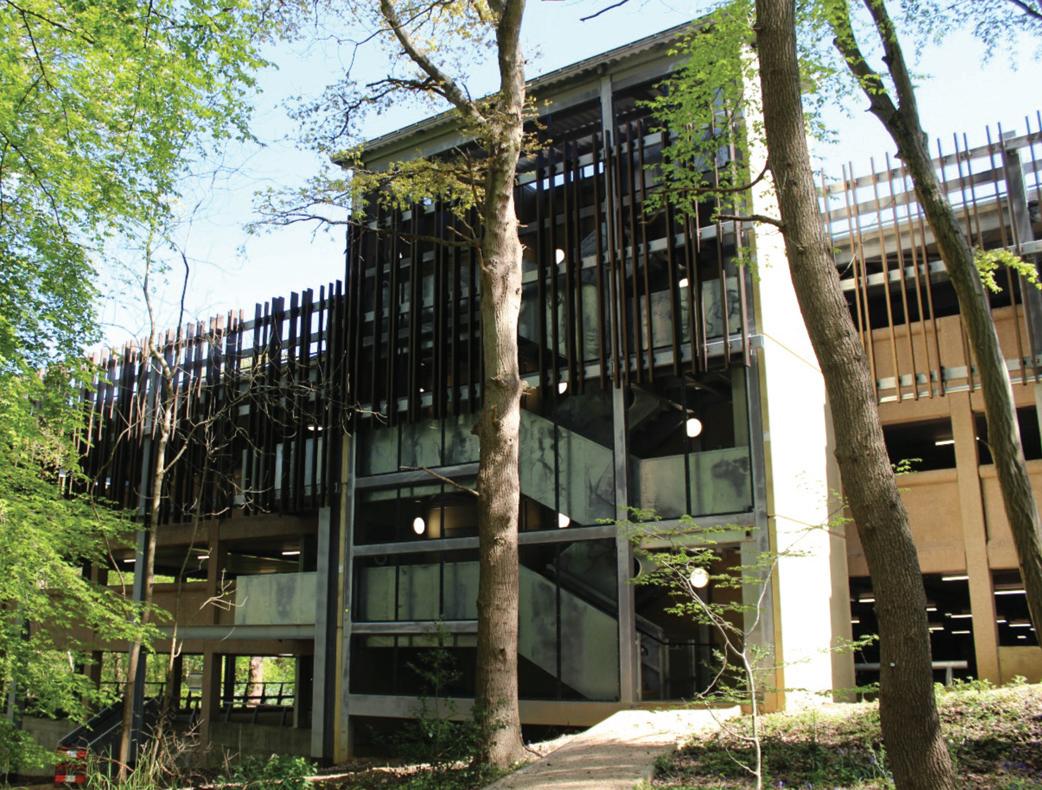
Karl Butters: “We won this award because of the sustainability aspects of the project. We built over an existing car park set in an ancient woodland. The team that worked on the scheme did very well. We also won a British Parking Award back in 2021 for a car park scheme at Hatfield.”

Located in the heart of Wokingham Town Centre, The Plaza Shopping Centre is a fully let mixed-use retail and leisure development. The busy retail quarter is home to a large Nuffield Health and Wellbeing Gym, several restaurants, office accommodation and six residential flats.
The variety of uses at The Plaza Shopping Centre sees its multistorey car park serve all members of the local community including visitors, residents, business owners and employees. Across five levels, the car park provides direct access into the development as well as the bustling town centre. Spaces are also available with permit parking for residents.
In high demand, The Plaza Shopping Centre’s car park was in urgent need of renovation to ensure it could continue to meet the needs of the local community and businesses. Constant traffic and exposure to the elements had caused many stresses and problems, exacerbated by a failing waterproofing system throughout the structure. This was having a detrimental impact on the car park’s appearance, functionality and safety.
The environment was dark and unwelcoming with delamination prevalent throughout the entire structure. The top two decks, which served the gym, were heavily degraded and corroded with potholes creating health and safety risks. Water ingress was also plaguing the levels below. These issues required the car park’s roof deck, inter-decks, and the main entrance and exit ramp to undergo significant repairs and improvements.
Adding to the challenge, a £1.7m renovation had to be carried out while the car park remained open, requiring meticulous planning and collaboration to minimise any potential disruption.
Aviva Life and Pensions UK commissioned property agent Colliers International to oversee the refurbishment. Cemplas Wa-
terproofing & Concrete Repairs was appointed as renovation contractor, using WestWood Liquid Technologies products.
On the car park’s 3,330 square metres roof deck, the failing waterproofing system was stripped back using specialist ‘ride on’ planing machinery designed for use in muti-storey car parks. To suppress noise and dust, the plant was fitted with water drums that dampened down the deck and silencers to reduce noise, and the works were coordinated to minimise disruption to the shopping centre trade and local residents.
The preparation method ensured the existing coating could be fully removed without damaging the concrete roof slab. The process exposed a significant volume of concrete repairs, partially chloride driven, due to the failure of the existing membrane. Concrete defects were also identified on the internal decks, soffits, columns and walls throughout the structure, leading to more than 25 tonnes of defective concrete being broken out. These challenges were discovered across the whole car park and the same solutions implemented.
Once the defective concrete and coatings were removed, they were taken from the roof deck to a secure site compound area and carefully managed. Dedicated skips ensured the concrete could be separated for recycling and the coatings did not mix with recyclable materials.
Following the preparation of the concrete slab, the defective concrete areas were reinstated using specialist repair mortars. To add longevity to these defective areas and address corrosion concerns, sacrificial anodes were installed to the reinforcement.
Prior to installing the waterproofing system, trials were carried out to test the adhesion of the existing and repaired concrete substrate. This identified significant outgassing likely caused by trapped moisture and air in the existing concrete matrix.
An ultra-low viscosity substrate stabiliser from WestWood Liquid Technologies was used to seal the concrete slab, eliminating the outgassing problem at source and the risk of pin holes through the decking. Westwood’s crack-bridging waterproofing system, wearing layer with quartz sand broadcast, and coloured sealer coats were then applied to the entire roof deck.

To address substantial ponding and remove standing water across the top deck, Cemplas also installed new drainage outlets at low points.
The waterproofing of the top deck eliminated water ingress allowing Cemplas to begin work on enhancing the lower levels. Concrete repairs and resin injection crack repairs were carried out followed by the application of anti-carbonation paint coatings.
Rigorous cross hatch testing was undertaken, followed by sample areas of adhesion enhancing primers to ensure a strong bond between the existing paint coating and new anti-carbonation coatings. These coatings protect the structure from the underside while the waterproofing system protects from the top.
The inter-decks received resin deck coating enhancements, addressing numerous defects in the existing waterproofing and achieving slip-resistance requirements.
The lower car park deck, serving as the roof to The Plaza Shopping Centre, comprised ageing asphalt which was repaired and overcoated with a WestWood liquid waterproofing system. A comprehensive electrical package added to the project providing a new lighting scheme throughout the car park and the internal stairwells. Featuring new LEDs and motion sensors, the lights optimise safety and energy efficiency.
To further enhance the car park’s appearance and make it more user-friendly, Cemplas relined every parking space, redecorated the internal stairwells to brighten the space, and installed a new floor finish to the lift lobbies. Ensuring fire and DDA compliance, windows and doors were overhauled, and nosings added to the stairs.
Award sponsored by

A waterproofing solution was provided for the main entrance and exit ramp, using a buried WestWood liquid waterproofing system finished with a tarmac wearing layer. The failing and blistering asphalt was removed and taken off site for recycling. The concrete substrate was repaired and levelled using a rapid setting repair system to speed up the process.
Cemplas kept the car park operational throughout the works by introducing a highways authority approved traffic management system from the main road into the multi-storey car park. This created a safe and efficient one-way system so vehicles could enter on one side of the ramp.
It was critical that these areas were completed promptly and returned to use within the two-week period granted by the local highways authority.
Cemplas worked closely with its supply chain, The Plaza Shopping Centre’s management team, car park operator, and local businesses to ensure the project was delivered smoothly. Close liaison with gym owners Nuffield Health was particularly important as a certain number of car parking spaces had to remain in use for its members across the two severely damaged top decks.
Cemplas liaised daily with the car park operator and sent weekly progress updates to local businesses to keep them informed of the programme and check for any concerns so these could be promptly addressed. For each phase of the works, Cemplas provided a traffic management plan showing routes for all plant manoeuvres during the work, which were supervised by a Banksman. Closures were kept to a minimum to avoid inconvenience.
Mike Wood: “We did a great job of refurbishing the multi-storey car park of the Plaza Shopping Centre car park in Wokingham. We installed a new lighting scheme and a fully new waterproofing using WestWood Liquid Technologies.”





Alpha Parking’s annual seminar explored topical issues
The annual Spotlight on Parking provides a space in which professionals can discuss their experiences of devising and implementing policies and new ways of working. Organised by Alpha Parking, Spotlight on Parking 2024 was held at the Royal Society in London on 8 October. The 10th anniversary event was chaired by Caroline Hamilton, chief adjudicator of the Traffic Penalty Tribunal, who introduced presentations that covered a wide range of topical issues.
Tim Gunn, compliance manager at Haringey Council, explained how the London borough has developed a new parking strategy which seeks to support residents who have additional needs. It is doing this by prioritising parking for those with mobility needs, safeguarding Blue Badge provision and reducing permit fraud.
Haringey has developed a Virtual Blue Badge for residents, meaning they do not have to display the paper original with the risk that this may be stolen. The virtual permit works in tandem with an online Blue Badge Checker that is used by patrol officers to verify parked vehicles belong to a badge holding resident.
The council has also implemented measures to ensure disabled parking provision is placed in the most appropriate location, and is of an
appropriate standard in terms of numbers and size of bays.
Michael Wiktorko, service area manager for parking enforcement at Hackney Council, discussed ways in which the London borough is tackling verbal and physical abuse aimed at its parking patrol officers.
Since the council brought its parking enforcement service in-house it has introduced a series of measures such as rebranding civil enforcement officers (CEOs) as ‘road and traffic enforcement officers’ (RTEOs). They have also been issued with new uniforms and communication devices to better connect them to the council control centre and police.
The RTEOs now patrol problem hotspots in pairs to create safety in numbers. They have also received anti-terrorism, radio, conflict management and public safety training so as to be able to handle any situation.
Wiktorko reported the result of these changes has been a massive reduction in verbal and physical assaults, and consequently fewer days lost to sickness.
Stewart Skene, parking and civil contingencies team leader at Perth & Kinross Council discussed the implementation of the nationwide pavement parking ban under the Transport (Scotland) Act 2019 (Part 6) Pavement Parking Prohibition.
Since December 2023 Scottish councils have powers to issue penalty charge notices (PCNs)
to vehicles parked on pavements, at pedestrian crossing points, dropped kerbs or when double parked. A PCN can be issued at the national level of £100, but reduced to £50 if paid within the first 14 days.
Perth & Kinross surveyed nearly 2,000 urban roads to prepare for the new powers. The survey identified a small number of streets (around 300) where a significant level of pavement parking was taking place. The council wrote to residents and businesses in these streets to make them aware the new pavement rules would be coming into effect.
Anthony Chan, chief adjudicator for environment and traffic appeals at London Tribunals, shared insights into themes emerging during appeals made by drivers who are contesting parking and traffic penalties issued by London’s highway authorities.
Among the issues adjudicators are encountering more often is that of drivers who say they received a PCN after parking where their parking app said it was okay to stop – or, at least, that was how they had read the instructions given on their smartphone!
Spotlight on Parking 2024 concluded with a heartfelt tribute to Penny Winder, the founder of Alpha Parking who passed away earlier this year.
Alpha Parking is a consultancy working with private and public parking operations www.aparking.co.uk
ParkMap will become key part of new unified digital TRO platform
Construction technology firm Causeway Technologies has acquired Buchanan Computing, a provider of permanent traffic engineering and highways management solutions.
Buchanan Computing’s ParkMap system is used by over 90 UK local authorities to manage the complete lifecycle of traffic regulation orders (TROs).
The acquisition of Buchanan Computing builds upon Causeway’s vision of digitalising construction, maintenance and traffic management processes. The Causeway one.network will be linked with Buchanan’s ParkMap to create a unified platform for Digital Traffic Regulation Orders (D-TROs).
ParkMap digitises everything from initial scheme design and public engagement, through to the generation of legal documentation and sharing real-time data about permanent TROs such as parking places, waiting and loading bays, and bus lanes.
Buchanan Computing has worked with the UK government to inform the roll-out of digitised



traffic orders (D-TROs).
ParkMap customers such as Kent County Council, Essex, Lancashire and Transport for West Midlands are using the system to participate in the Department for Transport’s DTRO private beta test. The new legislation will require highways authorities to provide digital versions of all new traffic regulation orders, both temporary and permanent, during 2025.
Buchanan Computing was formed in 1997. It is named after the transport planner, Prof Sir Colin Buchanan, author of Traffic in Towns
Simon Morgan said: “For several years we have worked closely with Causeway, providing added value to mutual clients by pro-

CitiPark has promoted Pete Dowling to the role of chief technology officer. With over 18 years of experience in the technology sector, Dowling will now oversee the company’s technology strategy and innovation efforts.
Since joining CitiPark in 2012, Dowling has served as the head of systems and infrastructure, where he played an integral role in scaling its IT operations, optimising infrastructure and implementing technology. Dowling oversaw the roll-out of Skidata to across the company’s estate. He also managed
the implementation of CitiBrain PMS, CitiPark’s in-house developed parking management system.
In his new role as CTO, Dowling will spearhead the development and execution of CitiPark’s long-term technology vision. He will be responsible for driving innovation across all departments, aligning technology initiatives with business objectives, introducing artificial intelligence technologies and overseeing the development of new products and solutions to meet the evolving needs of the business and its partners.

could serve our clients even better by combining with a company in the same field.”

viding links and integrations between our respective products. It therefore makes total sense to combine our resources in this way and to work more closely with the teams we have got to know at Causeway. Combining our highly complementary portfolios will bring huge value to our local authority customers, delivering all road data and design capability in a single asset management environment.”
Morgan will continue to support the integration with Causeway, alongside Buchanan chief executive Alex Smith.
Smith said: “With changes and opportunities ahead, such as next year’s legislation around D-TROs, now was the time to take stock and see whether we
Causeway Technologies was founded in 1999 by chief executive, Phil Brown. Headquartered in Buckinghamshire in the UK, it now serves over 3,000 customers globally with over 500 employees dedicated to providing enterprise and cloud software solutions to support the digitalisation of the construction and infrastructure maintenance industries, serving consultants, contractors, suppliers, and their clients on an international scale.
The Buchanan Computing deal represents the fifth strategic acquisition by Causeway since Five Arrows made a significant investment in Causeway in 2021. Five Arrows is the alternative assets arm of Rothschild & Co. Phil Brown, chief executive of Causeway, said: “The acquisition of Buchanan Computing reinforces our commitment to delivering a fully integrated, endto-end solution for highways authorities and contractors, enabling them to seamlessly plan, monitor and communicate the management and maintenance of their infrastructure assets while ensuring full compliance with legislation.”
APCOA has appointed Nicola Veratelli as its new chief executive officer.
He succeeds Bert Pijls, who has been interim executive chairman since June 2024, and who will now resume his role as chairman.
Before joining APCOA, Veratelli was chief executive of OCTO Telematics. His management experience includes senior roles at global businesses such as Hertz International, where he was senior vice president of operations and supply chain.
Veratelli graduated from University of Udine with a Master’s degree in engineering.
Bert Pijls said: “I am delighted that we have been able to attract someone of Nicola’s calibre to the role and his hands-on international experience in operational management, technology transformation, and strategy execution will be very


beneficial as we, APCOA, continue on our technology driven growth path.”
Nicola Veratelli said: “I am thrilled to be joining a business of APCOA’s quality. With its market leading position and its exciting growth agenda, I am looking forward to leading the company on the next phase of its journey.”
Veratelli will take up the chief executive role from 1 December 2024.
Deal strengthens parking providers
regional presence
Parking services provider IntelliPark has acquired regional operator Bank Park. Based in Sheffield, Bank Park serves a client base that includes landowners, agents, and retailers.
Bank Park will retain its established brand name and Sheffieldbased team. Its founder, Ashley Kelly, will be supporting the transition over the 12 months while also leading the development of his other company Twin, which integrates parking and electric vehicle charging.
The acquisition of Bank Park forms part of Intelli-Park’s expansion strategy, which involves broadening its reach into new regions while strengthening its network of technology-driven parking solutions.
Founded in 2004, Intelli-Park is a provider of parking technology and management solutions in the UK and Germany.
Intelli-Park manages more
Taranto Systems, a provider of traffic management and parking enforcement solutions, has appointed a new managing director.
Dan Holby, currently Taranto’s chief operating officer, is taking on the role of managing director. Holby had worked on the client side before joining Taranto over 10 years ago.


than 2,500 sites across sectors including residential, retail, healthcare, hospitality, and education. Its clients include McDonald’s, Savills, JLL, the NHS, and Cushman & Wakefield. It has a workforce of around 300 people.
Ben Cook, group chief executive of Intelli-Park, said: “We are thrilled with the acquisition of Bank Park. As one of the top regional car park management providers in the UK, Bank Park has a stellar reputation and offers innovative solutions that will
Norman Downie, the founder of parking consultancy RTA Associates in 1991, has sadly passed away at the age of 80.
Downie gained a Dip.Ed. from Aberdeen University in 1967 and went on to work in various specialist IT roles both for himself as a start-up business and for major IT companies during the boom time for technological advances.
In the late 1980s he worked as the managing director of a company providing, managing and coordinating services to the Metropolitan Police for the establishment and operation of their clamping and removal operations in central London.
Recognising an opportunity in 1991, he established a privately owned consultancy, RTA Associates, specialising in advising authorities on the implementation of decriminalised parking enforcement.
Downie worked with Chris Brimley from Brentwood Borough Council, against a lot of opposition to change, where they pioneered the use of digitised map-based traffic orders. This work laid the foundations for the development of the D-TRO system we use today.
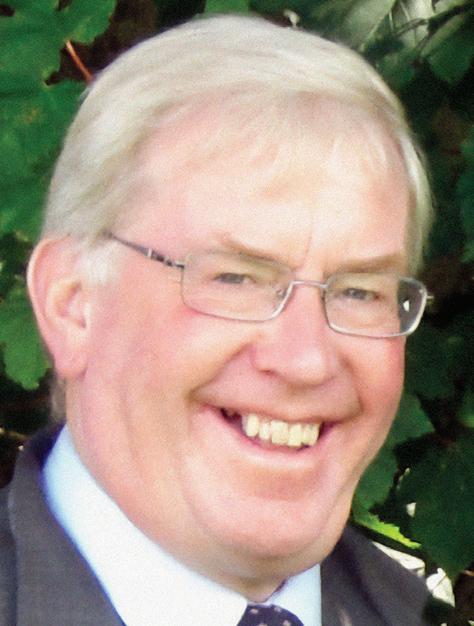
Peter Lowe, the current owner and managing director, of RTAA recalls Downie was a fun-loving person who liked a laugh. For example, when giving a presentation to Cheshire Council in 2001, Downie dressed in his Rupert bear golfing trousers as he had forgotten to pack his suit!
Colleagues remember him as being a lovely man who was not only the MD but a friend, colleague and mentor to many. His vast knowledge and experience of the nuances of decriminalised parking enforcement was acquired before most people outside of London had even heard of DPE.
enhance our national expansion. Together, we look forward to setting new standards in car park management both in the UK and internationally. This acquisition represents a milestone in Intelli-Park’s ambitious growth journey, further cementing its position as a leader in the car parking management sector.”
The acquisition of Bank Park follows Intelli-Park’s recent management buyout by Palladian Investment Partners and Vecturis Equity.

He takes over from Lewis Wray, who after 12 years of leading Taranto, is moving to a senior role within Taranto’s parent company Modaxo Group, a global collective of technology companies working in public transportation.


We currently supply and have vacancies around the UK for Permanent and Temporary positions:
• Civil Enforcement Officers
• Environmental Enforcement Officers
• Parking Back Office (Appeals/Notice Processing/Correspondence)
• Parking Change Management
• Interim Parking Managers
• Car Park Attendants/Marshalls/Stewarding
• Parking Supervisors (Both Enforcement and Back Office)
• Parking Management (Both Enforcement and Back Office)
• Heads of Parking/Directors
• Parking Technologies (Business Development and Project Managers/ Field Service Engineers/General Managers)
• Off Street Parking (Business Development, Contract Managers and Regional Managers)
• CCTV Operators – SIA and BTEC qualified
Looking for staff or need employment? Please contact our experienced team on:
Tel: 0203 668 5680
Email: parking@unity-recruitment.co.uk
Web: www.unity-recruitment.co.uk




Over 8 million
Local authorities in London issued over 8 million penalty charge notices (PCNs) for a range of parking and traffic offences last year. Enforcement of the rules of the road leads to positive behaviour change among road users which makes the capital’s streets safer for all Londoners and its visitors. It also plays a critical role in reducing congestion and helping to decrease air pollution in certain areas, particularly on school streets.
A small minority of drivers fail to follow the rules of the road, which is why enforcement is necessary to encourage all motorists to drive and park in a considerate and safe manner.
Parking and traffic management also provides important benefits for pedestrians, cyclists, motorists, and communities throughout London. These include maintaining road safety and access for Londoners as they go to work, travel for leisure and access services.
London Councils, the collective of local government in the capital, has published data on parking enforcement and appeals in London for 2023-24. The figures show that the London boroughs, the London Lorry Control Scheme and Transport for
London (TfL) issued a total of 8,333,486 PCNs to motorists who had contravened parking, bus lane and moving traffic regulations.
This represents an increase in PCNs issued of 9.7% since 202223. The increase was due to an 11.2% rise in the number of parking PCNs issued, while bus lane PCNs saw an increase of 1.9% and moving traffic PCNs an increase of 8.5%.
London boroughs and TfL only issue PCNs when they believe they have evidence that a breach of parking or moving traffic rules has occurred. All PCN income goes towards paying for the provision of essential traffic and parking services, with any surplus funding ringfenced to invest in other important transport projects such as the Freedom Pass concessionary travel scheme for older and disabled Londoners.
The total number of PCN appeals received by London Tribunals in 2023-24 has decreased by 2.03% from 2022-23 levels to 42,193. The total number of appeals allowed was 16,947 in 2023-24, an increase of 18.2% from last year.
London Councils is currently analysing responses from a full public consultation on parking and traffic enforcement penalty charges in London. The results of this consultation will be discussed in December by London Councils’ Transport and Environment Committee.
Cllr Kieron Williams, London Councils’ executive member for climate, transport and environment, said: “Traffic and parking

management in London is a vital service provided by London boroughs and TfL that keeps London’s streets moving and balances the needs of different communities.
“If drivers believe they have wrongly received a PCN, we encourage them to appeal to the local authority that issued the penalty. If they are not satisfied with the outcome, they can appeal to an independent adjudicator via the relevant independent appeals service at London Tribunals.”
London Councils
London Councils is the collective of London local government, the 32 boroughs and the City of London Corporation. They come together through London Councils to work in collaboration to deliver shared ambitions for the city and Londoners.
The body supports collaboration between boroughs and works in partnership with central government, the Mayor of London, the voluntary and business sectors, and public sector partners such as the NHS.
London Councils provides services such as the Freedom Pass, Taxicard, Health Emergency Badge and a grants programme for voluntary sector organisations in London on behalf of its members.
It also support the Environment and Traffic Adjudicators and the Road User Charging Adjudicators, which are the independent tribunals that consider appeals against penalty charge notices issued by the London local authorities and Transport for London.
www.londoncouncils.gov.uk
London Tribunals
London Tribunals supports the work of the Environment and Traffic Adjudicators and the Road User Charging Adjudicators, which are the independent tribunals which consider appeals against penalty charge notices issued by the London local authorities and Transport for London.
www.londontribunals.gov.uk

Transport watchdog highlights need to improve facilities for lorry drivers
Nearly half of lorry drivers are dissatisfied with the quality and number of suitable places for HGVs to stop in a new survey from an independent watchdog. Transport Focus wants to see the logistics industry deliver on its commitment to improve the experience for lorry drivers. Transport Focus, an executive non-departmental public body sponsored by the Department for Transport, is working to bring together the public and private sector to develop long-term solutions that will improve the quality and availability of rest stops.
The Lorry Driver Facilities Survey found that drivers often don’t feel welcome, safe or able to get a decent meal or proper rest. Transport Focus surveyed more than 7,000 lorry drivers about their experience at a third of all motorway services, ‘A’ road services and truck stops in England. The remaining sites will be included in future editions of the survey.
Less than four in 10 lorry drivers said they were satisfied with the number of stopping places available in the UK. When no services are available, drivers can be forced to park in lay-bys or industrial estates, which lack basic amenities like toilets and have little to no security. The UK driver shortage remains a significant challenge. According to Department for Transport official statistics, the vacancy gap currently sits at 24%. This issue is likely to worsen as a significant portion of the workforce approaches retirement. Women account for just 2% of all drivers, representing an untapped potential workforce.
Of the sites in this year’s survey, Transport Focus said Formula truckstop in Ellesmere Port was the best rated site by lorry drivers with 99% of lorry drivers satisfied, highlighting the good practice within the sector and a benchmark for improvement.
Alex Robertson, chief executive of the independent watchdog Transport Focus, said: “Lorry drivers are crucial to the economy, transporting goods across the country to fill supermarkets shelves and get medical supplies to hospitals. Many of us take for granted our ability to use the toilet, make a hot drink and get a proper
rest when we need to. But for lorry drivers, these basic needs often aren’t being met. Our new research shows the scale of the problem that persists and that’s why we are bringing government and industry together to develop a long-term solution so we can keep our lorries, and the people who drive them, moving safely.”
Transport Focus is calling for four key areas to be addressed:
• Better and consistent quality of services: work must be done to drive up standards and ensure consistent quality of facilities across sites.
• Parking capacity that meets demand: there should be a sustained focus on increasing parking capacity and lorry driver facilities in the right places to ensure that availability meets the growing demand.
• Safety and security for drivers and vehicles: standards must be improved, particularly at sites where there are security concerns, so that drivers and loads are safe and feel safe.
• Providing a welcoming environment: the approach of some services, which leaves lorry drivers feeling less valued than other customers, must be challenged.
Next year Transport Focus will host a roundtable that will gather together government, truc stop owners, motorway service operators, trade associations and the wider roads industry to develop a long-term solution to keep lorries, and the people who drive them, moving safely.
The Lorry Driver Facilities Survey was published during National Lorry Week. Visiting a truckstop, future of roads minister Lillian Greenwood said: “Lorry drivers are the unsung heroes of our economy, and they deserve easily available parking, secure rest areas, and modern welfare facilities so that they can work and drive with confidence. That’s why the Department for Transport and industry are investing up to £43.5m to upgrade truckstops all over the country, on top of £26m from National Highways and industry, and we will work closely with Transport Focus and the sector to continue improving working conditions for lorry drivers, supporting jobs, and getting us back to growth.”
National Highways chief customer and strategy officer Elliot Shaw said: “HGV drivers are the backbone of the economy and that’s why we are investing £13m into improving lorry park facilities across the country. We have received positive feedback
on improvements we have completed so far. National Highways is dedicated to working alongside industry partners to ensure safe, comfortable, and secure rest areas for all HGV drivers.”
Ashton Cull, RHA policy manager said: “We’re proud to hold our tenth National Lorry Week campaign once again celebrating our industry and its people, and the critical role they play in driving the economy. Transport Focus’ survey highlights the very real challenges lorry drivers face day in day out when trying to take a break and do their jobs safely. We look forward to working with Transport Focus and the wider sector on solutions to improve our roadside facilities for the better.”
Ash Evans, operations manager at Formula Premier Truckstop: “I’m delighted that visitors in Transport Focus’ survey have given Formula Truckstop such a vote of confidence. We’ll be using the results of the survey to help make further improvements and offer an exceptional experience for all who stop at our site. We’re looking forward to coming together at Transport Focus’ roundtable to discuss how we can ensure lorry drivers get a better deal wherever they stop and make sure this issue gets the attention it deserves.”
Michelle Gardner, deputy policy director at Logistics UK said: “Logistics drivers are the unsung heroes of our sector, ensuring that goods arrive where they are needed, on time and in great condition. Just like other workers in the economy, drivers deserve to have access to safe, secure and clean facilities to take mandatory rests and to look after basic human needs, with space to provide them with the rest they are legally entitled to, when they need it.
“Transport Focus’ survey demonstrates just how urgent the need for better facilities is for our industry. We are working hard to attract new recruits, particularly younger and more diverse candidates, but we are being let down by a nationwide lack of suitable rest facilities. It is vital that the government and private sector prioritises this issue and provides the facilities that our workforce deserves.”
www.transportfocus.org.uk
The Lorry Driver Facilities Survey features the voices of real drivers. Commenting on the state of truck stops one lorry driver said: “I drive about 4000 miles per week. I’m shattered when I get to truck stops and want a nice shower, healthy food and good sleep. Some truck stops offer only unhealthy food and the showers and toilets are dirty so it’s just making my life so upsetting and stressful and I end up not getting any sleep and I feel terrible.”
Another lorry driver commented: “We need more safe and secure parking. There is a massive shortage of available parking and certainly secure parking. Load and fuel thefts are at an alltime high and nothing seems to be getting done about it.”
Commenting on Formula truck stop in Ellesmere Port, one visitor said: “We need more places like Formula. It has everything you need – clean toilets, showers, visible security, good food.”
Commenting on the facilities at truckstops, one female lorry driver said: “The only shower is in the men’s bathroom. More and more female lorry drivers are driving now, we shouldn’t have to go in the men’s bathroom to shower.”
Government needs to address dissatisfaction with lorry stops, says Logistics UK’s Michelle Gardner

The Transport Focus Lorry Driver Facilities Survey, published this week, found 63% of drivers and 78% of logistics and coach businesses were dissatisfied with the number of available stopping places in the UK. Logistics drivers are the unsung heroes of our sector, ensuring that goods arrive where they are needed, on time and in great condition with no fanfare, so it is extremely disappointing they are reporting widespread dissatisfaction with the number and quality of stopping places. The research reflects the official data showing over 20% of the 21,234 lorries parked overnight close to motorways and major A-roads are forced to use lay-bys or industrial estates because designated lorry parks are full.
But even if lorry drivers are not parking up overnight, rest is essential and drivers need to take legally mandated breaks so need appropriate places to stop. And irrespective of the legal requirements over driver hours, drivers are also entitled to access clean, safe and hygienic facilities in the same way that office workers need and expect during their working days.
Logistics UK has been pressing government to address the shortage of lorry parking and driver facilities for many years and it is vital there is a change in attitudes towards and increased recognition of the strategic importance of road freight to the UK economy if we are going to solve it.
The recent announcement of £14m joint government and industry funding that will create 430 new lorry parking spaces was welcomed by our members but funding alone won’t address the full range of causes behind this shortage.
Our members are hopeful that the proposed reforms to the planning system will reflect our calls for a greater emphasis on facilities and we will continue to work with the government to ensure drivers have the facilities they need.
We have also been urging government to ensure driver facilities are integral to any road investment schemes and the essential drivers in the logistics industry, which deliver all that UK economy relies upon, expect and deserve the same basic rights and facilities as workers in every other sector.
Michelle Gardner is deputy director at Logistics UK


When drivers park in unprotected lay-bys they can become victims of theft. The Department for Transport and industry have made a commitment to invest up to £43.5m to improve truckstops in England. The funds will provide more dedicated parking, secure rest areas and better restaurants and showers. These measures come on top of a joint investment in better driver facilities from National Highways and industry.
Future of roads minister Lilian Greenwood saw a range of improvements at the ADS Truckstop in Stoke, which include new parking bays, a new café, security fencing, new toilets and showers, on a visit to mark National Lorry Week, which celebrates its tenth anniversary. The provision of additional parking bays at ADS Truckstop will ensure fewer lorries park in the town centre or on the side of busy roads, helping tackle local congestion.
Greenwood said: “Lorry drivers keep our economy moving. It is only right they enjoy safe rest areas, easily available parking, and modern facilities as we showcase their importance during National Lorry Week. Our joint funding with industry will ensure that lorry parking facilities like ADS Truckstop can make the improvements that lorry drivers deserve, and we will continue working closely with the sector to improve working conditions, support jobs, and get us back to growth.”
This year new funding totalling £14m will provide more parking for HGVs and better conditions for lorry drivers. The investment will help build better dining, changing and rest facilities, as well as new CCTV and secure fencing to boost welfare and security for lorry drivers. The funding is from the third year of the HGV parking and driver welfare grant scheme, which will come in addition to £8m from industry, for a total funding boost of £12.5m to improve truckstops.
This investment comes on top of £1.8m from the government for 10 small and medium enterprises (SMEs) to trial new groundbreaking technology for decarbonising freight and driving inno-
vation in the sector. Examples of new ideas that will become reality include TUAL working with Wincanton to trial high performance powerbanks for electric lorries, and Innervated Vehicle Engineering working in partnership with ASDA to retrofit hydrogen power to small delivery vans.
The funding is the third tranche of the department’s Freight Innovation Fund Accelerator Programme, a £7m government investment across three years to support the freight sector in deploying artificial intelligence (AI) and automation to improve the way trains, lorries, vans, and ships carry parcels and goods. Delivered by Connected Places Catapult, the Freight Innovation Fund will give SMEs access to technical and business support from the organisation to develop new groundbreaking projects.
Erika Lewis, chief executive officer at Connected Places Catapult, said: “Building on the success of the Freight Innovation Fund to date, I’m very pleased to welcome a third cohort of high potential innovators onto the Accelerator. This programme gives bespoke support to SMEs, working hand-in-hand with industry as they trial their solutions in real-world environments. By supporting new ideas in freight, we are helping to unlock the sector’s potential to be greener and more efficient.”
The £12.5m for truckstops follows £31m in previous joint government and industry funding as part of earlier application windows. Together with National Highways Lorry Parking Facilities Improvements Scheme, this takes the total joint investment from the department and the sector to improve lorry roadside facilities to up to £69m. The funding will be spread across England to ensure all lorry drivers in the country can benefit from better roadside facilities and better working conditions, while supporting local jobs and economic growth.
Declan Pang, director of policy and public affairs at the Road Haulage Association (RHA), said: “We are delighted to see funding allocated to drive improvements to standards and capacity at lorry parks and truck stops across England. The grant scheme continues to be a very welcome commitment from government and the industry to bring about much-needed improvements for lorry drivers who are a vital workforce in keeping the country’s supply chains moving. We look forward to seeing the impact of these investments in improving conditions and driver welfare.”

A Transport Focus survey of 700 freight drivers in 2023 revealed concerns regarding their working conditions, highlighting challenges such as limited parking availability, inadequate and unclean facilities and worries about security for both drivers and their vehicles.
York Lorry Park was the first site to benefit from these improvements, setting a benchmark for enhanced facilities. The upgrades include new male and female shower and changing facilities, an accessible toilet, and an inviting entrance corridor.
HGV driver ‘Duncan’ shared his positive experience, he said: “I stopped at York Lorry Park and was very impressed with the upgraded toilet and shower facilities. I spend four nights a week on the road, and improvements like these make a significant difference.”

National Highways is transforming lorry parking rest area facilities
National Highways is making improvements to lorry parking facilities to keep Heavy Goods Vehicle (HGV) drivers comfortable, safe and well. Last year a survey revealed key problems faced by lorry drivers are limited parking, inadequate and unclean facilities and security for both drivers and their vehicles. The improvement fund provides truckstop operators with support to improve welfare facilities, strengthen safety and security measures and increase parking capacity.
Since December 2023, National Highways has worked with operators to match fund £3m in lorry park upgrades across England, with at least another £10m planned by March 2025. To date, more than 25 roadside operators have been approved grant awards benefitting 128 sites across England, including independent truckstops, trunk road service areas, motorway service areas, and a local authority site.
Recently completed improvements have led to upgraded showers, toilets, fencing, and CCTV installations at 45 sites, including at York Lorry Park, Exelby Services and Scunthorpe Truck Stop. Works are progressing at additional sites, including Glews,
Chippenham Pit Stop, and Junction 26, with ongoing investments across the country.
In addition, the government has announced an additional 23 successful applicants from the third window of the Department for Transport’s HGV parking and driver welfare match funding grant scheme.
During National Customer Service Week 2024, National Highways highlighted the differing needs of people who use motorways and major A roads. Freight and logistics drivers are an important group who rely heavily on the Strategic Road Network (SRN) for their day-to-day operations. The SRN is the most heavily used part of the national road network, carrying two-thirds of all freight.
This funding initiative, part of the National Highways’ Users and Communities Designated Fund, is directly responding to these challenges. It aims to provide HGV drivers with safe, secure, and comfortable rest areas that are essential for their wellbeing and productivity.
Freda Rashdi, head of customer journeys at National Highways said: “HGV drivers are the backbone of our economy and the positive feedback we have received from drivers confirms the vital need for these enhancements. Through the projects we’re delivering this year, we’re committed to playing our part in transforming lorry parking facilities across England, ensuring that HGV drivers have the quality rest areas they need and deserve.”
More operators are also seeing the benefits of this investment. Andy James, operations director at Watling Street near St Albans in Hertfordshire said: “Since we completed our improvements, we’ve seen a 20 per cent increase in lorries using our site, largely attributed to enhanced security measures.”
In addition to security improvements at Watling Street, HGV drivers can now use a newly refurbished café and upgraded accessible showers for both male and female drivers.
National Highways’ 2023 survey also found that female HGV drivers, who are often underrepresented within the industry, had negative experiences using truck stops and facilities, which were having a direct impact on their health. This improvement fund has been vital in providing better facilities for everyone.
One female driver said: “Many female drivers get water infections because we have less places to go. We need the services lots more.”
Collaboration with key partners and stakeholders, as well as the individual operators, has been key to the success of delivering this improvement fund.
For example, National Highways is working closely with trade associations such as the Road Haulage Association, which represents the interests of the UK’s road haulage industry. James Barwise, policy lead at the RHA, said: “We are delighted to see National Highways’ Lorry Park Improvement Fund being awarded to projects which will make a real difference to the day-to-day wellbeing of the drivers who use them.”




Infinium Logistics to provide businesses with off-site charging
An electric vehicle storage area will be built on the former Groundwell industrial estate that had previously been used as a park & ride in Swindon.
ILP UK Propco, which stands for Infinium Logistics, has been given the green light by Swindon Borough Council to construct the building specifically as a storage area for vans and in particular electric vehicles.
It will feature solar panels to generate energy to recharge vehicles parked there.
There will be welfare facilities for staff and users, and the permission includes a single-storey commercial building on the site, which will most likely be used as a café also accessible to members of the public. They will also be able to use some fast-charging facilities for their vehicles.
The three-story structure would be around 12.5m in total height, and clad in galvanised steel panels in grey, light green and dark green.
Infinitum Logistics will be branded in large letters across the first floor. The company says

of operation.
“Currently many van operators’ employees take their van home at the end of their shift, this dedicated facility could positively enhance local residential areas, potentially reducing the number of ‘white vans’ parked on streets overnight. With the growing e-commerce market and shift to electric delivery vehicles, the need for these dedicated facilities will increase due to the inability to charge company vehicles at the driver’s home.”


the plan is to offer commercial fleets, especially of delivery companies, a storage facility and help increase the switch of such fleets from internal combustion engines to electric motors.
Infinium said: “The proposal regenerates the dilapidated area to provide dedicated van storage and charging facilities for existing and new businesses operating within Swindon. The electric vehicles stored could be vans for last-mile delivery operators,
utility companies, service providers or any other van operation where overnight charging and secure storage is required.”
The company’s application placed an emphasis on helping delivery companies transition their fleets: “New build warehousing is specifically designed for last-mile delivery van storage, most speculatively built and existing industrial units are not designed with sufficient external yard space to support this type
Regarding the site, Infinium said: “It is ideally located for this purpose and will not only allow businesses in Swindon to transition to zero carbon by the use of electric vehicles, but will also offer car and van charging facilities to the public.”
In approving the scheme, Swindon Borough Council planners said: “This would make efficient use of an existing vacant brownfield site, and would offer economic, social and environmental benefits and significant sustainability credentials in the provision of low carbon/renewable energy infrastructure and contributing towards the borough’s carbon neutral targets.”

Following the incident, a West Northamptonshire Council spokesperson said: “The collision caused damage to the external brickwork facade, as well as to an internal, non-load bearing, wall.
“The building’s superstructure is concrete and steel, and a structural engineer has confirmed this is safe and untouched.
“All stairwells remain intact and undamaged, and we are not aware of any vehicles inside the car park being damaged.

A town centre multi-storey car park was badly damaged in a crash which saw two passing pedestrians airlifted to hospital.
The St John’s car park in Northampton has been closed since it was hit by a black Seat Leon at about 3.30pm on 18 October.
A man and woman in their
20s were struck on Swan Street before it collided with the car park.
The driver, 23-year-old Joshua Coulton from Northampton, admitted offences including causing injury by dangerous driving.
Coulton is due to be sentenced on 2 December.
“Over the weekend, work took place to remove remaining external brickwork from above the entrance.
“This is now complete, and scaffolding will now be put up so we can continue to make necessary safety checks, with a view to reopening the car park as soon as it is safe to do so. Once this is done we will look at options for restoring the brickwork façade.”
A planning application for the partial demolition of the Covent Garden multi-storey car park in Leamington Spa has been submitted to Warwick District Council.
The building was permanently closed to the public in February 2023 on health and safety grounds due to insolvable structural issues and increasing incidents of anti-social behaviour.
If the demolition plans are approved, it is expected that the work will commence in Spring 2025 taking place over several months.
Once the demolition is completed, the two lower floors of the existing multistorey will be reopened for use – providing round 120 spaces – until the long-term future of the site is determined.

Plans to turn a 1960s car park into an urban neighbourhood have been put forward in Newcastle under Lyme, Staffordshire.
The Midway car park could be transformed into 100 one, two and three-bed apartments, a social hub, gym and mini-cinema, developer Capital&Centric said. Under proposals for the Midway car park, there would
also be bike storage spaces and parking as well as landscaping underneath a three-floor atrium.
The car park is one of three sites being floated with the borough council for redevelopment to ‘re-boot’ town centre spaces using £35m of government Future High Street funding.
John Moffat, joint managing director at Capital&Centric, said: “The challenge of building on brownfield land is you need to be bold and creative in your approach. Our radical plans for Midway are exactly that, and will bring forward much needed
homes in a prime town centre spot People thought we were mad when we said we wanted to create new homes from a car park but the plans show that it can work and it’s actually made for a more interesting and unique neighbourhood.”
Council leader Cllr Simon Tagg said: “The ageing and outdated Midway will soon be redundant with the opening of the new Castle car park and this exciting proposal avoids wasteful demolition and allows new housing to spring up on a prominent town centre brownfield site.”
A town centre multi-storey car park and old market hall in Cannock, Staffordshire is set to be demolished after councillors approved plans for its removal.
Demolition of the car park on Market Hall Street will make space for a leisure and cultural hub, as well as refurbishment of the Prince of Wales Theatre.
Two vacant shops, part of a third unit, and the canopy over Market Hall Street are also set to be removed as part of the redevelopment of land off Church Street and Ringway.
Cannock Chase District Council secured £20m from the government’s Levelling Up Fund in 2021 towards the project.
Outline permission for the development was granted by the council’s planning committee last year. Demolition work is now scheduled to start at the end of this month and continue until autumn 2025. “Following approval of the main outline application, a demolition contractor has now been appointed and relevant project work provided as part of this full planning application,” a report to committee said.



Sprinklers could have limited impact of the London Luton Airport car park blaze, says Bedfordshire Fire & Rescue Service
Installation of a sprinkler system could have changed or limited the huge multi-storey car park fire at London Luton Airport, according to a report produced by the emergency services who fought the blaze two years ago.
Bedfordshire Fire & Rescue Service (FRS) has published a comprehensive report detailing the major fire at London Luton Airport’s Terminal Car Park 2. The fire, which took place on 10 October 2023, was one of the most significant incidents the service has responded to in recent years.
The fire started in a diesel vehicle on the third flood of Car Park 2, but because of wind blowing through the open-sided structure it spread quickly and destroyed 1,352 vehicles and caused the building’s partial collapse.
The Bedfordshire FRS Significant Incident Report outlines the scale of the operation, which required more than 100 firefighters at its height. Crews worked tirelessly to prevent the fire from spreading to the neighbouring car park, the multi-million-pound Direct Air-Rail Transit (DART) travel infrastructure, and aircraft. The incident, which led to widespread disruption at the airport, was managed without any serious injuries or fatalities.
Cllr Jacqui Burnett, Bedfordshire Fire & Rescue Authority chair, said: “The fire presented challenges, but I am incredibly proud of the rapid response and professionalism shown by our teams and our partners. The operation not only safeguarded the airport but also highlighted the strength of the service’s multiagency coordination. While our firefighters managed to contain and successfully extinguish the fire, reports like these are essential to ensure the service learns and continues to improve its response in the future.”
The report identifies areas for improvement, particularly in fire safety measures for multi-storey car parks. If there had been a suitable sprinkler system, it may have changed and delayed the fire spread.
Bedfordshire’s chief fire officer Andy Hopkinson said: “Evidence derived from global research demonstrates the effectiveness of sprinklers in controlling fires in car parks, with property loss about 95 per cent lower than that of an uncontrolled fire. We will be using the learning from this incident to support the National Fire Chiefs Council (NFCC) in lobbying for a change in national guidance and legislation to make the provision of automatic water suppression systems (AWSS), such as sprinklers, a requirement in multi-storey car parks.”
The chief fire officer is also backing the NFCC in its call on government to carry out further and in-depth research into fires in car parks and the design of car parks.
NFCC has also asked for a review of the requirements for car parks, to take account of the products and materials used in modern vehicles, and to consider additional requirements for automatic water suppression systems and structural safety above those specified in the current guidance.
The car park was demolished as a result of the extensive damage it suffered. Construction of a new car park was under way that included plans for a fire suppressant system.
Responding to the report Alberto Martin, chief executive of London Luton Airport, said: “We welcome the findings, which highlight the efforts of the airport fire service and our wider team. We continue to work closely with Bedfordshire Fire & Rescue Service and all agencies in relation to this incident.”


At 20:47 on Tuesday 10 October 2023, Bedfordshire Fire & Rescue (FRS) received a 999 call alerting it to a car on fire on the third floor of Terminal Car Park 2 at London Luton Airport. Opened in 2019 with 2,700 parking spaces, the five-storey car park was a steel framed structure with reinforced concrete floors and open sides, located close to the main terminal building of the UK’s fifth busiest airport, publicly owned by Luton Borough Council.
The fire originated in a privately owned car powered by a diesel fuelled internal combustion engine with the cause of fire determined to be accidental. The first two fire engines from Luton and Stopsley Fire Stations arrived at 20:55 and were met with a rapidly developing fire involving multiple vehicles on the third floor. The first appliance from the London Luton Airport Fire Service arrived on scene at 20:55.
Despite offensive firefighting operations being adopted by the first arriving firefighting crews, clear signs of imminent structural collapse were observed in the protected staircases. This led the incident commander to order a tactical withdrawal of firefighters in the building, which was achieved by 21:26, and only external firefighting operations took place for the remainder of the incident.
No members of the public were injured during the incident. Four firefighters were injured, with two treated for heat exhaustion and a two for smoke inhalation. An employee of an agency operating at the airport was also treated for smoke inhalation.
The fire spread to involve 1,352 vehicles and led to a partial collapse of the structure, which was deemed unsafe and fully demolished following the fire.
There were three key phases of tactics used to tackle the fire:
• Phase 1: The initial attack with crews committed internally to the car park
• Phase 2: Defensive firefighting to contain the fire to the third floor
• Phase 3: Defensive firefighting with the aim of containing the fire within the car park and preventing it from spreading to nearby aircraft and adjacent structures.
During the first phase of the incident, Bedfordshire FRS committed crews wearing breathing apparatus (BA) to the car park via the northwest stairwell. Water was supplied by LLA Fire Service via the dry riser, and they also attacked the fire externally using a High Reach Extendable Turret (HRET). The first BA team went under air at approximately 21:10. By 21:26 all crews had been withdrawn from the building as the signs of potential building collapse had been recognised by firefighters working in the northwest staircase. During this initial phase of the incident, additional resources were requested, with the incident being made up to 10 rescue pumps and two aerial platforms.
Following the withdrawal of BA crews, the incident moved to the second phase, which had a tactical aim of containing the fire to the third floor, and sectorisation of the incident was implemented. During this phase an additional aerial ladder, a high-volume pump (HVP) and two water carriers were requested. The fire was declared a major incident at 21:37. During this second phase an individual was spotted in Car Park 2 and was
rescued. The individual worked in the terminal building (but was not an employee of LLAOL) and had entered the building approximately one hour after the start of the incident and had used their status as an airport worker to gain access to the building in an attempt to remove their car.
At approximately 22:30 the incident commander switched their firefighting strategy to the third phase. This was defensive firefighting with the aim of containing the fire within the car park and preventing it from spreading to nearby aircraft to the east side and the adjacent structures of Terminal Car Park 1 on the west side and the newly opened Direct Air-Rail Transit (DART) station on the north side.


Bedfordshire FRS did not recommend the installation of AWSS in Terminal Car Park 2.
However, academic research and the outcomes of reviews into fires occurring within MSCPs across the globe in the last decade has led to an increased awareness of the risks posed by these structures and the vehicles stored within them. For example, current designs do not take into consideration the fire loading of modern vehicles, electric vehicles and liquified petroleum gas vehicles, as well as the risk of running fuel fires from plastic fuel tanks.
A further make-up of resources was made at 22:57 with a make pumps 15 message being sent to Fire Control.
Firefighting continued throughout the night. By 05:28 on Wednesday 11 October 2023 the incident had been reduced to six rescue pumps and one ALP. By 07:29 all live sectors were damping down hotspots and by 09:13 all firefighting operations had ceased with crews monitoring for hotspots.
This was one of the more significant incidents to occur within Bedfordshire FRS’s area for many years and the multi-agency response was supported by fire and rescue services from Buckinghamshire, Cambridgeshire, Hertfordshire, London and Northamptonshire along with numerous other local and regional partners coordinated by Bedfordshire Local Resilience Forum. The fire in Terminal Car Park 2 is not the first major fire in a multi-storey car park and it is unlikely to be the last.
The fire spread quickly to several vehicles and a combination of the wind spreading the fire through the open-sided car park, the impact of running fuel fires, and the early onset of signs of structural collapse, all prevented internal offensive firefighting from continuing and contributed to the significant scale of the fire and subsequent financial loss.
Given the significant structural collapse that occurred, the early recognition of the risk of collapse and the subsequent tactical withdrawal of firefighters certainly helped prevent any serious injury or loss of life. A significant number of cars within Car Park 2 were left visibly undamaged, the adjacent DART station and Car Park 1 building were successfully protected, and nearby aircraft was moved to a safe area.
Throughout the incident the service worked well with partners including London Luton Airport Fire Service with a focus on the economic impact of the airport remaining closed. As a result of the collective efforts of all partners, flights were able to resume from 15:00 on Wednesday 11 October.
At the time of construction of Terminal Car Park 2, both the local and national guidance for multistorey car parks (MSCPs) was based on the legislative requirements for life safety. The fire safety requirements set out in Approved Document B (Volume 2: Buildings Other Than Dwellings, 2013) for open sided car parks included heat and smoke management measures only. Consequently,
While there have been few instances of fatalities in car parks, there have been recorded fatalities to firefighters abroad due to structural collapse, and there are cases of firefighter injuries within the UK while attending car park fires. Furthermore, evidence derived from global research, and research conducted by the Building Research Establishment (BRE) demonstrates the effectiveness of sprinklers in controlling fires in car parks. It shows that the incidence of fatalities and injuries is zero, and the property loss is about 95% lower than that of an uncontrolled fire. AWSS within enclosed car parks are common in Europe and also recommended by National Fire Protection Association Standard 88 (NFPA 88) in the USA.
The Independent Review of Buildings Regulations and Fire Safety led by Dame Judith Hackitt in 2018 found the regulatory system for buildings in England is not fit for purpose. There have been numerous major fires where the rate and scale of fire spread appears to have been linked to the construction of the building, which has highlighted the need for strengthened fire safety requirements in buildings in England.
The National Fire Chiefs Council (NFCC) subsequently updated its position statement and associated guidance on AWSS in December 2020 and most recently in May 2024 as well as calling for more research to be undertaken, particularly given the recent increase in vehicles powered by emerging technologies. It also continues to lobby for legislative change to make the provision of AFSS in certain high-risk buildings a mandatory requirement. Bedfordshire FRS is aligned with the NFCC view that AFSS are the most effective way to ensure fires are suppressed or even extinguished before the fire and rescue service arrive.
Bedfordshire FRS recommended the installation of AWSS in multi-storey car parks since 2019 during the planning consultation phase and since 2022 during the building regulations consultation phase. Bedfordshire FRS supports the NFCC in lobbying for a change in national guidance and legislation to make the provision of fire suppression systems, such as sprinklers, a requirement in new-build opensided multi storey car parks.
In January 2024, the chief fire officer wrote to the operator of London Luton Airport and the chief executive of Luton Borough Council strongly recommending that an appropriate AWSS be included in the design of any new or replacement MSCP and that serious consideration be given to retrofitting AWSS in its other existing MSCPs.
Bedfordshire FRS understands the MSCP which will replace Terminal Car Park 2 will include a suitable AWSS.
Extracted from Significant Incident Report: London Luton Airport Terminal Car Park 2
Vauxhall and Cenex assess metrics used for chargepoint roll-out
The UK’s current electric vehicle infrastructure (EVI) targets are too wide in scope and should be based on more detailed, precise metrics to ensure a true reflection of progress in regions across the country, according to a new report.
The findings were made in a new study by manufacturer Vauxhall, with leading sustainable transport organisation Cenex, who have assessed the effectiveness of metrics commonly used to track the success of the UK’s electrification journey, such as the number of public chargepoints and the number of EVs per chargepoint.
According to the assessment, the broad nature of current UK EVI targets don’t go far enough to provide an actionable and measurable reflection of where infrastructure is required across the country.
Instead, three new relevant metrics were created in the report to track progress across three types of public charging:
• Near Home Charging – near residential dwellings
• Destination Charging – where charging for business or leisure
• Journey Charging – facilities similar to a modern petrol forecourt.
‘Near Home’ considers the bal-

vision, while the M2 between Gillingham and Canterbury was the best.
The study combined a range of research methods, including desk-based research of international and national best practice, an online survey and in-depth interviews with industry experts.

ance of supply and demand in relation to the distribution of chargepoints; the ‘Journey Charging’ index was calculated using data about the demand for charging alongside data about the supply and capacity of charging facilities; and ‘Destination Charging’ was calculated through consideration of visitor need, usage of parking bays, the proportion of longstay versus short-stay visitors and the proportion of EVs at a given point in time.
Using the ‘Near Home Charging’ metric, it was able to conclude that, on average, 19% of all households who need it are close to a public chargepoint. Across Great Britain, supply was found to be a little ahead of demand, although regional disparities continue to exist. For example, Camden nearly has the


jected levels of local EV ownership in 2040.
Using the ‘Journey Charging’ metric, the study concluded that overall, the supply of journey charging for UK’s roads is ahead of demand. But it also revealed there is still significant variation between roads. The M27 (Southampton bypass) was found to be the motorway with the worst journey charging pro-
Coventry University is set to play a key role in accelerating the city’s electric vehicle (EV) revolution as part of a new project examining the barriers to home charging.
The work will specifically focus on residents who lack driveway access and face difficulties in home charging, a situation currently affecting almost half of Coventry households.
Entitled Levelling Up Coventry’s EV Adoption Journey, the project was selected as one of seven winners of the Transport Decarbonisation Demonstrator competition – bringing with it a share of £1.6m in grant funding from the Department for Transport.
Led by DoubleMSC Solutions and supported by Coventry University and Coventry City Council, it will assess the effectiveness of the existing EV infrastructure in Coventry to illustrate the benefits and practicality of transitioning to EVs.

Coventry University’s Centre for Future Transport and Cities will aim to develop a disruptive model to enhance the city’s potential as a low-carbon EV haven.
Stewart Birrell, Professor of Human Factors for Future Transport at Coventry University’s National Transport Design Centre, said: “Here within the Research Centre for Future Transport Cities we are delighted to be working on this exciting project bringing flexible EV charging to the people of Coventry.
James Taylor, managing director, Vauxhall, said: “Effectively tracking the progress we are making towards a practical future for electric vehicles is key to determining how far we have come, and in identifying what steps we need to take next to ensure that progress continues at pace. Partnering with Cenex to produce this report has been valuable in demonstrating how much needs to be done to improve the current metrics we use, to more accurately reflect the true progress being made and that still needs to be made throughout the country. This data highlights how broad the UK’s current target of 300,000 public chargepoints by 2030 is and how useful a more nuanced and detailed picture is.”
Chris Rimmer, head of policy, strategy and implementation, Cenex, added: “A key finding from the research is that metrics must be relevant, actionable, scalable and measurable. Applying this to the three ways chargepoints are used allows us to assess whether we are getting the right chargepoints of the right power into the right places.”
“Our research will bring our human centred design expertise to help design a usable and desirable mobile battery innovation – an EV charging solution named ENSTOREL, but also understand through modelling the existing charging network where gaps exist for changing needs in Coventry.”
The Transport Decarbonisation Demonstrator competition is funded by the Department for Transport and delivered by Innovate UK and aims to accelerate the UK’s transition to a low-carbon future.
Mike Biddle, executive director net zero at Innovate UK, said: “By looking at decarbonisation through a place-based lens it is hoped that these projects will bring wider benefits above and beyond transport decarbonisation such as the improved health of residents through better access to active travel modes, a greater sense of community created by schemes or a decrease in congestion levels due to fewer private vehicles on the road. We’re looking forward to the project completion next year and seeing the impact.”
Bi-directional charging could help households save money, says T&E
Using electric vehicles to store energy and feed back into the grid could soon save the UK’s consumer hundreds of pounds a year, a study by Transport & Environment (T&E) suggests.
T&E is the UK national office of clean transport NGO Transport & Environment, whose aim is to achieve a zeroemission mobility system that is affordable and has minimal impacts on health, climate and environment and which is accessible to all.
Vehicle-to-grid (V2G) technology could help the UK energy system save £2.25 billion a year by 2040, according to the report by research institutes Fraunhofer ISI and ISE for T&E. This could result in a saving of more than £15 billion between 2030 and 2040, T&E finds.
EVs equipped with bi-directional charging can act as ‘bat-

teries on wheels’ that draw down electricity at times of oversupply and give back when demand is higher. But T&E says their potential is unlikely to be realised without common standards to ensure interoperability between all EVs and chargers.
By allowing EVs to draw down excess electricity when it is cheap, bi-directional charging could save UK EV drivers 11% on annual electricity bills according to the study, or £190 per
year by 2040. If bi-directional charging was combined with home solar panels, this could reduce bills by up to 31%, equating to reductions of up to £380, depending on factors such as location and the vehicle’s battery size, suggests T&E.
Bi-directional homechargers are expected to only be around £80 more expensive than conventional wallboxes in the future.
T&E suggests bi-directional charging can also extend the life

A series of studies undertaken by the distribution network operator for London, the South and East of England has proven 5kW chargepoints can be installed even on older lamp posts which have thinner cabling than more modern installations.
UK Power Networks worked with chargepoint operator Shell ubitricity to undertake technical assessments. It has now updated its technical guidance to give confidence to the energy industry to deliver a large-scale roll-out of lamp post charging.
The study came after some local authorities on the South
Coast of England were ordered to stop installing lamp post chargers on older legacy columns with different wiring.
Local authorities own and operate streetlights, with distribution network operators like UK Power Networks delivering the power to them.
The revised guidance is expected to help electric vehicle owners in towns and cities, where it is estimated that up to 60% of people do not have access to off-street parking. It will give all 133 local authorities operating in the area UK Power Networks serves the green light to connect faster 5kW chargepoints to
of EV batteries – contrary to commonly held concerns about cell degradation due to regular charging and deloading. Battery lifetimes could be extended by up to 9% compared to standard EV charging practices, the report finds, as the car is maintained in an optimal state of charge. By storing excess renewable energy that would otherwise be lost, the UK’s EV fleet could contribute up to 3% of the UK’s annual power requirements. This would make EVs the sixth largest power ‘supplier’ in the UK.
Transport & Environment is calling on the UK government to change UK vehicle approval rules to make sure that the onboard charger of every new EV is capable of bi-directionality and to adopt new measures to ensure all private and slow public chargers are capable of charging both ways.
T&E argues that the UK government must get to grips with ensuring that the grid is prepared and smart so V2G benefits can be maximised.
their lamp posts.
Local authorities will also now be able to push ahead with their plans to increase the number of chargers through the government’s Local EV Infrastructure Fund.
Mark Adolphus, director of Connections at UK Power Networks said: “This is great news for customers and lights the way for a vast swathe of new electric vehicle charging stations across the region we serve. It underlines the importance of networks collaborating with the wider energy industry to ensure they can deliver with confidence and certainty.”
Stuart Wilson, market unit lead at ubitricity said: “Lamp post charging helps local authorities to rollout out charging infrastructure at scale and allows EV drivers to charge their cars close to home. Over 8 million households in the UK do not have access to off-street parking and without strong public EV charging infrastructure, there is a legitimate concern that people without a driveway will be left behind in the transition to electric vehicles in the UK.”
Macquarie Group will support new investment to roll out a network of fast-charging electric vehicle infrastructure nationwide as part of a wider £20 billion of package of activity across its UK portfolio.
The Australian-headquartered financial services group announced the investment plan on the sidelines of the UK’s International Investment Summit.
The investment by Macquarie portfolio company Roadchef, a motorway service area operator, will install around 650 fastcharging points across most of its sites in conjunction with partners to support the growing number of motorists adopting electric vehicles.
The upgraded EV charging facilities will be partly powered by 9 MW of new solar energy capacity installed on-site.
Working with partners, Roadchef will also pilot charging solutions for heavy goods vehicles (HGVs) at two key locations across the motorway network whilst developing 100 additional parking bays in preparation for electric HGVs.
Scottish Government says EV infrastructure roll-out ahead of target
Scotland has hit its 6,000 public electric vehicle chargepoint target two years earlier than planned with more than £65m invested into schemes since 2011.
Chargepoint data provider Zapmap has confirmed Scotland had 6,030 public chargepoints as of 31 October, delivered through a combination of public and increasing private sector investment.
A Network fit for the Future: Vision for Scotland’s Public Electric Vehicle was published in June 2023 with a commitment to enabling approximately 24,000 additional public chargepoints by 2030. The government has also provided £5.7m to support the installation of 18,861 domestic charging points and £10.8m to support 1,432 higher powered workplace charging points.
First minister John Swinney said: “This announcement is clear evidence of our commitment to making sustainable travel accessible for everyone in Scotland. We need to maintain this rapid progress, working in greater partnership with the private sector to accelerate the pace and scale of delivery right across the country. By fast-tracking EV infrastructure, we’re paving the way for a net zero Scotland
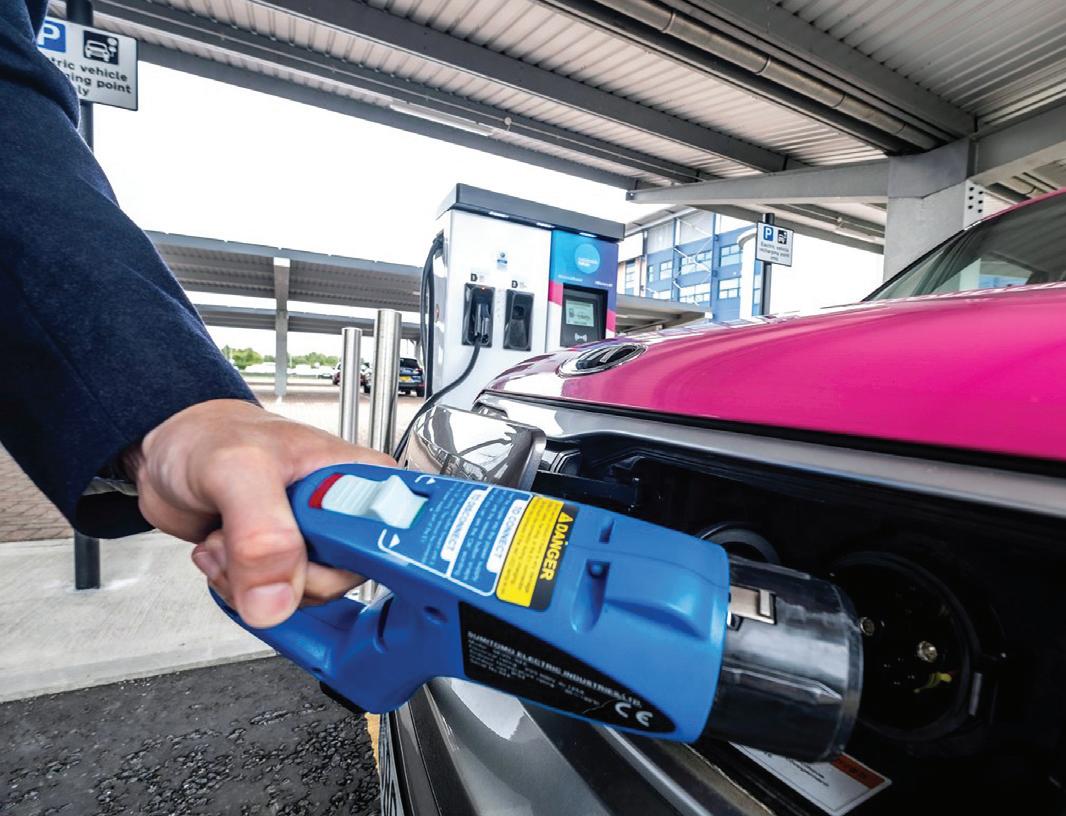

while advancing our goal to phase out new petrol and diesel cars by 2030.”
Scottish transport secretary Fiona Hyslop added: “In 2023, we published our vision for public EV charging infrastructure, highlighting the key role the private sector will play in delivering Scotland’s future EV charging requirements for public charging. Through our £30m EV Infrastructure Fund we are continuing to support public EV charging; providing local authorities with funding to enable them to work in partnership with the private sector to continue to expand public EV charging across Scotland.
“This approach is paying dividends – ensuring faster delivery and greater reliability of public

ChargeUK, the representative body for the UK’s EV charging infrastructure sector, has appointed Jarrod Birch as the organisation’s first head of policy. Birch joins from Shell Recharge, where he was policy and advocacy lead. He has also previously been a member of ChargeUK’s board.
Birch’s focus will be on creating the policy and
regulatory conditions the sector needs to build the UK’s EV charging infrastructure at a time when the EV transition is at a critical point.
With Birch stepping down from his board position, and Tesla’s Natasha Mahmoudian taking maternity leave, ChargeUK also announces two new board members: Laura Hardy, chief communications officer at GRIDSERVE and Antoine Picron, senior policy manager at ChargePoint.
Birch said: “EV roll-out is continuing at a record rate, with the public charging network already supporting a million EV drivers today, but there is much more to be done, so I am looking forward to supporting the industry at this critical stage of the transition.”
chargepoints across the country. I’m pleased to welcome the matched investment from businesses such as IONITY, which is helping to scale up the provision of public EV charging across Scotland.”
IONITY country (UK & Ireland) manager Andreas Atkins said: “For Scotland to have reached its ambitious target of delivering 6,000 public chargers well ahead of its 2026 target is a huge achievement, especially in such a difficult economic environment at present in the UK.
“A continued collaborative approach between the public sector and private industry is required to tackle and deliver the roadmap for net zero transport, and IONITY will continue to play a key role in this. We
have already injected £20m investment in Scotland by the end of 2025, with a further £20m committed into Scotland by 2028 – delivering 100% green electricity through our chargers from Scotland’s main cities to the West Coast and the Highlands.
“Not only will we enable electric transit right across Scotland, but our charging hub site partners, such as food and beverage retailers, retail parks and hospitality venues will directly benefit. The IONITY hubs are introducing those businesses – and wider local economies – to new revenue streams and additional footfall, bringing entire communities with us into the era of electric vehicles.”
Transport Scotland has announced the release of £6.3m through the Electric Vehicle Infrastructure Fund to support 11 local authorities across Glasgow City Region and Ayrshire region.
Susan Aitken, Glasgow City Region cabinet chair and leader of Glasgow City Council, said: “EVs are to key to reducing carbon emissions and the expanded charging network this funding will deliver can persuade more citizens across the City Region to switch to electric. And in creating the biggest network of chargepoints across Scotland’s most populous communities we can make a real impact on our national climate targets.”
Sales of pure EVs have plateaued as a percentage of new sales in the UK over the last 12 months, as government messaging and a rise of online misinformation has caused drivers to hesitate in making the switch.
This has prompted Octopus Electric Vehicles and the Fully Charged Show to team up to launch Electric Vehicles UK, a new organisation designed to educate consumers about electric vehicles.
Electric Vehicles UK will be spearheaded by interim CEO Dan Caesar for the first year, after which a full-time CEO will be appointed. Caesar is joint CEO of The Fully Charged Show, an online channel cocreated by actor, author and presenter Robert Llewellyn.
Caesar said: “Electric vehicles
have become something of a lightning rod for headline writers, guaranteeing as they do, a significant number of hits. Through multiple surveys on the subject, we know that nine out of 10 battery EV drivers won’t go back to combustion engine vehicles.”
Greg Jackson, founder of Octopus Energy Group, also urged the industry to help drivers discover the very clear advantages of EVs.
Octopus research indicates satisfaction among electric vehicle drivers remains high, with 96% of EV owners planning to buy another electric car. Furthermore, almost half of non-EV drivers would like their next car to be electric, and are looking for trusted information and experts to help them make the switch.
Transport for London forms joint venture to create ultra-rapid sites
A joint venture partnership between Transport for London and Fastned will help deliver at least 25 electric vehicle charging hubs. Places for London, TfL’s property company, has selected Fastned as its preferred partner to develop new ultra-rapid charging hubs across its estate.
The joint venture aims to deliver new dedicated off-street urban charging hubs that will be able to simultaneously charge multiple vehicles at high speeds.
The sites will also help support placemaking in the local areas by including retail and other facilities, such as toilets on the larger sites where possible.
Mark Farrow, director of strategy and planning at Places for London, said: “We are excited to have now selected Fastned as our preferred partner for our new joint venture to bring forward a number of new electric vehicle charging hubs. These


hubs will help encourage highmileage businesses such as taxi, private hire and commercial drivers, across London, to confidently make the transition to electric vehicles.
“These new charging hubs, the first of which will open in 2026, will make it even easier for those who need to rapidly charge their electric vehicles, with several bays at each location, helping London to further work towards the Mayor of London’s commitment to achiev
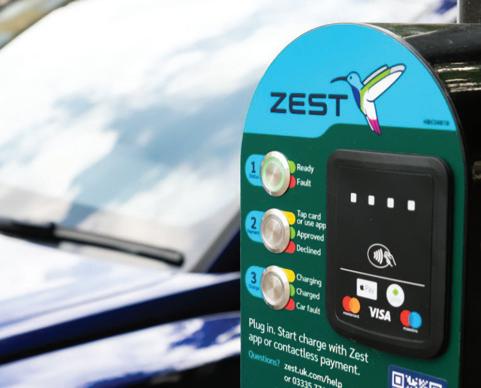
Portsmouth City Council has appointed Zest to operate its growing EV charging network.
The partnership will see Zest more than triple the amount of available on-street charging by installing and managing up to 320 new on-street chargepoints in residential areas during 2025.
This expansion is designed to give more people access to convenient charging, especially those without driveways or other off-street parking.
As contracts come to an end with existing operators, current plans allow for Zest to take on some or all of the existing chargepoint network that has been in place since 2018. Existing chargepoints will be evaluated by Zest and may or may not be retained. The council will work with Zest on
this as a priority once they are fully embedded.
The project is being supported by a grant from the government’s On-Street Residential Chargepoint Scheme (ORCS) with matched funding from Zest.
Cllr Peter Candlish, cabinet member for transport, said: “We are committed to providing sustainable transport options for everyone in Portsmouth, and working with Zest to support residents choosing to transition from petrol or diesel to electric vehicles is a key part of that. Installing up to 320 new chargepoints will make it easier for people to make the switch to cleaner vehicles and benefit from convenient charging options close to home.”
Robin Heap, CEO at Zest, said: “To create real change, we need an abundance of convenient charging options that fit seamlessly into people’s lives, and this investment will make the switch to electric vehicles a possibility for drivers across the city.”
ing net zero carbon by 2030.”
Now the preferred bidder has been selected, Places for London is requesting approval from TfL’s land and property committee to form the joint venture at the earliest opportunity. The first site is set to be delivered in 2026.
The joint venture intends to meet or exceed the Public Charge Point Regulations 2023 and deliver best practices from the British Standards Institution’s
Customer safety will also be prioritised, with all sites designed to provide clear lines of sight, high illuminance lighting and CCTV, as well as on-site presence where additional facilities are provided. These measures will make the infrastructure more accessible and inclusive and will provide a more positive experience for all customers.
Fastned already operates the ultra-rapid charging hub in Greenwich, which offers electric drivers up to 300 miles of range in as little as 20 minutes.
Fastned already operates 25 charging hubs in the UK and more than 325 across Europe in countries such as the Netherlands, France and Belgium. Tom Hurst, UK country director for Fastned, said: “Londoners deserve a top-notch EV charging network for all those daily trips and longer journeys. That’s why we’re excited and proud to be bringing more ultra-rapid charging to key locations across the city all helping






















































The Leading Independent Consultancy for all your parking solu琀ons
Established in 1991, with over 230 sa琀s昀ed customers comprising both public and private sector (including Local Authority and Health and Educa琀on establishments). Quality parking solu琀ons provided by our experienced in house specialists:
GIS mapping and surveying
• MTO site surveys and digi琀sing.
• On street TRO signs and lines: legality and condi琀on surveys (sample surveys also available).
• GIS mapping of TRO surveys, produc琀on of digital maps and TRO management for Order wri琀ng, upda琀ng and consolida琀on.
• Data extrac琀on and conversion of text based schedules to digi琀sed map based solu琀ons.
• Length of stay, usage, and occupancy parking surveys, both on and o昀 street.
• Compliance surveys and data analysis.
• Surveying and mapping of infrastructure assets.
Contact:



Consultancy services
• Financial appraisal and e�ciency reviews of parking service provision.
• Collabora琀ve working – joint no琀ce processing and shared enforcement.
• On and O昀 street tra�c regula琀on order wri琀ng.
• DPE and CPE feasibility studies and implementa琀on.
• Tari昀 reviews.
• DPE/CPE services speci昀ca琀on wri琀ng and tender evalua琀on. RTA
Peter Lowe B.Eng., C.Eng., M.I.C.E., FBPA
Tel: 01492585055 or 07900264137
Email: plowe@rtaassociates.co.uk
www.rtaassociates.co.uk

For more information on our services, please contact:
Lauren Appleby (North) lappleby@newlynplc.co.uk 07931 811088
Shaun Byrne (South) sbyrne@newlynplc.co.uk 07964 764099

